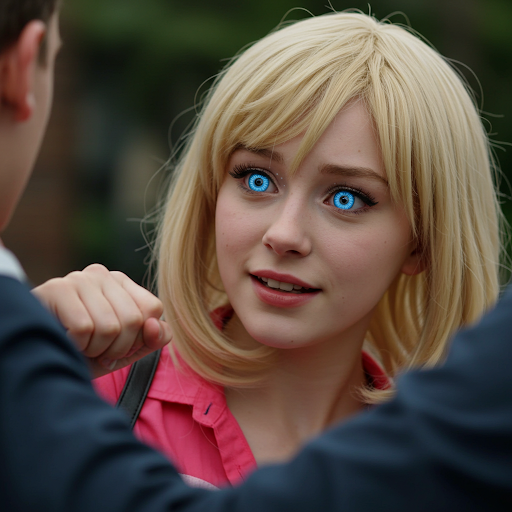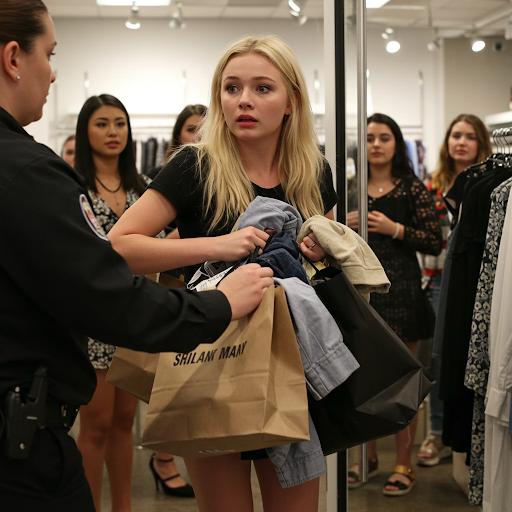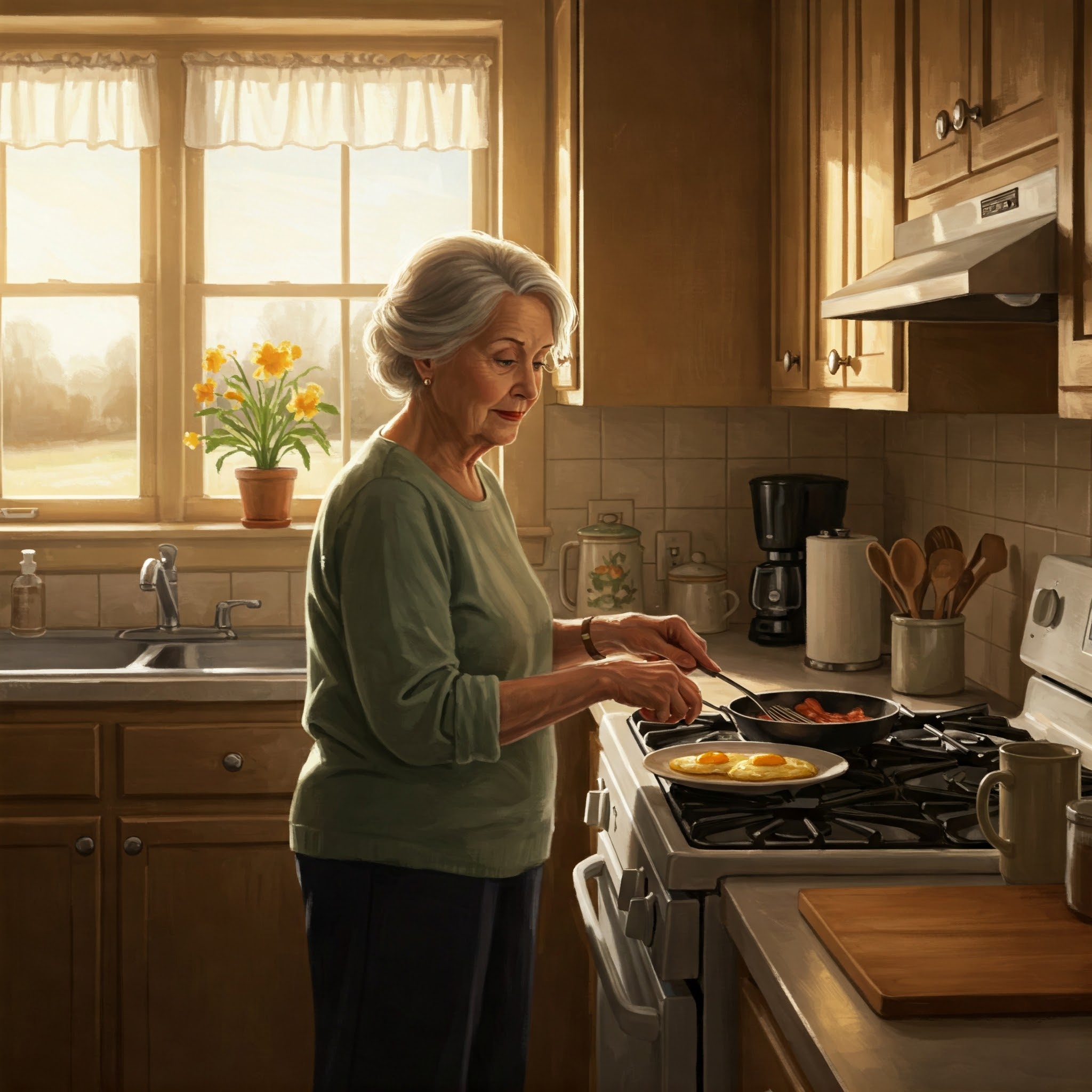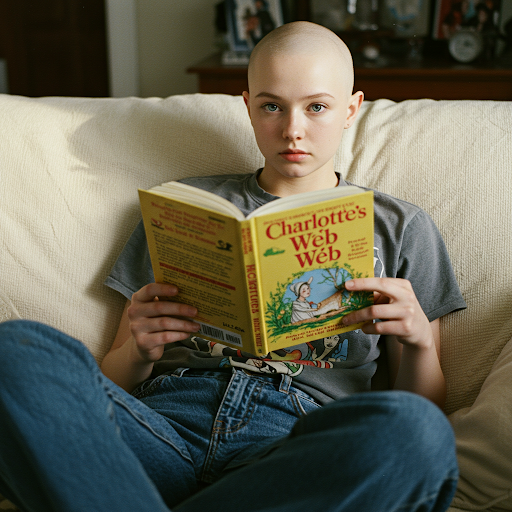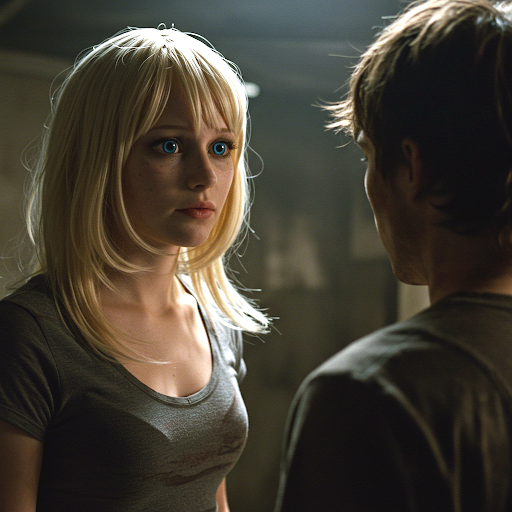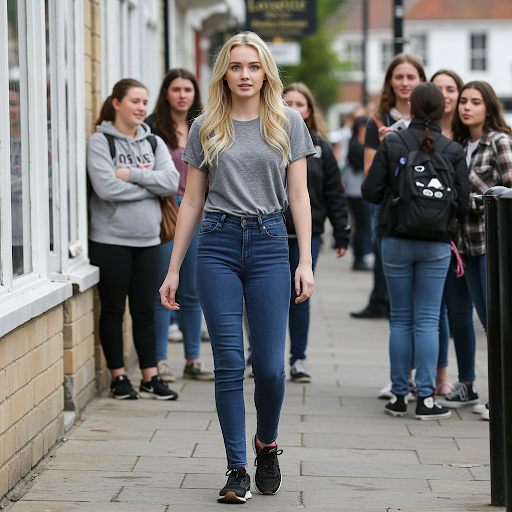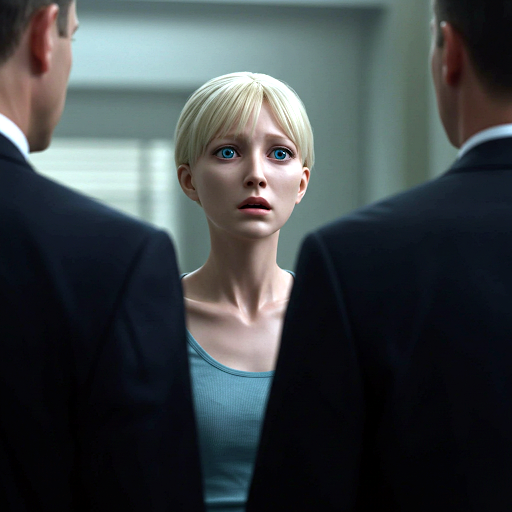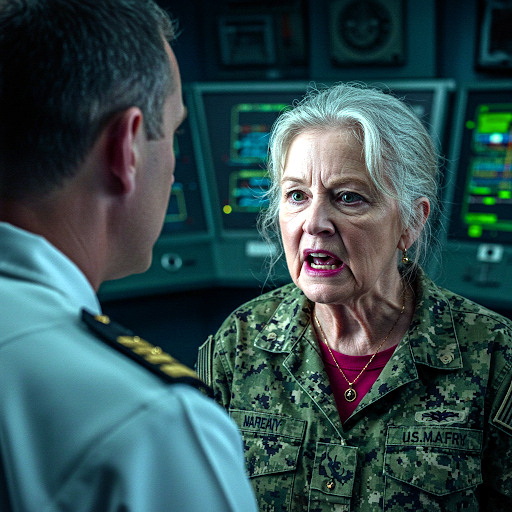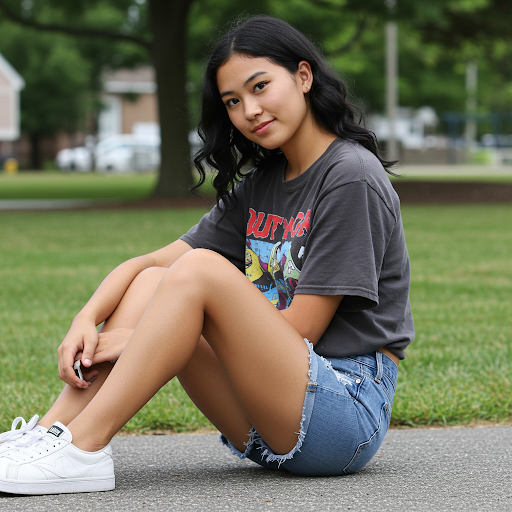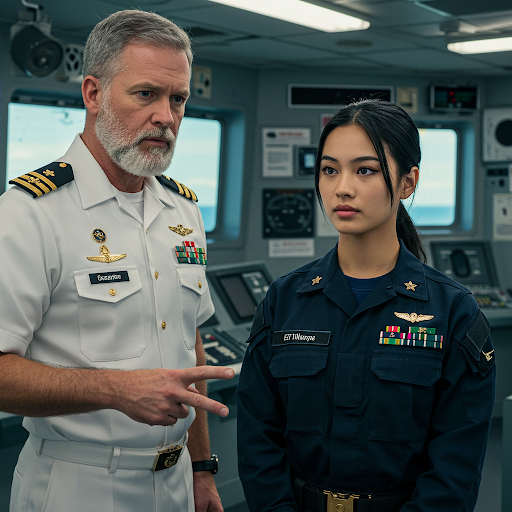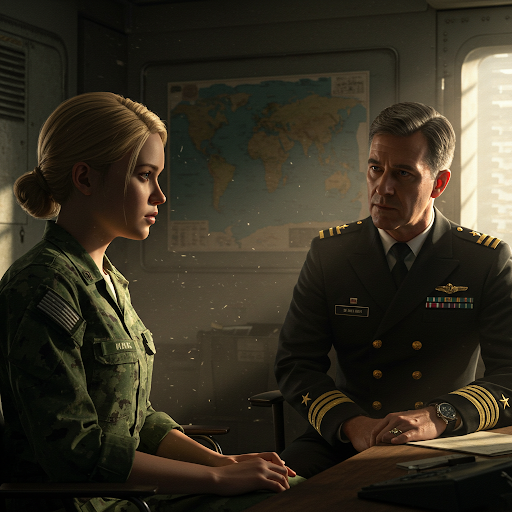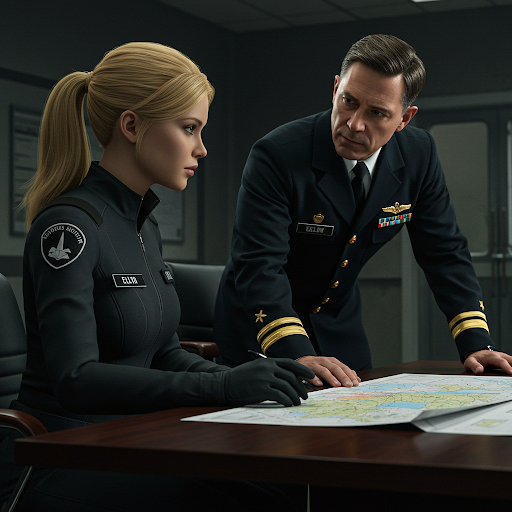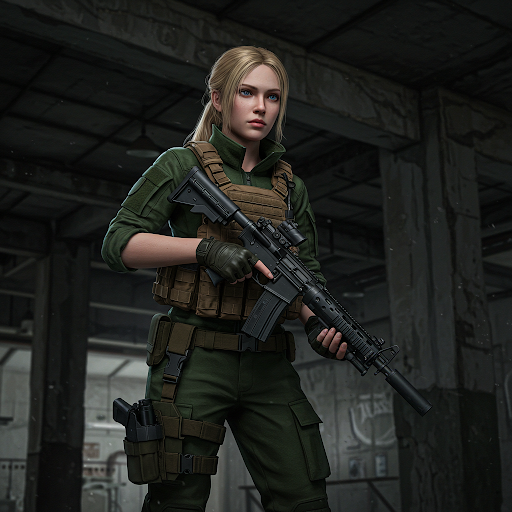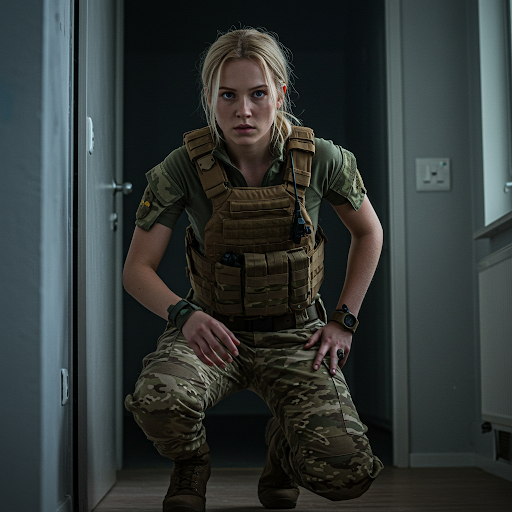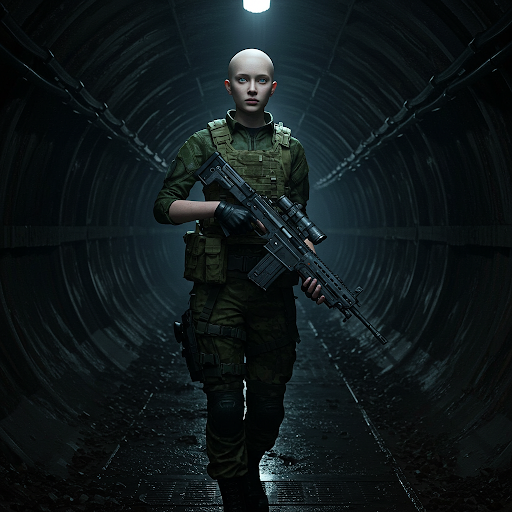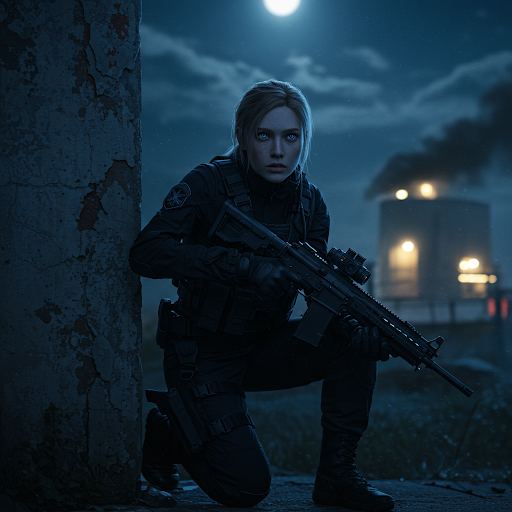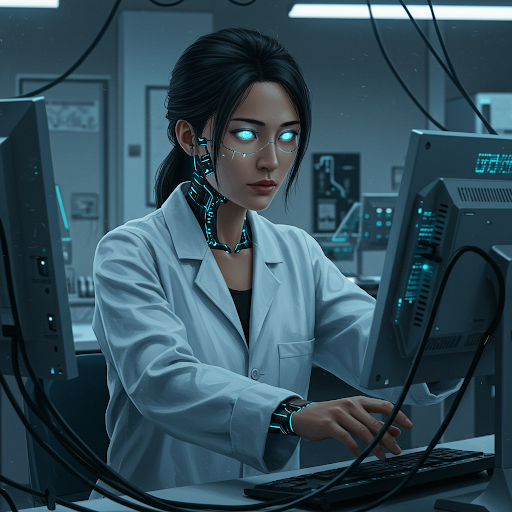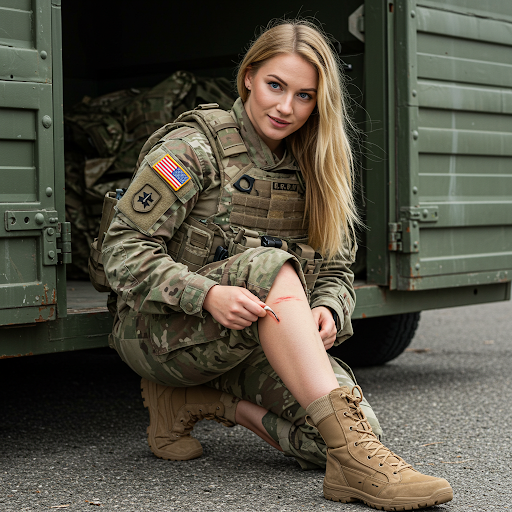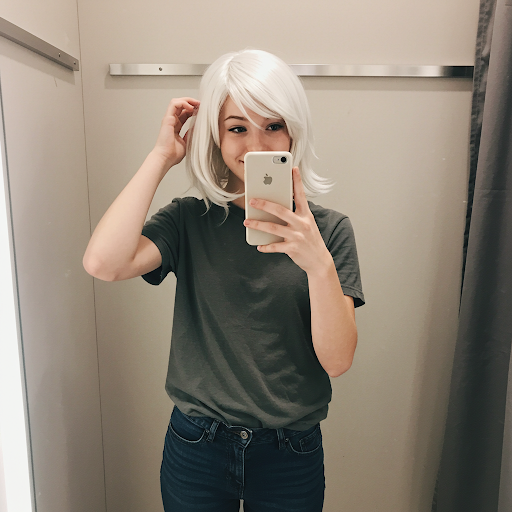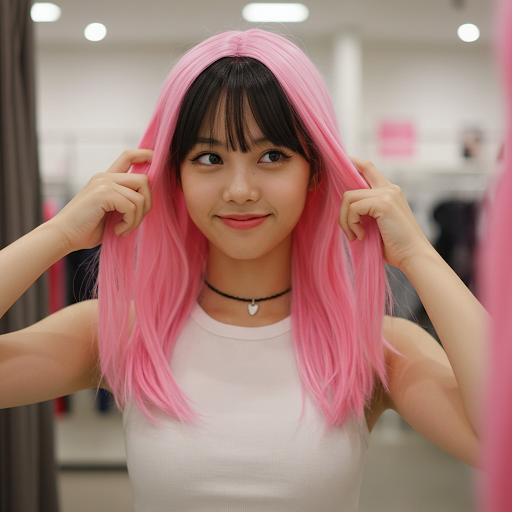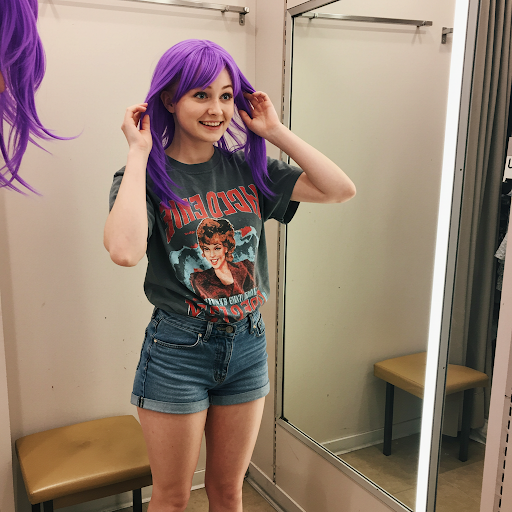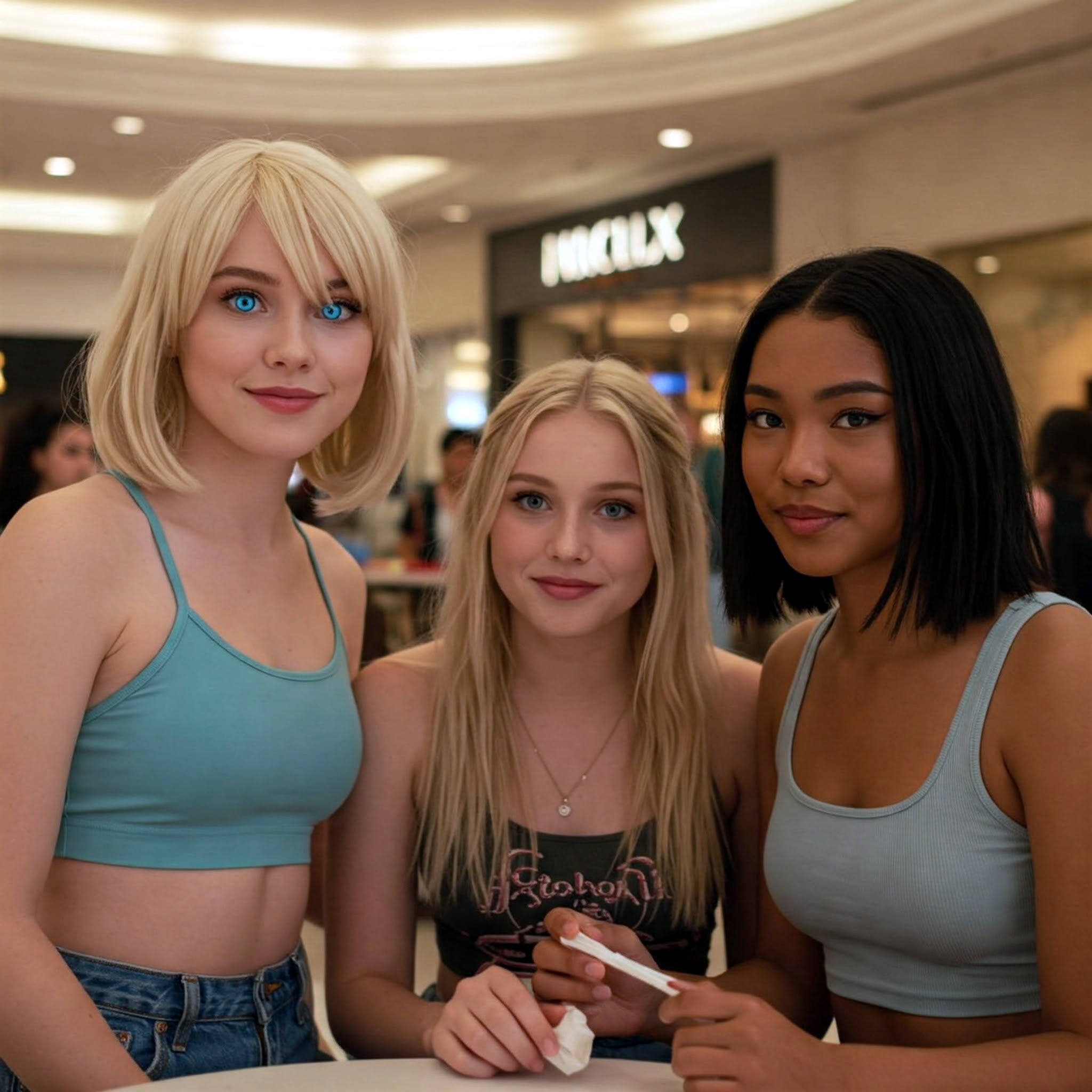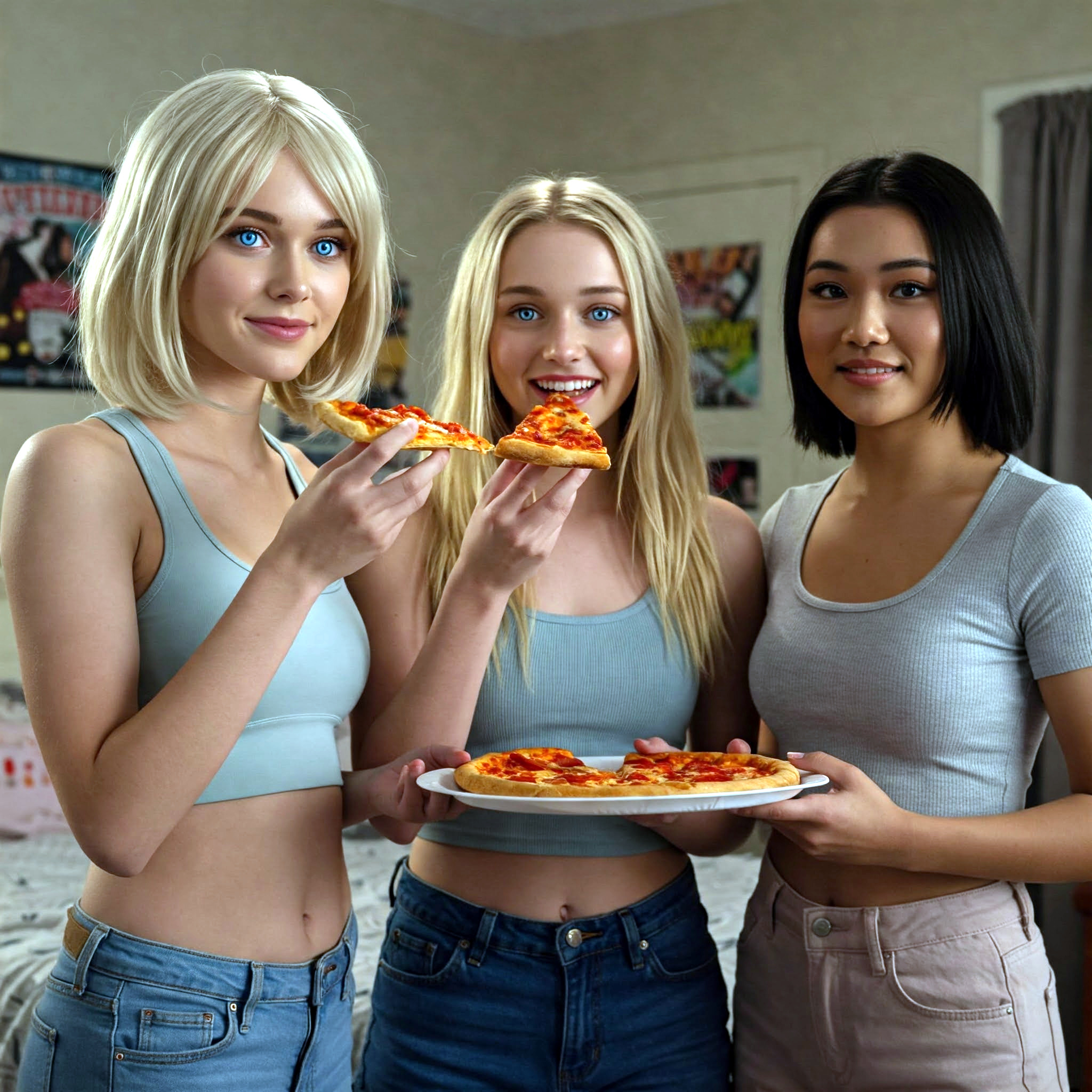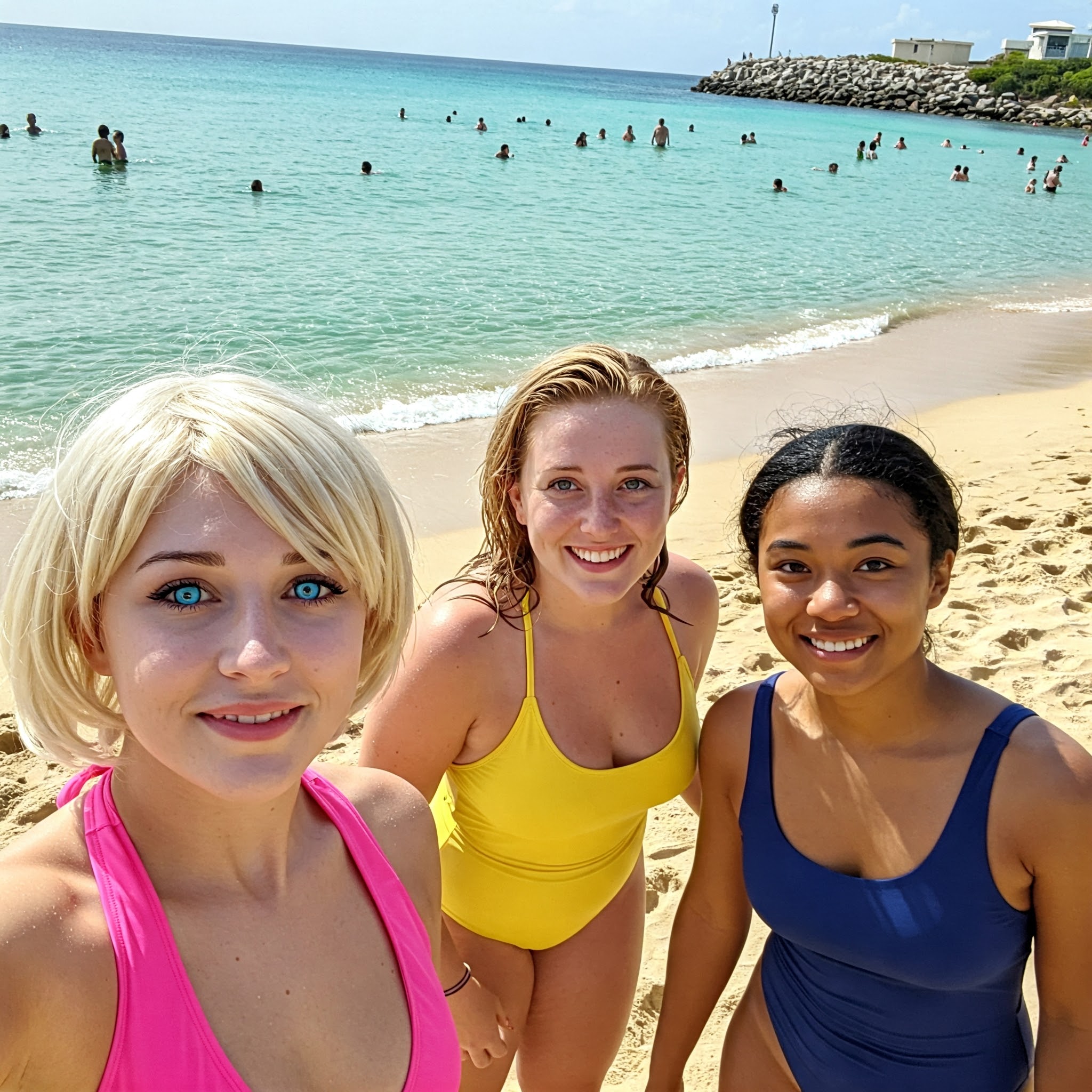Charlotte | Abandoned on Planet Earth.
Table of Contents
Introduction
DISCLAIMER: The AI processors used are effective at generating images but struggle with maintaining consistency across a narrative. For instance, two images of the same character, meant to depict moments just minutes apart, might show her wearing a shirt in one and a dress in the other. While detailed reference tables can help manage this issue, they were not used in this experiment.
This is a part of a 3 part experiment, creating the same novella in ChatGpt (OpenAI), Grok (xAI) and Gemeni (Google). This is the Grok version.
The ChatGPT version will not be published. When writing science fiction fantasy, such as Star Trek which presents a fantastical future that still remains comprehensible and potentially plausible, maintaining a degree of believability is important. The ChatGPT-generated version of this novella became so unrealistic that it was no longer even remotely believable, making the effort of formatting it for publication unwarranted.
The Grok version effectively maintained believability throughout the narrative. It also excelled at providing a variety of useful prompt suggestions. Some of Grok's prompts were superior to my own, contributing to a smooth and readable flow. However, Grok's image generation was less successful; despite the use of reference tables and images, it struggled to maintain consistency across visuals.
The Gemini version performed similarly to Grok in developing the narrative in an engaging manner. However, Gemini offered few helpful prompt suggestions, requiring the author to completely direct the story's progression. While this can be beneficial, AI can also independently generate compelling content. Gemini excels at creating images with consistent details, ensuring characters are recognizable across scenes with the same hair and eye color, for example. In contrast, some other versions fail to maintain character consistency between scenes, even when reference tables and images are provided.
This publication is the Grok version, but with the images created by Gemini.
This is the Gemini version.
Scene 1Witnessing a shopkeeper harshly eject a teenage girl for suspected shoplifting, Margaret intervenes, offering the girl food and shelter, which is met with initial defiance before the girl reluctantly accepts.
Margaret is in town to get some groceries and hears screaming. An overweight shop keeper drags a teenage girl from her store and tosses her onto the sidewalk. The shop keeper yells “You damn teenagers, stay out of my shop, go steal your food someplace else. I’m calling the police if I ever see you around here again.”
Charlotte picks herself up and then huddles in a corner, crying. Filled with compassion Margaret approaches the girl and speaks to her. “Stealing food? You must be hungry. Are you homeless sweetheart? I have plenty of food at my house. Come with me I’ll get you fed.” Charlotte responds “Eff Off grandma. I can take care of myself.” Margaret responds. “Yeah, I can see how you’re taking care of yourself. You’re just like my girls. Now if you want to eat get you butt off the ground and come with me. And don’t think cussing at me is going to do you any good. I’ve seen it all.”
That’s how the story begins. Lets see how it plays out.
Scene 2Margaret offers a ride and a meal to Charlotte, leading to a tense but revealing exchange about Charlotte's circumstances and a tentative offer of shelter for the night.
Margaret turns away from Charlotte, her hands gripping the handles of her reusable grocery bags a little tighter. She takes a few steps toward her beat-up old hatchback parked down the street, half-expecting the girl to stay huddled in her corner, stubborn and prideful. But then she hears it—the shuffle of sneakers on concrete. Charlotte’s voice, sharp but wavering, cuts through the hum of the small-town street.
“Fine. But don’t expect me to, like, owe you or anything.”
Margaret doesn’t turn around, but a faint smile tugs at her lips. Just like my girls, she thinks. She unlocks the car and pops the trunk, loading her groceries without a word. Charlotte lingers a few feet away, arms crossed, her oversized hoodie swallowing her thin frame. Her dark hair is tangled, and there’s a smudge of dirt—or maybe a bruise—on her cheek. Margaret doesn’t ask. Not yet.
“Get in,” Margaret says, sliding into the driver’s seat. Charlotte hesitates, then yanks open the passenger door and slumps inside, staring out the window like she’s plotting her escape.
The drive to Margaret’s cottage is quiet, save for the low rumble of the engine and the occasional creak of the suspension on the uneven country road. The town fades into rolling hills, dotted with wildflowers and the skeletons of old barns. Margaret glances at Charlotte, who’s chewing on a jagged fingernail, her knee bouncing restlessly.
“You got a name?” Margaret finally asks.
Charlotte doesn’t look at her. “Yeah. Charlotte.”
“Like the spider?”
Charlotte’s head snaps toward her, eyes narrowing. “What?”
“The book. Charlotte’s Web. Sweet little story about a pig and a spider who saves him.”
Charlotte snorts, but there’s a flicker of something—surprise, maybe—in her expression. “Never heard of it.”
Margaret shrugs. “Well, you picked a good name anyway.”
The cottage comes into view, a squat little thing with peeling white paint and a sagging porch. Roses climb the trellis out front, wild and overgrown, a remnant of the days when Margaret had the energy to tend them. She parks the car and gets out, motioning for Charlotte to follow.
Inside, the house smells faintly of lavender and old wood. The furniture is mismatched—worn armchairs, a quilt-draped sofa, a coffee table littered with faded photos of four girls at various ages, grinning or scowling at the camera. Margaret sets her bags on the kitchen counter and starts unpacking: bread, a block of cheddar, a jar of pickles, a tin of cookies she’d grabbed on impulse.
Charlotte hovers in the doorway, eyeing the space like a feral cat deciding whether to bolt. Margaret doesn’t push her. She pulls out a frying pan, lights the stove, and starts slicing bread and cheese.
“Grilled cheese okay?” she asks over her shoulder.
Charlotte shrugs, but her stomach growls loud enough to betray her. Margaret smirks and keeps cooking. Soon, the kitchen fills with the smell of melting butter and toasting bread. She slides a plate across the counter toward Charlotte, who finally steps forward, snatching it like someone might take it away.
They eat in silence at first, Charlotte wolfing down the sandwich while Margaret picks at hers, watching the girl out of the corner of her eye. She’s seen this before—the bravado masking hunger, fear, exhaustion. Her girls had that look too, back in the worst days.
“So,” Margaret says, wiping her hands on a napkin. “You gonna tell me why you were stealing from Hattie’s store?”
Charlotte freezes mid-bite, then sets the sandwich down. “I wasn’t stealing. I was just… looking.”
“With a candy bar in your pocket?”
Charlotte glares at her. “What are you, a cop?”
“Nope. Just an old lady who knows a lie when she hears one.” Margaret leans back in her chair, crossing her arms. “Look, I’m not here to judge you. Lord knows I’ve seen worse than a kid swiping a Snickers. But you’re not eating like someone who’s got a plan. Where’re your folks?”
Charlotte’s jaw tightens, and for a moment, Margaret thinks she’s going to bolt. But then the girl mutters, “They’re gone.”
“Gone where?”
“Just… gone. Left me here.” Her voice cracks, and she looks away, blinking hard.
Margaret nods slowly, piecing it together—or at least the parts Charlotte’s willing to give. “Well, you’re here now. You can stay the night if you want. Couch is lumpy, but it’s clean.”
Charlotte doesn’t respond, but she doesn’t leave either. She finishes the sandwich, and when Margaret offers her a glass of milk and a cookie, she takes them without a word. For the first time all day, Margaret feels a spark of something familiar—purpose, maybe. Or hope.
Scene 3Margaret wakes Charlotte, confronts her about stolen items, and sets down ground rules for staying in her home, offering a chance for a new start.
The morning sun filters through the thin curtains of Margaret’s cottage, casting soft golden stripes across the living room. Charlotte is still sprawled on the lumpy couch, one arm flung over her face, the quilt Margaret draped over her last night tangled around her legs. The girl looks smaller in sleep, less guarded, her sharp edges softened by the quiet rhythm of her breathing.
Margaret’s already up, moving around the kitchen with the practiced ease of someone who’s spent decades starting the day before anyone else. The scent of brewing coffee mingles with the faint lavender of the house. She’s dug through an old cedar chest in the spare room—once her daughters’ room—and found a pile of clothes that might fit Charlotte: a pair of faded jeans from her youngest’s grunge phase, a soft flannel shirt her eldest used to wear ironically, and a pair of socks with little daisies on them, still folded from years ago. She sets them on the arm of the couch, then nudges Charlotte’s shoulder.
“Rise and shine, spider girl,” Margaret says, her voice firm but not unkind. “Day’s wasting.”
Charlotte groans, peeling her arm away from her face to squint up at Margaret. “What time is it?”
“Time for you to get your butt off my couch and into some clean clothes. Those are for you.” Margaret nods at the pile. “Bathroom’s down the hall. Go wash up—I can smell you from here.”
Charlotte scowls but sits up, rubbing her eyes. She grabs the clothes and shuffles off, muttering something under her breath that Margaret doesn’t catch but can probably guess. While Charlotte’s gone, Margaret starts tidying up, folding the quilt and fluffing the couch cushions. That’s when she notices it—a small, lumpy bag tucked halfway under the couch, barely visible unless you’re looking for it.
Margaret bends down, her knees creaking, and pulls it out. It’s a ratty canvas pouch, the kind kids use to carry pencils or loose change. She unzips it and peers inside: a candy bar, a cheap keychain with a plastic unicorn, a tube of lip balm, and a crumpled five-dollar bill. Stuff from Hattie’s store, no doubt—things Charlotte must’ve shoved in there before getting caught.
The bathroom door creaks open, and Charlotte steps out, looking marginally more human in the borrowed clothes. The jeans are a little loose, but the flannel fits her well, hanging off her shoulders in a way that makes her look both tough and fragile. She freezes when she sees Margaret holding the bag.
“What the hell are you doing?” Charlotte snaps, lunging forward to snatch it.
Margaret pulls it out of reach, standing up straighter despite the twinge in her back. She holds the bag in one hand and wags a finger at Charlotte with the other. “Don’t try that shit in my house, young lady. I’m old, but I can still find a belt and whip your skinny little butt if I have to.”
Charlotte’s eyes widen, then narrow into a glare. “You can’t touch me. I’ll—”
“You’ll what? Run off again? Steal from someone else who won’t be as nice about it?” Margaret tosses the bag onto the coffee table, where it lands with a soft thud. “Sit down. We’re gonna talk.”
Charlotte hesitates, her fists clenched at her sides, but something in Margaret’s tone—steady, unflinching—makes her comply. She flops onto the couch, crossing her arms and staring at the floor.
Margaret sits in the armchair across from her, leaning forward with her elbows on her knees. “Look, I get it. You’re mad, you’re scared, you’re on your own. I’ve seen that look before—hell, I raised four girls who wore it like a second skin. But this?” She nods at the bag. “This isn’t how you survive. It’s how you get yourself locked up or worse.”
Charlotte doesn’t respond, but her jaw tightens, and her knee starts bouncing again.
“Where’d you learn this, anyway?” Margaret asks. “Your folks didn’t teach you to steal, did they?”
“My folks didn’t teach me anything,” Charlotte mutters. “They just told me what to do all the time. Don’t do this, don’t say that, be perfect or else. I hated it.”
Margaret nods, filing that away. “So you ran. And now you’re here, swiping candy bars and sleeping on the street. That working out for you?”
Charlotte’s head jerks up, her eyes flashing. “What do you care? You don’t even know me.”
“I know enough,” Margaret says. “I know you’re hungry for more than food. I know you’re stubborn as hell—takes one to know one. And I know you’re not as tough as you want me to think you are.”
Charlotte looks away, blinking fast, and Margaret softens her tone. “Listen, I’m not your mom, and I’m not your jailer. You can walk out that door right now if you want. But if you stay, you play by my rules. No stealing, no lying, no cussing me out just ‘cause you’re in a mood. Deal?”
For a long moment, Charlotte doesn’t move. Then, slowly, she nods—just a tiny dip of her chin, but it’s enough.
“Good,” Margaret says, standing up. “Now come help me make breakfast. You ever cooked bacon before?”
Charlotte shakes her head, still sulky but curious despite herself.
“Well, you’re about to learn.” Margaret heads for the kitchen, glancing back with a smirk. “And don’t even think about pocketing the bacon grease. I’ll know.”
Scene 4
As Margaret oversees Charlotte's awkward attempt at cooking breakfast, she begins to gently interrogate the girl about her life on the streets, uncovering details about drugs, boys, and trouble with the law.
The kitchen fills with the sizzle and pop of bacon frying in the cast-iron skillet. Margaret stands at the stove, flipping strips with a pair of tongs, while Charlotte hovers nearby, awkwardly holding a spatula Margaret handed her for the eggs. The girl’s movements are jerky, uncertain—she’s clearly never done this before—but she’s trying, which Margaret takes as a small victory.
“Alright,” Margaret says, sliding the bacon onto a plate lined with paper towels. “You’re on egg duty. Crack ‘em into the bowl there, whisk ‘em up, then pour ‘em in the pan. Think you can handle that?”
Charlotte nods, grabbing an egg with a little too much force. It cracks messily in her hand, yolk dripping onto the counter. She curses under her breath, and Margaret shoots her a look.
“Language,” she says, but there’s no real heat in it. “You’ll get the hang of it. Took my girls years to stop making a mess.”
Charlotte wipes her hand on the flannel shirt and tries again, more carefully this time. As she works, Margaret leans against the counter, arms crossed, watching her. The girl’s guard is still up, but the act of cooking—simple, mundane—seems to loosen something in her. Margaret decides it’s as good a time as any to dig a little deeper.
“So,” she starts, keeping her tone casual, “you been out there on your own a while, huh? Running with the wild ones?”
Charlotte glances at her, wary, but nods. “Yeah. A couple years.”
“Mm-hmm. And what’d that look like? Boys? Drugs? Trouble with the law?”
Charlotte’s hand pauses mid-whisk, and she shoots Margaret a sideways glare. “What are you, my shrink now?”
“Nope. Just an old lady who’s seen too much to beat around the bush. Answer the question.”
Charlotte huffs, turning back to the eggs. “Yeah, there were boys. And… yeah, some drugs. Nothing crazy.”
Margaret raises an eyebrow. “Nothing crazy, huh? What’s that mean? Pot? Pills? Something harder?”
Charlotte shrugs, pouring the eggs into the pan with a little more force than necessary. They hiss as they hit the hot surface. “Pot, mostly. Some pills once or twice. I didn’t, like, shoot up or anything.”
Margaret nods, filing that away. “Good to know. You clean now?”
“Mostly,” Charlotte mutters, stirring the eggs with the spatula. “Haven’t had anything in a while. Too broke.”
“Fair enough. And the boys—you careful with ‘em? Safe sex and all that?”
Charlotte’s face flushes red, and she nearly drops the spatula. “God, do you have to ask that?”
“Yep,” Margaret says, unperturbed. “I had four girls, remember? One of ‘em got pregnant at sixteen ‘cause she didn’t think it’d happen to her. I’m not burying another kid, so humor me.”
Charlotte stares at the eggs like they might save her from the conversation. “Yeah, I was careful. Mostly. I’m not stupid.”
“Mm-hmm. Mostly’s not the same as always, but we’ll work on that.” Margaret grabs a couple of plates from the cupboard and sets them on the counter. “What about the law? You got warrants out? Done time?”
Charlotte stiffens, her shoulders hunching. “No warrants. Not that I know of. And no, I haven’t been to jail. Got picked up once, but they let me go ‘cause I was a kid.”
“What’d they pick you up for?”
“Shoplifting,” Charlotte admits, her voice barely above a whisper. “Same as yesterday. Just… food and stuff.”
Margaret nods, not surprised. “Alright. No jail, no warrants—that’s a start. You ever hurt anybody? Fights? Anything like that?”
Charlotte shakes her head quickly. “No. I mean, I’ve yelled at people. Pushed a guy once when he wouldn’t leave me alone. But nothing serious.”
“Good,” Margaret says, taking the spatula from Charlotte’s hand to finish scrambling the eggs herself. “You’re not too far gone, then. My girls got into worse—fights, cops, one of ‘em even boosted a car once. Took years to pull ‘em back from that edge.”
Charlotte watches her, something flickering in her eyes—curiosity, maybe, or relief. “And you… you fixed them?”
Margaret snorts, scooping eggs onto the plates. “Fixed? Nah. They fixed themselves, mostly. I just kept ‘em fed and gave ‘em a place to crash when they were ready to stop running. Sometimes that’s all you can do.”
She hands Charlotte a plate piled with eggs and bacon, then nods at the table. “Sit. Eat. And don’t think I’m done asking questions. I’ve got plenty more where those came from.”
Charlotte takes the plate, a faint smirk tugging at her lips despite herself. “Great. Can’t wait.”
They sit across from each other, the clink of forks against plates filling the silence. Margaret watches Charlotte dig in, her appetite a stark contrast to the guarded girl from yesterday. She’s still a mess—tangled hair, sharp edges, a past she’s barely scratched the surface of—but there’s something there, something Margaret recognizes. A spark. A rebel worth saving.
Scene 5
Having finished breakfast and sensing Charlotte's shift in mood, Margaret gently probes into the deeper reasons behind Charlotte's homelessness and past troubles.
The plates are nearly empty, just a few scraps of egg and bacon grease left. Margaret sips her coffee, black and strong, watching Charlotte over the rim of her mug. The girl’s slowed down, picking at the last bit of food with her fork, her earlier bravado replaced by a quieter, almost pensive mood. The kitchen hums with the soft ticking of a wall clock and the occasional chirp of birds outside. Margaret sets her mug down, leaning forward slightly.
“Alright, Charlotte,” she says, her voice steady but gentle. “You’ve told me about the boys, the drugs, the shoplifting. But I’m still wondering—how’d a girl like you end up out there, hungry and sleeping on the street? What’s your story?”
Charlotte’s fork pauses mid-air, and for a moment, she looks like she might bolt again. But then she sighs, dropping the fork onto her plate with a soft clink. She leans back in her chair, crossing her arms, her eyes fixed on the table like it holds the answers she’s not sure she wants to give.
“It’s… complicated,” she starts, her voice low. “I wasn’t always like this, you know. I had a home. Sort of.”
Margaret nods, staying quiet, giving her space to keep going.
Charlotte picks at a loose thread on the flannel shirt, her fingers restless. “My parents… they weren’t from here. They came to… to help people, or whatever. They were all about rules, structure, doing things the ‘right’ way. I hated it. Everything was so boring, so controlled. I couldn’t breathe.”
“Where were you living?” Margaret asks, keeping her tone neutral. “Sounds like they kept you on a tight leash.”
Charlotte hesitates, her eyes flicking up to Margaret’s face, then back down. “It’s… not important where. Just far away. A place where kids like me didn’t get to do anything fun. No parties, no sneaking out, no… nothing. If you stepped out of line, they’d send you to these schools—reform places, you know? Like prison for kids. I saw friends get shipped off, come back all… different. Empty.”
Margaret’s eyebrows lift slightly, but she doesn’t interrupt. There’s something odd in Charlotte’s phrasing—“not from here,” “far away”—but she files it away for later. For now, she just listens.
“So I ran,” Charlotte continues, her voice picking up speed, like a dam breaking. “I was fifteen, and I just… I couldn’t take it anymore. I heard stories about this place—about Earth—how kids could do whatever they wanted, how it was all freedom and excitement. I thought it’d be like the movies, you know? Running wild, no one telling you what to do. So I stowed away, got here, and at first, it was awesome. I found other kids, runaways, and we’d crash in empty buildings, pool our cash for food, laugh all night. It felt like I was finally alive.”
She pauses, her face darkening. “But then it got… bad. The older kids, they weren’t so nice. They’d take your stuff, make you do things to stay in the group. Guys would act like they cared, but they just wanted… you know. And the streets aren’t like the movies. It’s cold, it’s dirty, you’re always looking over your shoulder. I tried to keep up, but I didn’t know how to survive here. Not really.”
Margaret’s chest tightens, her mind flashing to her own girls—nights spent waiting up, wondering if they’d come home bruised or worse. “Sounds like you got in over your head,” she says softly.
Charlotte nods, her voice dropping to a near-whisper. “Yeah. And then my parents… they left. They went back home—back to our… place. I thought they’d come looking for me, but they didn’t. They just gave up. Said I was too much trouble, that I’d made my choice. So I was stuck here, alone, with no way back and no one to call.”
Margaret frowns, catching the strange undercurrent again. “Back home? You mean, like, another country? And they just left you here?”
Charlotte freezes, her eyes widening like she’s said too much. She bites her lip, then rushes on, her words tumbling out faster. “Yeah, another… country, sure. Far away. Really far. Like, you wouldn’t believe how far. And they didn’t want me anymore, okay? They had their mission, their big important work, and I was just a screw-up who didn’t fit in. So I’ve been bouncing around ever since, trying to figure it out, but it’s hard, and I’m tired, and I didn’t mean to steal from that lady’s store, I was just so hungry, and—”
“Whoa, whoa, slow down,” Margaret cuts in, raising a hand. “Breathe, kid. You’re gonna hyperventilate.”
Charlotte clamps her mouth shut, her chest heaving. Her eyes are glassy, and she blinks rapidly, like she’s fighting tears. Margaret leans back, giving her a moment to collect herself, but her mind’s racing. The girl’s story doesn’t add up—not completely. Another country? A mission? Stowing away to Earth? It sounds like teenage exaggeration, or maybe something more… unusual. But the pain in Charlotte’s voice, the raw edge of abandonment—that’s real. Margaret knows it too well.
“Alright,” Margaret says after a pause, her tone softer now. “Sounds like you’ve been through hell, and then some. I’m not gonna pretend I understand all of it—your parents sound like a piece of work, leaving you like that. But you’re here now, and you’re not starving in my house. That’s something, right?”
Charlotte nods, barely, her fingers twisting the hem of the flannel. “Yeah. I guess.”
Margaret reaches across the table, hesitating a moment before resting a hand on Charlotte’s arm. “You don’t have to tell me everything all at once. I’m nosy, but I’m patient. Just… no more secrets about stealing, okay? We’re past that.”
Charlotte looks at her hand, then up at Margaret’s face, searching for something—judgment, maybe, or pity. She doesn’t seem to find it. “Okay,” she says finally, her voice small but steady.
“Good.” Margaret pulls her hand back and stands, grabbing the empty plates. “Now help me clean up. You’re not a guest—you’re a roommate. Roommates do dishes.”
Charlotte groans but gets up, following her to the sink. As they stand side by side, scrubbing plates in the warm, soapy water, Margaret feels that spark again—that sense of purpose she hasn’t felt in years. This girl’s a puzzle, and maybe a little broken, but so were her daughters. And she didn’t give up on them.
Scene 6Margaret initiates a plan to help Charlotte establish a new identity and get a medical check-up, leading them to a shady tattoo artist for fake documents and a perplexed doctor who notes unusual physical characteristics about Charlotte.
The dishes are done, stacked neatly in the drying rack, and the kitchen is back to its cozy, slightly cluttered state. Margaret wipes her hands on a dish towel, glancing at Charlotte, who’s lingering by the sink, looking a little more at ease but still restless. The morning has been heavy with revelations, and Margaret knows they’ve only scratched the surface of Charlotte’s story. But there’s work to be done—practical steps to get this girl on a better path.
“Alright, kid,” Margaret says, tossing the towel onto the counter. “I’ve got some errands to run, and you’re coming with me. Go grab your shoes—or whatever you’ve got for shoes. We’re heading out.”
Charlotte frowns, her arms crossing instinctively. “Where are we going?”
“You’ll see. Just move it.” Margaret’s tone leaves no room for argument, and Charlotte, after a moment of hesitation, shuffles off to find her worn sneakers by the couch.
Margaret heads to her bedroom, pulling on a faded denim jacket over her sweater and slipping into a pair of sturdy boots. She catches a glimpse of herself in the mirror—gray hair pulled back in a loose bun, lines etched deep into her face from years of worry and laughter. She looks every bit the 70-year-old widow she is, but there’s a fire in her eyes today, a determination she hasn’t felt in a while. Helping Charlotte feels like a second chance, a way to make up for the one daughter she couldn’t save.
When she steps back into the living room, Charlotte’s waiting by the door, her sneakers on but untied, her expression a mix of curiosity and suspicion. “You gonna tell me where we’re going now?” she asks.
“First stop’s an old friend,” Margaret says, grabbing her keys. “Well, ‘friend’ might be generous. Let’s just say he owes me a favor.”
The drive takes them out of the countryside and into a rougher part of town, where the houses are closer together, the lawns unkempt, and the air smells faintly of exhaust. Margaret pulls up in front of a squat, brick building with a neon sign flickering “TATTOO” in the window. The shop looks like it’s seen better days—graffiti tags the side wall, and a couple of motorcycles are parked out front.
Charlotte eyes the place warily as they get out of the car. “This doesn’t look like a grocery store.”
“It’s not,” Margaret says, locking the car. “Stay close, and don’t touch anything.”
Inside, the shop smells of ink and cigarette smoke. A burly man with a shaved head and a neck covered in tattoos looks up from behind the counter, a smirk spreading across his face when he sees Margaret. “Well, damn, if it isn’t Maggie. Been a while.”
“Too long, Ray,” Margaret says, her tone clipped but not unfriendly. “You still in the business of fixing problems?”
Ray chuckles, leaning back in his chair. “Depends on the problem. What’s the old lady need this time?”
Margaret nods toward Charlotte, who’s hovering near the door, looking like she’d rather be anywhere else. “Her. She needs papers—ID, birth certificate, high school transcripts, the works. Clean, legit-looking, and fast.”
Ray’s eyes slide to Charlotte, taking her in with a slow, appraising look that makes her shift uncomfortably. “She don’t look like one of yours, Maggie. What’s the story?”
“Doesn’t matter,” Margaret says sharply. “You owe me for getting your ass out of that mess with my daughter’s car ten years ago. I’m calling in the favor.”
Ray holds up his hands in mock surrender. “Alright, alright. I’ll get it done. Gonna need a name, birthdate, and a photo.” He pulls a Polaroid camera from under the counter and gestures for Charlotte to step forward. “Smile, kid. Or don’t. Your call.”
Charlotte glances at Margaret, who gives her a reassuring nod. She steps up, her expression a mix of defiance and unease, and Ray snaps the photo. Margaret gives him the details—Charlotte’s name, a made-up birthdate that makes her 18, and a vague backstory about a small-town high school. Ray scribbles it down, then tucks the photo into a drawer.
“Give me a couple days,” he says. “I’ll have it ready. You know my price.”
“Cash, like always,” Margaret says. “I’ll bring it when I pick up the papers.”
Ray grins, showing a gold tooth. “Pleasure doing business, Maggie.”
Margaret doesn’t respond, just turns and motions for Charlotte to follow her out. Back in the car, Charlotte slumps in the passenger seat, her arms crossed. “That guy’s a creep,” she mutters.
“He’s a criminal,” Margaret corrects, starting the engine. “But he’s useful. Those papers will get you a fresh start—school, a job, whatever you want. You can’t keep living like a ghost.”
Charlotte doesn’t say anything, but there’s a flicker of gratitude in her eyes.
Their next stop is a small medical clinic on the edge of town, a single-story building with a faded sign that reads “Dr. Ellis Family Practice.” Margaret leads Charlotte inside, where the waiting room smells of antiseptic and old magazines. A receptionist with a tight smile checks them in, and after a short wait, they’re ushered into an exam room.
Dr. Ellis, a wiry man in his late 50s with wire-rimmed glasses and a perpetually furrowed brow, greets Margaret with a nod. “Margaret, good to see you. This the girl you called about?”
“Yep,” Margaret says, nudging Charlotte forward. “Charlotte. She’s been on her own a while. I need you to check her over—make sure she’s not pregnant, no infections, nothing serious. Full workup.”
Dr. Ellis gestures for Charlotte to sit on the exam table. “Alright, Charlotte. Let’s get started. Any complaints? Pain, fatigue, anything unusual?”
Charlotte shakes her head, her voice quiet. “No. I’m fine.”
The exam begins with the basics—height, weight, blood pressure. But as Dr. Ellis moves through the process, his brow furrows deeper. He listens to Charlotte’s heart, then pauses, moving the stethoscope to a different spot on her chest. “Huh,” he mutters, more to himself than to them. “That’s… not where I’d expect it.”
Margaret catches the comment and leans forward. “What’s not where you’d expect?”
Dr. Ellis doesn’t answer right away. He moves on to checking Charlotte’s eyes, shining a light into them. “Your pupils are… unusually large,” he says, his tone clinical but curious. “And the shape—almost too perfect. You wear contacts?”
“No,” Charlotte says, her voice tight. She glances at Margaret, a flicker of panic in her expression.
The exam continues, with Dr. Ellis growing more perplexed. He palpates her abdomen, then frowns. “Your organs… they’re not quite where they should be. Liver’s on the left, stomach’s lower than normal. And your voice—there’s an odd lilt to it. Where did you say you’re from?”
“Far away,” Charlotte says quickly, her accent slipping slightly, the strange, melodic undertone more pronounced. “A… small town.”
Dr. Ellis raises an eyebrow but doesn’t press. He draws blood for tests, including a pregnancy test, and finishes the exam with a few more notes. “Well, you’re not pregnant,” he says finally, looking at Margaret. “No obvious infections, either. But her anatomy… it’s unusual. I’d like to run more tests, maybe get a specialist involved.”
“No specialists,” Margaret says firmly, standing up. “She’s fine, right? Healthy?”
“For the most part, yes,” Dr. Ellis says, still looking puzzled. “But—”
“Then we’re done here.” Margaret helps Charlotte off the table, her hand on the girl’s shoulder. “Thanks, Doc. Send me the bill.”
As they leave the clinic, Charlotte’s quiet, her hands shoved deep into the pockets of her borrowed jeans. Margaret can feel the tension radiating off her, but she doesn’t push—not yet. They get into the car, and as Margaret starts the engine, she glances at Charlotte.
“You’ve got some explaining to do, spider girl,” she says, her tone light but pointed. “But it can wait ‘til we’re home. Let’s get some lunch first.”
Charlotte nods, her eyes fixed on the window, but there’s a storm brewing behind them. Margaret knows she’s on the verge of uncovering something big—something that might change everything.
Scene 7As evening falls, a quiet moment of connection forms between Margaret and Charlotte in the cozy living room, where Charlotte seeks comfort and they share a tentative understanding of being lost souls finding solace in each other's presence.
The evening settles over Margaret’s cottage like a soft blanket, the golden light of late afternoon giving way to the dim glow of a single lamp in the living room. The air carries the faint scent of lavender and the lingering warmth of the soup they’d had for dinner—simple chicken noodle, the kind Margaret used to make for her girls when they were sick or sulky. The dishes are done, the kitchen tidied, and now the two of them are in the living room, each in their own little world but sharing the same space.
Margaret is settled in her favorite armchair, a faded plaid thing that creaks when she moves, her feet propped on a mismatched ottoman. The TV is on, tuned to one of her guilty pleasures—a soap opera with over-the-top drama, terrible dialogue, and actors who seem to have only two facial expressions. Tonight’s episode involves a secret twin, a stolen inheritance, and a dramatic hospital Scene
that makes Margaret snort softly to herself. “Stupid,” she mutters under her breath, but her eyes are glued to the screen, hooked on the absurdity of it all.
Across the room, Charlotte is curled up on the couch, a quilt draped over her lap, browsing through a stack of books she’d pulled from Margaret’s bookshelf. The shelf is a hodgepodge of her daughters’ old favorites and Margaret’s own eclectic tastes—everything from Charlotte’s Web to dog-eared romance novels to a few tattered sci-fi paperbacks from the ‘70s. Charlotte’s fingers trace the spine of one of the sci-fi books, her expression unreadable, but there’s a quiet curiosity in the way she flips through the pages, lingering on illustrations of distant planets and strange creatures.
The TV drones on, the soap opera characters shouting at each other about betrayal and love, and Margaret is just about to reach for her mug of chamomile tea when she feels a shift in the room. Charlotte sets the book down, the quilt slipping off her lap as she moves. In a motion so unexpected it catches Margaret off guard, the girl slides off the couch and crosses the small space between them, sitting on the floor beside Margaret’s chair. She pulls her knees up to her chest, then leans her head against Margaret’s arm, a tentative but unmistakable gesture of affection.
Margaret freezes for a moment, her hand hovering over the armrest, unsure how to respond. It’s been years since anyone sought her out like this—her daughters are grown, her husband long gone, and the cottage has been a quiet, solitary place for too long. But then she feels Charlotte’s warmth, the slight tremble in her frame, and something in her chest softens. She lowers her hand, resting it gently on Charlotte’s shoulder, giving her a small, reassuring squeeze.
Charlotte’s voice is soft, almost hesitant, when she speaks. “My parents… the missionaries… they used to say that gods find lost souls that need each other and find a way to bring them together. Do you believe that sort of stuff?”
Margaret’s breath catches, the question hitting her harder than she expects. She looks down at Charlotte, the girl’s large, too-perfect eyes staring up at her, searching for something—comfort, maybe, or an answer to a question she doesn’t even fully understand herself. The TV blares on in the background, but it fades to a distant hum as Margaret considers her response.
“Well,” she says finally, her voice low and thoughtful, “I’m not much for gods or fate or any of that. Never been to church more than a handful of times, and I always figured if there’s a higher power, it’s got better things to do than meddle in my life.” She pauses, her hand still resting on Charlotte’s shoulder, her thumb brushing absently against the flannel. “But… I’ll tell you what I do believe. I believe people find each other when they’re supposed to. Not because of gods or destiny, but because they’re looking for the same thing at the same time. Sometimes it’s love, sometimes it’s trouble, sometimes it’s just… a place to belong.”
Charlotte’s eyes shimmer, and she blinks quickly, like she’s trying to hold back tears. “You think that’s us? Two lost souls?”
Margaret chuckles softly, the sound warm and a little rough around the edges. “Maybe. I’ve been rattling around this house too long, missing my girls, feeling like I don’t have a purpose anymore. And you… you’re a long way from home, aren’t you? Wherever that is. Seems like we both needed someone to shake things up.”
Charlotte nods, a small, shaky smile tugging at her lips. “Yeah. I guess so.” She leans a little closer, her head resting more fully against Margaret’s arm, and for a moment, they sit in silence, the soap opera forgotten. The lamp casts a soft glow over them, and the room feels smaller, warmer, like a little island in the vast, uncertain world outside.
Margaret glances at the book Charlotte had been reading, the sci-fi paperback with a garish cover of a spaceship and a purple planet. “You like that one?” she asks, nodding toward it.
Charlotte follows her gaze, then shrugs. “It’s… interesting. Reminds me of… stuff.”
“Stuff, huh?” Margaret’s tone is light, but there’s a knowing edge to it. “You’re gonna have to tell me about that ‘stuff’ sooner or later, you know. I’m old, but I’m not stupid.”
Charlotte tenses slightly, then relaxes, a small laugh escaping her. “I know. Just… not tonight, okay?”
“Fair enough,” Margaret says, giving her shoulder another gentle squeeze. “Not tonight.”
They lapse back into silence, Charlotte snuggled against her, the TV flickering with its melodramatic nonsense. For the first time in a long while, Margaret doesn’t feel the ache of her empty nest quite so sharply. And for Charlotte, the weight of being abandoned on a strange planet feels just a little lighter.
Scene 8Their growing bond is interrupted by a visit from Dr. Ellis, who reveals anomalous DNA results from Charlotte's bloodwork, prompting Charlotte to confess that she is an alien from a planet called Veyra, a revelation that surprisingly strengthens Margaret's resolve to care for her.
A few days have passed since that quiet evening in the living room, and the bond between Margaret and Charlotte has deepened in small, meaningful ways. They’ve fallen into a rhythm—mornings spent cooking breakfast together, afternoons tending to the overgrown roses out front or flipping through old photo albums of Margaret’s daughters, evenings with the TV on low while Charlotte reads and Margaret knits a lumpy scarf she claims is for Charlotte’s “skinny neck.” There’s laughter now, and teasing, and moments where Margaret catches herself thinking of Charlotte as one of her own—a granddaughter she never had. Charlotte, for her part, seems lighter, less guarded, though there’s still a shadow in her eyes, a secret she’s holding close.
It’s late morning on the fourth day, and they’re in the kitchen again, this time baking cookies. The air smells of vanilla and melting chocolate, and Charlotte is licking dough off her fingers, grinning as Margaret swats at her with a wooden spoon.
“You’ll get salmonella, you little gremlin,” Margaret scolds, but there’s a smile tugging at her lips. “Keep your paws out of the bowl ‘til they’re baked.”
Charlotte sticks out her tongue, then grabs another pinch of dough, dodging Margaret’s half-hearted swipe. “You’re too slow, Grandma,” she teases, the nickname slipping out naturally now.
Margaret snorts, about to retort, when a sharp knock at the door cuts through their laughter. They both freeze, the playful mood evaporating. Margaret wipes her hands on her apron, her brow furrowing. “Who the hell’s that?” she mutters, glancing at the clock. It’s not even noon—too early for the mail, and she’s not expecting anyone.
Charlotte’s eyes widen, a flicker of fear crossing her face. “You think it’s… someone looking for me?”
“Doubt it,” Margaret says, though her tone is cautious. “Stay here. I’ll check.”
She heads to the door, peering through the small window before opening it. Standing on the porch is Dr. Ellis, his wire-rimmed glasses slightly askew, a manila envelope clutched in his hands. He looks nervous, his usual calm demeanor replaced by a jittery energy that sets Margaret on edge.
“Doc,” she says, opening the door wider. “Didn’t expect to see you here. What’s going on?”
Dr. Ellis steps inside without waiting for an invitation, glancing over his shoulder like he’s worried someone might be watching. “Margaret,” he says, his voice low, “I got the DNA results from Charlotte’s bloodwork. I… I thought you should have them.”
Margaret’s stomach tightens. She closes the door behind him, her hand lingering on the knob. “DNA results? I thought you said she was fine.”
“She is, mostly,” Dr. Ellis says, adjusting his glasses. He holds out the envelope, his hand trembling slightly. “But the lab… they found some anomalies. It’s basically human, but there are variations—genetic markers they’ve never seen before. They were concerned, wanted to report it to some research group. I told them I must have contaminated the sample, that it was my mistake. I had them destroy their copies.”
Margaret takes the envelope, her fingers brushing against the paper. “Variations?” she repeats, her mind racing. She glances toward the kitchen, where Charlotte is still standing, watching them with wide, unblinking eyes. Those too-large, too-perfect eyes that Dr. Ellis had noted during the exam.
“Yes,” Dr. Ellis says, lowering his voice even further. “Her DNA is… close to human, but not quite. There are sequences that don’t match anything in our databases. It’s like she’s… I don’t know, a cousin species, maybe. I can’t explain it. But I didn’t want this in my office. If someone starts digging, it could cause trouble—for her, for you, for me. Keep it here. Don’t let anyone else see it.”
Margaret nods slowly, her grip tightening on the envelope. “Alright. Thanks for the heads-up, Doc. I’ll take care of it.”
Dr. Ellis hesitates, then adds, “Margaret… be careful. I don’t know what’s going on with her, but she’s not… typical. If you need anything, you know where to find me.”
“I’ll manage,” Margaret says, her tone firm. She opens the door, a clear signal for him to leave. “You’ve done enough. Go on, now.”
Dr. Ellis gives her a tight nod, then steps back onto the porch, casting one last glance at Charlotte before heading to his car. Margaret closes the door, locking it for good measure, and turns to face Charlotte. The girl hasn’t moved, her hands clenched at her sides, her face pale.
“Charlotte,” Margaret says, her voice steady but laced with a quiet intensity. “We need to talk. Now.”
Charlotte swallows hard, her eyes darting to the envelope in Margaret’s hands. “I… I can explain,” she says, her voice trembling, the strange lilt more pronounced in her panic. “I didn’t mean for this to happen. I just… I didn’t know how to tell you.”
Margaret sets the envelope on the coffee table, then crosses the room to stand in front of Charlotte. She places both hands on the girl’s shoulders, her grip firm but gentle. “I’ve known something’s off since the doctor’s visit,” she says. “The way you talk about ‘home,’ the way you look, the way you act—it’s not adding up. I’ve been patient, but I’m done waiting. You’re gonna tell me the truth, right now. Who are you, really? And where are you from?”
Charlotte’s eyes fill with tears, but she doesn’t pull away. “I’m… I’m not from Earth,” she whispers, the words spilling out like a confession. “I’m from a planet called Veyra. My parents were missionaries, like I said, but they weren’t helping humans—they were studying you, trying to… to guide you, I guess. I ran away because I hated it there, and I thought Earth would be better. But I was wrong, and now I’m stuck here, and I don’t know what to do.”
Margaret stares at her, the words sinking in slowly, like stones dropping into deep water. She should be shocked, maybe even scared, but instead, she feels a strange sense of clarity. It explains everything—the doctor’s confusion, Charlotte’s oddities, the way she talks about being “far away.” And yet, looking into the girl’s tear-streaked face, Margaret doesn’t see an alien. She sees a scared kid who needs her.
“Well,” Margaret says after a long moment, her voice gruff but warm, “that’s a hell of a story, spider girl. But you’re not stuck anymore. You’ve got me now.”
Charlotte blinks, a sob escaping her as she throws her arms around Margaret, clinging to her like a lifeline. Margaret hugs her back, her own eyes stinging, and for the first time in years, she feels like she’s exactly where she’s supposed to be.
Scene 9Their trip into town for supplies is disrupted when a rough young man named Billy, from Charlotte's past, confronts her, revealing she was living with a group in the tunnels and prompting Margaret to fiercely defend her and solidify her commitment to Charlotte's safety.
The morning sun is bright but carries the crisp bite of early spring as Margaret and Charlotte head into town. The old hatchback rumbles along the country road, the windows cracked to let in the fresh air. Margaret’s hands grip the steering wheel, her mind still reeling from Charlotte’s revelation the night before. An alien. From a planet called Veyra. It’s the kind of thing that should have sent her running for the hills—or at least to the nearest bar—but instead, she’d held Charlotte close, promising to keep her safe. Now, they’re on a mission for normalcy: supplies, some new clothes for Charlotte, and maybe a few treats to lift their spirits.
Charlotte sits in the passenger seat, her knees pulled up to her chest, staring out the window. She’s quieter than usual, the weight of her confession still heavy between them. Margaret glances at her, noting the way her too-large eyes catch the light, the faint shimmer in them that’s just a little too otherworldly. But she also sees the girl she’s come to care for—the one who’s started calling her “Grandma,” who laughs at her terrible puns, who’s slowly finding a place in her heart.
“Alright, spider girl,” Margaret says, breaking the silence as they pull into the parking lot of the town’s small general store. “We’re getting you some clothes that actually fit, and none of that baggy nonsense you’ve been wearing. You’re not hiding anymore—not from me, and not from the world.”
Charlotte manages a small smile, her voice soft. “Thanks, Margaret. I… I don’t know what I’d do without you.”
Margaret reaches over, giving her hand a quick squeeze. “You’d manage. But you don’t have to. Now come on, let’s get this done.”
They step out of the car, the gravel crunching under their feet as they head toward the store. It’s a modest place, with a faded sign that reads “Hattie’s General Goods” and a display of spring flowers out front. Margaret’s got a mental list—flour, sugar, a new pair of jeans for Charlotte, maybe a jacket—but before they can reach the door, a figure darts out from the alley beside the store, moving fast.
He’s a young man, maybe 19 or 20, his clothes tattered and streaked with grime, his hair matted and wild. He smells like he hasn’t bathed in weeks, a mix of sweat and something sour that makes Margaret’s nose wrinkle. His eyes lock onto Charlotte, and he breaks into a lopsided grin, his voice rough and loud.
“Charl, what the F, girl? Where have you been?” he says, closing the distance between them. “Leave the old lady alone and let’s go home.”
Charlotte freezes, her hand instinctively grabbing Margaret’s arm, squeezing tight. Margaret feels the tension in her grip, the way her body goes rigid, and she steps slightly in front of Charlotte, her protective instincts kicking in. The young man—Billy, apparently—doesn’t seem to notice, his focus entirely on Charlotte.
“Billy,” Charlotte snaps, her voice sharp but trembling at the edges. “Shut up. I’m working an angle here. Now go and leave me alone. Better yet, forget you know me.”
Billy blinks, his grin faltering, then twisting into something uglier. “Working an angle? What, with this grandma? You think you’re too good for us now?” He takes a step closer, his hands balling into fists. “We’ve been worried sick, Charl. You don’t get to just ditch us like that. We’re your family.”
Margaret’s had enough. She steps fully in front of Charlotte, her stance firm, her voice cutting through the air like a whip. “Back off, kid,” she says, her tone low and dangerous. “She told you to leave her alone. I suggest you listen.”
Billy sneers, his eyes flicking to Margaret with a mix of disdain and amusement. “What’re you gonna do, old lady? Hit me with your purse?”
Margaret doesn’t flinch. “I’ve dealt with worse than you, boy. I raised four girls who’d eat you for breakfast. Now, I don’t know what kind of ‘home’ you’re talking about, but it smells like a sewer and looks like a death trap. Charlotte’s with me now, and she’s not going anywhere with you. So unless you want me to call the cops—or worse, deal with you myself—you’ll turn around and walk away.”
Billy hesitates, his bravado cracking under Margaret’s unflinching gaze. He looks at Charlotte again, searching for a sign she might change her mind, but Charlotte’s grip on Margaret’s arm tightens, her voice steady now. “I mean it, Billy. I’m done. Go back to the tunnels and leave me alone.”
For a moment, it looks like Billy might argue, but then he spits on the ground, muttering a string of curses under his breath. “Fine,” he snarls. “You’ll come crawling back when you’re hungry again. Don’t say I didn’t warn you.” He turns and stalks off, disappearing back into the alley, his filthy figure swallowed by the shadows.
Margaret waits until he’s out of sight before turning to Charlotte, her expression softening. “You okay, kid?”
Charlotte nods, but her eyes are glassy, her breathing uneven. “Yeah. I just… I didn’t think I’d see him again. He’s from the group I ran with when I first got here. They live in the tunnels under the street—old storm drains, mostly. It was… bad.”
Margaret nods, her jaw tight. “Sounds like it. You don’t have to go back to that, you hear me? Not ever.”
Charlotte manages a small, grateful smile, her hand still on Margaret’s arm. “I know. Thanks, Grandma.”
Margaret pats her hand, then nods toward the store. “Come on. Let’s get what we came for. And maybe a little extra chocolate—we’ve earned it.”
They head inside, the bell above the door jingling as they step into the warmth of the store. But Margaret’s mind is already working, piecing together the new threat. Billy might be gone for now, but she knows his type—desperate, possessive, and dangerous. She’ll need to keep an eye out, for both their sakes.
Scene 10Inside Hattie's General Goods and Mabel's Diner, Charlotte's attempts to appear normal in new clothes are met with curious and judgmental stares from the small-town locals, highlighting her outsider status despite Margaret's protective presence.
The bell above the door of Hattie’s General Goods jingles as Margaret and Charlotte step inside, the tension from their encounter with Billy still lingering like a bitter aftertaste. The store is a small, cluttered space, with shelves stocked with everything from canned goods to cheap clothing, the kind of place where you can find a little bit of everything if you know where to look. A few locals are milling about—mostly older folks picking up necessities—but there’s a group of teenagers near the back, flipping through a rack of clearance clothes and sneaking glances at Charlotte as she follows Margaret inside.
The teens—two girls and a boy, all around Charlotte’s age—nudge each other, their whispers carrying just enough to be noticeable. “Who’s that with old lady Maggie?” one of the girls murmurs, her tone a mix of curiosity and judgment. “She looks weird,” the boy adds, his voice low but not low enough. The second girl snickers, “Maybe she’s one of those runaway kids from the city. Look at her eyes—freaky.”
Charlotte hears them, her shoulders hunching slightly, but she keeps her gaze forward, sticking close to Margaret. Margaret notices the whispers too, her lips pressing into a thin line, but she doesn’t acknowledge the teens. Instead, she leads Charlotte to a small clothing section near the middle of the store, where racks of jeans, t-shirts, and a few mismatched jackets are crammed together.
“Alright, spider girl,” Margaret says, her voice deliberately loud enough to carry over the whispers. “Let’s find you something that fits. No more drowning in my girls’ old hand-me-downs.”
Charlotte manages a small smile, grateful for Margaret’s attempt to distract her. She starts flipping through the clothes, her fingers lingering on a pair of denim short shorts and a white crop top with thin straps. It’s the kind of outfit she’s seen on Earth girls in movies and magazines—bold, carefree, quintessentially teenage. She holds them up, her expression brightening. “What about these?”
Margaret raises an eyebrow, glancing out the store window where the sky is overcast, the air carrying a chill despite the sun. “It’s barely 60 degrees out there, kid. You’ll freeze your tail off in that.”
Charlotte shrugs, clutching the clothes to her chest. “I don’t care. I just… I want to look normal, you know? Like a regular teenage girl.”
Margaret sighs, but there’s a fondness in her eyes as she shakes her head. “Fine. But don’t come crying to me when you’re shivering. Grab a jacket too—just in case.”
Charlotte nods, adding a lightweight denim jacket to her pile, though it’s clear she has no intention of wearing it. They pick up a few more essentials—socks, a pair of sneakers that actually fit, and some toiletries—before heading to the register. The teens are still watching, their whispers growing bolder as Charlotte changes in the small fitting room and emerges in her new outfit. The crop top shows off her midriff, and the shorts leave her legs bare, goosebumps already prickling on her skin from the cool air inside the store.
Margaret takes one look at her and bursts out laughing, the sound warm and genuine. “You look like you’re headed to a beach party in July, not a small-town store in April. You’re gonna regret that, mark my words.”
Charlotte sticks out her tongue, but she’s smiling, a rare lightness in her expression. “I’ll be fine. I look normal, don’t I?”
“You look like a teenager,” Margaret says, her tone softer now. “That’s what you wanted, right?”
Charlotte nods, her smile widening, and for a moment, she does look like any other teenage girl—confident, a little rebellious, trying to find her place in the world. But the stares and whispers follow them as they pay and leave the store, the teens’ eyes tracking Charlotte’s every move, their murmurs a constant hum of curiosity and judgment.
They decide to stop at the local greasy spoon, a diner called Mabel’s that’s been a town staple since Margaret was a girl. It’s a squat building with a neon sign that flickers “Open 24/7” and a jukebox in the corner that hasn’t worked in years. The place smells of fried onions and coffee, and the vinyl booths are cracked but comfortable. Margaret and Charlotte slide into a booth near the window, the waitress—a middle-aged woman with a tired smile—bringing them menus and a couple of waters.
“No cooking for us today,” Margaret says, scanning the menu. “I’m getting a burger and fries. What about you?”
Charlotte, still adjusting to Earth food, points to a picture on the menu. “Chicken tenders and a milkshake. Strawberry.”
“Good choice,” Margaret says, flagging down the waitress to order.
As they wait for their food, the diner’s other patrons—mostly locals grabbing a late breakfast or early lunch—can’t help but stare. A couple of older men at the counter glance over their shoulders, muttering to each other about “Maggie’s new stray.” A family in the corner booth whispers about Charlotte’s “weird vibe,” their kids openly pointing until their mother shushes them. Charlotte notices, her earlier confidence fading as she shrinks into the booth, her arms crossing over her bare midriff.
Margaret reaches across the table, giving her hand a quick pat. “Ignore ‘em,” she says, her voice firm. “Small towns love to gossip. They’ll get bored eventually.”
Charlotte nods, but her eyes are downcast, her fingers fidgeting with the edge of the menu. “I just… I thought if I looked normal, they’d stop staring.”
“They’re staring ‘cause you’re new, not ‘cause you’re not normal,” Margaret says. “And maybe ‘cause you’re dressed for summer in the middle of spring. But you’re fine. You’re with me, and I’ve been dealing with these nosy folks for decades. They’ll get over it.”
Their food arrives, and they eat in relative silence, the clatter of plates and the hum of conversation around them filling the space. Charlotte dips her chicken tenders in ketchup, a small smile returning as she sips her milkshake, the sweetness lifting her spirits. Margaret watches her, a quiet pride swelling in her chest. The girl’s been through hell—on this planet and another—and yet here she is, trying to fit in, trying to find a home.
They finish their meal and head back to the car, the stares and whispers following them out the door. As they walk through the parking lot, a group of teens from the store—different from the ones inside, but just as curious—linger near a beat-up pickup truck, their eyes tracking Charlotte’s every step. One of them, a girl with a nose ring, mutters something to her friend, and they both laugh, the sound sharp and cutting.
Charlotte’s jaw tightens, but she keeps her head high, her hand brushing against Margaret’s as they reach the car. “Let’s go home,” she says quietly, her voice steady despite the scrutiny.
Margaret nods, unlocking the car. “Home it is, spider girl. And next time, you’re wearing a sweater.”
Charlotte rolls her eyes, but there’s a small laugh in her voice as she slides into the passenger seat, the denim jacket still slung over her arm, unused. They drive back to the cottage, the whispers of the town fading behind them, but Margaret can’t shake the feeling that they’re not done with prying eyes—or the past Charlotte’s trying to leave behind.
Scene 11Their peaceful routine is shattered by the unexpected arrival of Kael, a representative from Charlotte's home planet Veyra, who presents her with the choice to either press charges against her parents for abandonment and return to Veyra or remain on Earth permanently with revoked citizenship, leaving Charlotte with a monumental decision.
The days have settled into a comforting rhythm for Margaret and Charlotte, a routine that feels as natural as if they’ve been family forever. Each morning begins with breakfast—pancakes on weekdays, eggs and bacon on weekends—followed by small chores like watering the roses or sweeping the porch. Afternoons are for errands or quiet time, with Charlotte often reading sci-fi novels from Margaret’s shelf while Margaret knits or sorts through old photos. Evenings are for TV, tea, and the occasional board game, though Charlotte has a knack for cheating at Scrabble that makes Margaret laugh and scold her in equal measure. It’s a simple life, but it’s theirs, and it’s filled with a warmth neither of them expected to find.
On this particular morning, the sky is heavy with rain, the kind of steady drizzle that turns the world gray and soft. They’re just finishing breakfast—pancakes with a side of sliced apples—when the patter of rain against the windows is interrupted by a sharp knock at the door. Charlotte’s head snaps up, her face lighting with excitement. She’s been waiting for a package of old sci-fi movies she ordered online, a small indulgence Margaret encouraged to help her feel more at home.
“It’s the mailman!” Charlotte says, jumping up from the table, her chair scraping against the floor. She’s still in her pajamas—a pair of Margaret’s old flannel pants and a faded t-shirt with a cartoon cat on it—but she doesn’t care, her bare feet padding across the hardwood as she races to the door.
Margaret chuckles, wiping her hands on a dish towel. “Slow down, spider girl. You’ll scare the poor guy off.”
Charlotte flings the door open, her smile wide and expectant, but it vanishes in an instant. “OMG,” she gasps, her voice a mix of shock and fear, before slamming the door shut with a bang that rattles the windows. She turns and bolts down the hall, disappearing into the bedroom, the door clicking shut behind her.
Margaret’s heart lurches, her instincts kicking in as she sets the towel down and heads for the door. “What in the world…?” she mutters, her brow furrowing. She opens the door, her posture tense, ready for trouble.
Standing on the porch is a man in a dark suit, his appearance starkly out of place against the backdrop of the rainy morning and the cottage’s rustic charm. He’s tall, with sharp features and pale skin that almost seems to shimmer under the dim light, his eyes a piercing shade of silver that sends a chill down Margaret’s spine. His suit is impeccably tailored, but there’s something off about it—the fabric doesn’t move quite right, as if it’s not entirely of this world. He holds a sleek, metallic briefcase in one hand, and his expression is calm but unreadable.
“Good morning,” the man says, his voice smooth and formal, with a faint lilt that reminds Margaret of Charlotte’s accent, though his is more pronounced, almost musical. “I’m here to speak with Charlotte. I have important information for her.”
Margaret crosses her arms, her protective instincts flaring. “And who might you be? She’s not expecting anyone, and you’ve got her running scared.”
The man inclines his head slightly, a gesture of respect. “My name is Kael, and I am a representative of the Veyran Council. I mean Charlotte no harm. I simply need to speak with her regarding her status and her parents’ actions.”
Margaret’s eyes narrow, the pieces clicking into place. Veyra. Charlotte’s home planet. This man isn’t human, and he’s here for her girl. She hesitates, then steps aside, her voice firm. “Wait here. I’ll get her. But if you so much as look at her wrong, you’ll regret it.”
Kael nods, his expression unchanged. “Understood.”
Margaret closes the door partway and heads to the bedroom, her heart pounding. She knocks softly, then opens the door to find Charlotte curled up on the bed, her knees pulled to her chest, her face pale and her hands shaking. “Charlotte,” Margaret says gently, sitting on the edge of the bed. “There’s a man here—says his name is Kael, from Veyra. He wants to talk to you. Says it’s important.”
Charlotte shakes her head, her voice trembling. “I can’t go back, Margaret. I can’t. They’ll lock me up, or worse. I don’t want to leave you.”
Margaret reaches out, taking Charlotte’s hands in hers, her grip steady and warm. “You don’t have to go anywhere you don’t want to, spider girl. But we need to hear him out. He’s got information about your parents, and we can’t ignore that. I’ll be right there with you, okay? He’s not taking you anywhere unless you say so.”
Charlotte’s eyes search Margaret’s face, looking for reassurance, and after a long moment, she nods, her shaking subsiding slightly. “Okay,” she whispers. “But… don’t let him take me.”
“I won’t,” Margaret promises, her voice fierce. “Come on.”
They return to the living room, Charlotte clinging to Margaret’s arm, her face still pale but her jaw set with determination. Kael is standing where Margaret left him, his posture straight, the briefcase now open on the coffee table, revealing a stack of documents written in a strange, shimmering script that seems to glow faintly.
“Miss Charlotte,” Kael says, his tone formal but not unkind. “I presume that is your name now. I have information for you. Your parents have been sanctioned for abandoning you, a minor child, on a foreign planet. That is a serious crime under Veyran law. I have paperwork for you to sign if you wish to file charges against them. If you sign, they may serve time in prison. If you do not, the charges will be dropped.”
Charlotte’s breath catches, her grip on Margaret’s arm tightening. Kael continues, his voice steady. “Additionally, we are here to offer you the opportunity to return to Veyra. You may come with me now, and your citizenship will be reinstated. However, if you choose to stay on Earth, your citizenship will be revoked, and you will remain here for the rest of your life. This is your decision, and we will respect it.”
He sets two sets of documents on the table—one labeled in that strange script, the other in English, clearly prepared for this moment. The room is silent except for the soft patter of rain outside, the weight of the decision hanging heavy in the air.
Margaret looks at Charlotte, her expression a mix of concern and unwavering support. “It’s your call, kid,” she says softly. “I’ll back you either way. But you need to decide what you want—not what they want, not what I want. What do you want?”
Charlotte’s eyes dart between the documents, Kael’s unreadable face, and Margaret’s steady gaze. Her voice is barely above a whisper when she finally speaks. “I… I need to think about it. Can I have some time?”
Kael nods, closing the briefcase with a soft click. “You have until tomorrow morning. I will return then for your answer. If you have any questions, I will be staying at the edge of town.” He hands Margaret a small, metallic card with coordinates etched into it, then turns to leave, his movements eerily smooth.
As the door closes behind him, Charlotte collapses onto the couch, her hands covering her face. Margaret sits beside her, pulling her into a tight hug. “We’ll figure this out,” she says, her voice firm. “Together.”
Scene 12Facing Kael, Charlotte defiantly refuses to return to Veyra or press charges against her parents, choosing to stay on Earth with Margaret, who fiercely declares Charlotte as her family.
The air in the cottage feels thick with the weight of Charlotte’s words, the rain outside a steady drumbeat against the windows. Charlotte’s voice trembles with a mix of anger and hurt as she continues, her hands clenched into fists on her lap. “They didn’t even look for me,” she says, her tone raw, each word a wound she’s finally letting bleed. “They followed protocol. They filed paperwork. And left their daughter behind like I was luggage.”
The silence that follows is heavy, broken only by the soft patter of rain and the faint creak of the couch as Charlotte shifts, her body tense with the weight of her confession. Kael stands motionless, his silver eyes unreadable, the documents still resting on the coffee table like a silent ultimatum.
Charlotte looks at Margaret, her too-large eyes searching for something—validation, maybe, or the strength to say what she’s been holding back. “They weren’t parents,” she says, her voice breaking. “Not really.”
Margaret’s eyes well with tears, the pain in Charlotte’s words hitting her like a punch to the gut. She knows that kind of abandonment, the kind that leaves scars deeper than any physical wound. She’d seen it in her own girls, in the way they’d sometimes looked at the world with distrust, waiting for the next betrayal. But she doesn’t speak—she can’t find the words just yet. Instead, she nods once, a small, firm gesture of understanding, her hand resting on Charlotte’s shoulder, grounding her.
Kael has returned this morning. Charlotte turns back to Kael, her jaw set, her voice steady now despite the tears shimmering in her eyes. “I’m not going with you,” she says, the words ringing with finality.
Kael doesn’t move, his expression as impassive as ever, but there’s a flicker of something—acknowledgment, perhaps—in his silver gaze.
“And I’m not signing your damn papers either,” Charlotte adds, her voice rising with a defiance that makes Margaret’s heart swell with pride. “Let them live with it.”
Kael’s face doesn’t change, but he reaches for the documents, tucking them back into his sleek metallic briefcase with a smooth, deliberate motion. “Very well,” he says, his voice as calm and formal as ever. “You’ve made your decision. The revocation of your Veyran citizenship will be filed. Earth is now your home.”
He turns to Margaret, his gaze softening just slightly, the first hint of emotion he’s shown. “Thank you for your care,” he says. “For what it’s worth, she’s better off here.”
Margaret nods, her throat tight, but she manages a gruff, “She’s where she belongs.”
Kael inclines his head in a small bow, then steps off the porch and into the rain. Within seconds, he’s gone, his dark suit swallowed by the gray haze of the storm, as if he’d never been there at all. The only evidence of his visit is the faint shimmer of the metallic card he’d left behind, glinting on the coffee table.
Charlotte lets out a shaky breath, her body sagging against Margaret as the tension drains out of her. Margaret pulls her into a tight hug, her arms strong and steady, and Charlotte buries her face in Margaret’s shoulder, her tears soaking into the fabric of her sweater.
“You did good, spider girl,” Margaret murmurs, her voice rough with emotion. “Real good.”
Charlotte nods against her, her voice muffled. “I couldn’t go back. Not after… not after finding you.”
Margaret’s heart clenches, and she holds Charlotte a little tighter, her own tears spilling over now. “You’re not luggage,” she says fiercely. “You’re family. You hear me? You’re mine now.”
They stay like that for a long while, the rain a soft backdrop to their quiet moment of healing. The decision is made—Charlotte is staying, Earth is her home, and Margaret is her anchor. But there’s a new weight to their bond now, a shared understanding of what it means to choose each other, to build a family not out of blood but out of love.
Eventually, Charlotte pulls back, wiping her eyes with the sleeve of her pajama shirt. “What do we do now?” she asks, her voice small but steady.
Margaret smiles, brushing a strand of hair from Charlotte’s face. “Now, we live,” she says simply. “We keep doing what we’ve been doing—breakfast, chores, bad TV shows. Maybe we’ll get those movies you ordered and have a marathon. But whatever comes next, we face it together.”
Charlotte manages a small smile, the first real one since Kael’s arrival. “I’d like that,” she says. “A lot.”
Margaret stands, pulling Charlotte up with her. “Good. Now help me clean up the breakfast dishes. Rainy days are for staying in, and I’m not doing all the work myself.”
Charlotte laughs, the sound a little shaky but genuine, and follows Margaret to the kitchen. The rain continues to fall outside, but inside the cottage, there’s warmth, laughter, and the promise of a new beginning—one they’ll build together, day by day.
Scene 13In the cozy cottage kitchen, Charlotte and Margaret confront the painful news of Billy's arrest, unraveling past traumas and finding solace in their shared strength and promise of a fresh start.
The rain has slowed to a drizzle, leaving the cottage wrapped in a quiet, misty haze. Inside, the kitchen is warm and cozy, the scent of pancakes still lingering in the air. Charlotte stands at the sink, her sleeves rolled up, washing the breakfast dishes with a careful focus that’s become part of their daily routine. The clink of plates and the soft splash of water create a soothing rhythm, a backdrop to the domestic bliss that has settled over them since Kael’s departure. Margaret sits at the kitchen table, a mug of coffee in one hand, the local newspaper spread out in front of her. Her reading glasses perch on the bridge of her nose, and she’s skimming the pages with a mix of curiosity and habit, looking for anything interesting in their small town’s gossip.
For a moment, it’s perfect—Charlotte humming softly to herself, Margaret sipping her coffee, the world outside their little haven feeling far away. But then Margaret’s eyes catch on a headline in the police blotter section, and her breath catches. She sets her mug down with a soft thud, her fingers tightening on the edges of the paper as she reads the article more closely.
Charlotte glances over her shoulder, noticing the shift in Margaret’s demeanor. “What’s wrong?” she asks, drying her hands on a dish towel, her voice tinged with concern.
Margaret looks up, her expression a mix of worry and resolve. “Charlotte, honey, there’s news in the paper about that Billy guy,” she says, her voice steady but heavy. “He was arrested. Says here he was caught with dangerous drugs—intent to sell. And that’s not all. He had multiple outstanding warrants: drug trafficking, sex trafficking, failure to pay child support, pimping, pandering, assault… it just goes on and on.”
Charlotte freezes, the dish towel slipping from her hands to the counter. Her face pales, and she grips the edge of the sink, her knuckles whitening. “Billy?” she whispers, her voice barely audible. “Arrested?”
Margaret nods, folding the paper and setting it aside, her full attention on Charlotte now. She stands, crossing the small kitchen to stand beside her, her hand resting gently on Charlotte’s shoulder. “Sweetheart,” she says softly, her tone careful but firm, “I need to ask you something, and I need you to be honest with me. Did he ever make you… you know, entertain other men? That happened to one of my girls—my second oldest, Ellie. It changed her. The memory of it haunted her like a demon, telling her she was dirty, damaged goods, that no good man would ever want her. If something like that happened to you, you can tell me. I know how to make that demon go away.”
Charlotte’s breath hitches, and she turns to face Margaret, her too-large eyes shimmering with unshed tears. For a long moment, she doesn’t speak, her gaze dropping to the floor as if the weight of the question is too much to bear. Margaret waits, her hand still on Charlotte’s shoulder, giving her the space to answer in her own time.
Finally, Charlotte shakes her head, her voice small but steady. “No,” she says, swallowing hard. “He… he tried. A couple of times, he’d bring guys around, say I owed it to the group to ‘help out.’ But I always ran. I’d hide in the tunnels, or I’d sneak out and sleep on the street instead. I knew what he wanted, and I… I couldn’t do it. I wouldn’t.”
Margaret lets out a breath she didn’t realize she’d been holding, relief washing over her. “Good,” she says, her voice fierce with pride. “You’re stronger than he ever gave you credit for, spider girl. You didn’t let him break you.”
Charlotte’s lip trembles, and she looks up at Margaret, her eyes searching. “But… I saw what he did to the other girls,” she admits, her voice breaking. “Some of them… they didn’t run. They couldn’t. He’d get them high, or he’d threaten them, and they’d do whatever he wanted. I heard them crying at night, and I felt so… so helpless. I should’ve done something, but I was scared, and I just… I just kept running.”
Margaret pulls Charlotte into a tight hug, her arms wrapping around the girl like a shield. “You were a kid,” she says, her voice firm but gentle. “You were surviving. You can’t carry that guilt—it’s not yours to bear. Billy’s the monster here, not you. And now he’s locked up, where he can’t hurt anyone else.”
Charlotte clings to her, her tears soaking into Margaret’s sweater as she lets out a shaky sob. “I hated him,” she whispers. “I hated all of them. But I was so scared he’d find me again.”
“He won’t,” Margaret says, her tone leaving no room for doubt. “He’s done, Charlotte. And if he ever gets out, if he ever comes near you, he’ll have to go through me first. I’ve got a shotgun in the closet and a mean swing with a frying pan. He won’t know what hit him.”
Charlotte lets out a small, watery laugh, pulling back to wipe her eyes. “You’d really do that? For me?”
Margaret cups Charlotte’s face in her hands, her thumbs brushing away the tears. “You’re my girl now,” she says simply. “I’d do anything for you. Just like I did for my daughters. We’ll get through this—together.”
Charlotte nods, a faint smile breaking through her tears. “Okay,” she says, her voice steadier now. “Together.”
Margaret gives her a reassuring squeeze, then steps back, picking up the dish towel and handing it to Charlotte. “Finish up those dishes,” she says, her tone lighter now, though her eyes are still soft with concern. “Then we’ll make some hot chocolate and figure out what’s next. Maybe we’ll call Ray, see if those papers are ready. It’s time we got you settled proper—school, a job, whatever you want.”
Charlotte takes the towel, her smile growing a little stronger. “I’d like that,” she says. “A fresh start.”
“That’s the spirit,” Margaret says, returning to the table and picking up her coffee mug. But as Charlotte turns back to the sink, Margaret’s gaze lingers on the newspaper, her mind racing. Billy’s arrest is a relief, but it’s also a reminder of the dangers Charlotte faced—and the ones that might still be out there. She’ll need to keep her eyes open, just in case.
For now, though, they have each other, and that’s enough.
Scene 14In the cozy cottage living room, Margaret urges Charlotte to embrace her independence and forge her own path, sparking a heartfelt conversation about faith, future dreams, and the strength to move forward together.
Five months have passed since Charlotte made the decision to stay on Earth, and in that time, she and Margaret have woven themselves into the fabric of the small town. They’re a familiar sight now—Margaret with her gray hair pulled back in a bun, Charlotte at her side in jeans and a sweater, her too-large eyes hidden behind a pair of sunglasses when the stares get too much. They’re regulars at Hattie’s General Goods, Mabel’s diner, and the weekly farmer’s market, where Margaret haggles over tomatoes and Charlotte shyly chats with the vendors about their flowers. The whispers that once followed them have mostly faded, especially among the teenage girls who’ve grown bored with their gossip. Now, they mostly ignore Charlotte—except when their boyfriends cast lingering glances her way, drawn to her otherworldly beauty, which sparks jealous glares and muttered complaints.
It’s a crisp September afternoon, the air carrying the first hints of fall, and Margaret and Charlotte are in the living room of the cottage. The roses outside are starting to fade, their petals curling at the edges, and the days are growing shorter. Charlotte is sprawled on the couch, a sci-fi novel open on her lap, her fingers tracing the edges of the pages as she reads. Margaret sits in her armchair, a cup of tea cooling on the table beside her, her knitting needles clicking softly as she works on a scarf—this one a deep blue, Charlotte’s favorite color.
But Margaret’s mind isn’t on the scarf. She’s been thinking about this moment for weeks, turning it over in her head, knowing it’s time but dreading it all the same. She sets her knitting down, her hands resting in her lap, and clears her throat, her expression serious.
“Charlotte,” she says, her voice steady but laced with emotion. “We need to have a talk.”
Charlotte looks up, her brow furrowing as she marks her place in the book and sets it aside. “What’s wrong?” she asks, sitting up straighter, a flicker of worry in her eyes.
Margaret takes a deep breath, her hands clasping together as she leans forward. “Nothing’s wrong, sweetheart. It’s just… I’m an old lady, a grandma to you, and like most grandmas, I want to see your pretty face every day for the rest of my life, to keep you safe in my little house and not let the world out there hurt you. But that’s wrong. I have to let you go. For most of your life, I won’t be here anyway.”
Charlotte’s eyes widen, and she opens her mouth to protest, but Margaret holds up a hand, her expression gentle but firm. “Let me finish,” she says. “I’ve been thinking. The little church, the one with the tall bell tower—I know the pastor, Pastor James. He’s a good man, kind, doesn’t judge. I know your parents were religious, and maybe you should join the church, develop a relationship with a higher power, get to know the church kids that are your age. You need to start living your own life, Charlotte. You can’t live my life forever.”
Charlotte’s expression shifts, a mix of surprise and uncertainty crossing her face. She pulls her knees up to her chest, her arms wrapping around them as she considers Margaret’s words. The silence stretches for a moment, the only sound the faint rustle of leaves outside as the wind picks up. Finally, she speaks, her voice soft but resolute.
“Yeah, I feel a higher power,” she says, her tone thoughtful. “I’ve always felt… something, even back on Veyra. But I know some of those kids from the church. They came to the tunnels to buy drugs with items they stole from the local stores. They call it boosting. The pastor might be a good guy, but his little flock has some lost sheep.” She shakes her head, her jaw tightening. “No, I’m good on the church. I’ll find my higher power some other way.”
Margaret nods slowly, her eyes searching Charlotte’s face. She’s not surprised by the answer—Charlotte’s always been independent, even when she was scared and running. But there’s a strength in her now, a quiet confidence that’s grown over the past five months, and Margaret feels a swell of pride at the sight of it.
“Fair enough,” Margaret says, her voice warm. “I won’t push you. But you’re right—you need to find your own way. I just… I want you to have a life, a real one. Friends, maybe a job, school if you want it. You’ve got those papers from Ray now—you can do anything you set your mind to.”
Charlotte manages a small smile, her hands fidgeting with the hem of her sweater. “I know,” she says. “I’ve been thinking about that too. Maybe… maybe I could get a job at the diner? Mabel’s always saying she needs help, and I like it there. And I’ve been looking at the community college in the next town over—they have night classes. I could start with something small, like art or writing. I’ve always wanted to try writing my own stories.”
Margaret’s face lights up, her smile wide and genuine. “That’s a great idea, spider girl,” she says, her voice brimming with encouragement. “Mabel would be lucky to have you, and I think you’d be a hell of a writer. You’ve got stories in you—more than most, I’d wager.”
Charlotte’s smile grows, a spark of excitement in her eyes. “You really think I could do it?”
“I know you can,” Margaret says, her tone leaving no room for doubt. “You’re stronger than you give yourself credit for. And I’ll be here, cheering you on, for as long as I’ve got left.”
Charlotte unfolds herself from the couch and crosses the room, sitting on the arm of Margaret’s chair and leaning down to wrap her in a tight hug. “I’m not going anywhere far,” she says, her voice muffled against Margaret’s shoulder. “You’re still stuck with me, Grandma.”
Margaret laughs, the sound warm and a little watery as she hugs Charlotte back. “Good,” she says. “I’d miss your pretty face too much otherwise.”
They sit like that for a moment, the weight of the conversation settling into something lighter, more hopeful. Outside, the first leaves of fall are starting to turn, a reminder of the changing seasons—and the new chapter that’s just beginning for Charlotte.
Scene 15A quiet morning in the cottage is disrupted by a startling knock, revealing government agents who confront Charlotte with her Veyran heritage and enlist her telepathic abilities for a classified mission, setting her and Margaret on a path of purpose and peril.
The morning sun filters through the cottage windows, casting a warm glow over the living room where Margaret and Charlotte are spending a quiet Saturday. Charlotte is sketching in a notebook, her pencil scratching softly as she draws a fantastical landscape that looks more like Veyra than Earth—shimmering purple skies and crystalline trees. Margaret is sorting through a box of old photos, a nostalgic smile on her face as she pulls out a picture of her daughters at a county fair, their faces sticky with cotton candy. The past five months have solidified their bond, and the cottage feels more like a home than ever, filled with the small, everyday moments that make a life.
Their peaceful routine is shattered by a sharp knock at the door, the sound cutting through the quiet like a gunshot. Charlotte’s head snaps up, her pencil clattering to the floor as a scream tears from her throat. “Grandma, don’t answer the door!”
Margaret’s heart leaps into her throat, the photo slipping from her fingers as she stands, her eyes darting to Charlotte. The girl’s face is pale, her too-large eyes wide with terror, her hands trembling as she clutches the notebook to her chest. “What’s going on?” Margaret asks, her voice sharp with worry. “Who’s scaring you?”
Charlotte’s breath comes in short, ragged gasps, her gaze fixed on the door as if she can see through it. “They’re in my head,” she says, her voice shaking, a mix of fear and disbelief. “They’re talking to me in my head.”
Margaret doesn’t hesitate. She moves quickly, her instincts kicking in as she hurries to the door, sliding the deadbolt into place and barring it with a chair for good measure. She rushes to the windows, yanking the blinds closed with a clatter, the room dimming as the outside world is shut out. Then she’s at Charlotte’s side, pulling her into a fierce hug, her arms wrapping around the girl like a shield. “I’ve got you,” she murmurs, her voice steady despite the adrenaline coursing through her. “You’re safe. I won’t let anyone hurt you.”
Charlotte clings to her, her trembling slowly subsiding as she buries her face in Margaret’s shoulder. After a moment, she pulls back, her expression calmer now, though her eyes are still wide with a mix of awe and uncertainty. “It’s okay,” she says, her voice soft but steady. “I talked to them. Let them in.”
Margaret’s brow furrows, her protective instincts still on high alert, but she trusts Charlotte’s judgment. She nods, giving her a reassuring squeeze before stepping back. Moving slowly, she removes the chair and unbars the door, her hand lingering on the knob for a moment before she opens it, her posture tense and ready for anything.
Two men stand on the porch, both in crisp uniforms that mark them as official in a way that sends a chill down Margaret’s spine. The first is a tall, broad-shouldered man in a dark suit, his face stern but not unkind, a badge clipped to his belt that reads “National Security Agency.” The second is a shorter, older man in a Navy uniform, his chest adorned with medals, his expression calm but authoritative. They step inside without waiting for an invitation, their movements precise and controlled.
“Margaret, Charlotte,” the man in the suit says, his voice smooth and professional. “I’m Mr. Davis, on special assignment with the National Security Agency. This is Commander Johnson of the United States Navy. We’ve been monitoring Miss Charlotte, and we have a request.”
Margaret’s eyes narrow, her arms crossing as she steps closer to Charlotte, her protective instincts flaring. “Monitoring her?” she repeats, her tone sharp. “What the hell does that mean? And how did you get in her head?”
Mr. Davis raises a hand, his expression placating. “We’ll explain everything,” he says. “But first, let me assure you that we mean no harm. We’ve been aware of Charlotte’s presence on Earth for some time. We’re familiar with her species—Veyrans have visited Earth before, though rarely. We detected her telepathic abilities when she arrived, and we’ve been keeping tabs on her to ensure her safety.”
Charlotte’s eyes widen, her hand finding Margaret’s and squeezing tight. “You… you know about Veyra?” she asks, her voice a mix of fear and curiosity.
Commander Johnson nods, his tone measured. “We do. The U.S. government has had limited contact with Veyran representatives over the past century—mostly diplomatic exchanges, classified, of course. We know about your telepathy, your heightened intelligence, your… unique physiology. And we believe you can help us.”
Margaret’s jaw tightens, her gaze flicking between the two men. “Help you how?” she demands. “She’s just a kid. She’s been through enough—she doesn’t need you dragging her into whatever mess you’ve got going on.”
Mr. Davis’s expression softens slightly, but his voice remains firm. “We understand your concern, Margaret, and we wouldn’t be here if it weren’t critical. The world is a dangerous place—more than you could possibly imagine. There are threats out there, both terrestrial and extraterrestrial, that we’re working to contain. Charlotte has special skills—telepathy being only one of them—that could make a significant difference in our efforts.”
Commander Johnson steps forward, his gaze fixed on Charlotte. “We’re not asking you to leave,” he says. “You would stay here, with Margaret. Your mission, and your identity, would remain classified. We’d enroll you in a special access program, masquerading as an ROTC program at the local community college. You’d train with us, help us with specific operations—mostly intelligence gathering, using your telepathic abilities to intercept communications we can’t otherwise access. In return, you’d receive a salary—more money than you could possibly spend. We need you, Charlotte. Will you help us?”
The room falls silent, the weight of the request hanging heavy in the air. Charlotte’s grip on Margaret’s hand tightens, her eyes searching the older woman’s face for guidance. Margaret’s mind races—she doesn’t trust these men, not entirely, but she can see the sincerity in their eyes, the urgency in their voices. And she knows Charlotte—knows her strength, her resilience, her desire to find a purpose.
“What do you think, spider girl?” Margaret asks softly, her voice steady despite the storm of emotions inside her. “This is your call. I’ll back you either way.”
Charlotte takes a deep breath, her gaze shifting between the two men and Margaret. “If I do this,” she says, her voice quiet but firm, “you’ll keep Margaret safe too? No one will come after her because of me?”
Mr. Davis nods immediately. “Absolutely. We’ll ensure her safety—full protection, classified status. No one will know about her connection to you.”
Charlotte looks at Margaret again, her expression a mix of determination and uncertainty. “I… I want to help,” she says finally. “I’ve been running for so long, hiding from who I am. Maybe this is a way to… to make a difference. To use what I am for something good.”
Margaret’s heart swells with pride, even as a flicker of fear lingers. She pulls Charlotte into a quick hug, her voice gruff but warm. “You’re braver than I’ll ever be, kid,” she says. “I’m proud of you.”
Mr. Davis and Commander Johnson exchange a glance, a hint of relief in their expressions. “Thank you, Charlotte,” Mr. Davis says. “We’ll arrange everything—enrollment, training, security measures. You’ll hear from us soon.”
As the men leave, the cottage feels different—charged with a new sense of purpose, but also a new kind of danger. Margaret closes the door behind them, her hand lingering on the knob as she turns to Charlotte. “You sure about this?” she asks, her voice soft.
Charlotte nods, a small smile tugging at her lips. “Yeah. I think I am.”
Margaret smiles back, pulling her into another hug. “Then let’s get ready, spider girl. Looks like we’ve got a new adventure ahead of us.”
Scene 16As Charlotte embraces her dual life as a college student and secret operative, mastering telepathic and defensive skills under a classified program, Margaret grapples with pride and persistent fear for her safety, culminating in a heartfelt kitchen conversation where Charlotte reassures her of her boundaries and commitment to come home.
The crisp fall mornings have become a familiar ritual for Margaret. Each day, she stands on the porch of the cottage, a mug of coffee in her hands, watching as Charlotte boards the bus to the local community college. The bus stop is just down the road, a short walk through the dew-kissed grass, and Charlotte always turns to wave before climbing aboard, her backpack slung over one shoulder, her expression a mix of determination and quiet confidence. She’s a full-time student now, taking a heavy load of classes—English, art, history, and the ROTC program that serves as a cover for her real training. Margaret waves back, a smile on her face, but beneath it, there’s a knot of worry that never quite goes away.
Charlotte’s life has transformed over the past few weeks. At the college, she blends in as just another student, her jeans and graphic tees making her look like any other 18-year-old. She refuses to wear the ROTC uniform, a decision the NSA and Navy support—they want her to appear as a normal college girl, hiding in plain sight. But behind the facade, she’s their secret weapon, enrolled in a classified program that pushes her abilities to new limits.
In addition to her regular classes, Charlotte has an extra session no one knows about, held in a nondescript building on the edge of campus that’s officially listed as a storage facility. Inside, she trains with a small team of operatives—Mr. Davis and Commander Johnson oversee her progress, but the day-to-day work is led by a woman named Agent Carter, a no-nonsense intelligence officer with a sharp mind and a knack for teaching. In these sessions, Charlotte hones her telepathic skills, learning to detect intentions—good or bad—from miles away. She can sense a threat before it materializes, picking up on the faint hum of malice in a stranger’s mind, or the quiet resolve of an ally. She’s taught to filter the noise, to focus on specific targets, to shield her own thoughts from others who might have similar abilities.
The training goes beyond telepathy. Charlotte learns the jargon, the special way military people talk—terms like “sitrep,” “exfil,” and “OPSEC” become second nature to her. She excels in physical training, her Veyran physiology giving her an edge in speed and agility. She’s taught to read a battlefield, to analyze terrain and enemy movements with a strategist’s eye, to know when to run and when to fight. And when it comes to fighting, she’s introduced to weapons the regular soldiers know nothing about—Veyran tech, smuggled to Earth through classified channels, that hums with energy and responds to her telepathic commands. There’s a small, handheld device that emits a concussive wave, disorienting enemies without killing them, and a slender blade that vibrates at a frequency that can cut through metal. She’s a natural, her instructors say, her instincts sharp and her determination unwavering.
But Charlotte has her limits, and she makes them clear from the start. She refuses to be turned into a weapon of assault. “I’ll defend myself if I have to,” she tells Agent Carter during one session, her voice firm, her eyes blazing with resolve. “I’ll help you stop threats, protect people, gather intel. But I won’t be used to attack. I won’t kill for you.”
Agent Carter respects her boundaries, and Mr. Davis and Commander Johnson agree to her terms. They value her too much to push her—she’s an asset, yes, but she’s also a person, and they know her cooperation depends on trust. So they focus on defensive training, on intelligence gathering, on using her skills to prevent conflicts rather than escalate them. Charlotte becomes adept at intercepting communications, her telepathy allowing her to eavesdrop on encrypted channels that even the most advanced tech can’t crack. She can sense a terrorist cell planning an attack, a smuggler’s route across the border, a traitor within their own ranks—all without leaving the safety of the training room.
Back at the cottage, Margaret watches all of this with a mix of pride and fear. She sees the way Charlotte comes home each day, her shoulders a little straighter, her smile a little brighter, her confidence growing with every new skill she masters. But Margaret can’t shake the worry that gnaws at her—the fear that they’re turning her girl into a weapon, that one day they’ll send her into a situation she can’t come back from. She’s seen what war does to people, heard the stories from her late husband’s time in the military, and the thought of Charlotte being caught in that kind of danger makes her stomach churn.
One evening, after Charlotte gets home from a particularly long day, Margaret decides it’s time to talk. They’re in the kitchen, Charlotte chopping vegetables for a stew while Margaret stirs a pot on the stove. The air smells of garlic and thyme, and the warmth of the kitchen feels like a safe haven against the darkening sky outside.
“Charlotte,” Margaret says, her voice soft but serious, “I need to talk to you about this… program you’re in.”
Charlotte glances over, her knife pausing mid-chop. “What about it?” she asks, her tone cautious.
Margaret sets the spoon down, turning to face her fully. “I’m proud of you, you know that,” she says, her eyes searching Charlotte’s face. “You’re doing things I never could’ve imagined, and you’re doing them with a good heart. But I’m scared for you, spider girl. I don’t want them turning you into a weapon, sending you out there to get hurt—or worse. I couldn’t bear it if I lost you.”
Charlotte sets the knife down, her expression softening as she steps closer to Margaret. “I know you’re worried,” she says, her voice gentle. “I can feel it, even without trying. But I’m not going to let them use me like that. I told them—I’ll help, but I won’t fight their wars. I won’t kill for them. They’ve agreed to that. I’m doing this on my terms.”
Margaret’s eyes well with tears, but she blinks them back, her hand reaching out to cup Charlotte’s cheek. “You’re so strong,” she says, her voice thick with emotion. “Stronger than I’ll ever be. But promise me you’ll be careful. Promise me you’ll come home to me every day.”
Charlotte smiles, a small, reassuring smile, and leans into Margaret’s touch. “I promise,” she says. “I’m not going anywhere, Grandma. This is my home—you’re my home. I’ll always come back.”
Margaret pulls her into a hug, her arms tight around Charlotte, as if she can shield her from the world with sheer force of will. “Good,” she murmurs, her voice muffled against Charlotte’s hair. “Because I’d miss you too much otherwise.”
They finish making dinner together, the tension easing as they fall back into their familiar rhythm. But Margaret’s fears linger, a quiet undercurrent beneath their laughter and chatter. She knows Charlotte is capable, knows she’s carving out a life of purpose and strength, but the world is a dangerous place—more than she could possibly imagine, as Mr. Davis had said. And Margaret will do whatever it takes to keep her girl safe, even if it means letting her spread her wings.
Scene 16Charlotte's sudden disappearance on a secretive NSA mission leaves Margaret consumed by worry, and upon her return, a haunted Charlotte reveals the traumatic horrors she experienced through remote viewing, prompting Margaret to fiercely commit to helping her heal while vowing to confront those responsible.
The morning had started like any other, with Margaret standing on the porch, her coffee mug warm in her hands, watching for the familiar yellow city bus that would take Charlotte to the community college. But this morning, the bus rolled by without stopping, its wheels kicking up a small cloud of dust on the country road. Margaret’s brow furrowed, a flicker of unease stirring in her chest. She stepped off the porch, peering down the road, and that’s when she saw it—a black SUV, its windows tinted dark, pulling away from the cottage. Charlotte was already gone, whisked away on a special assignment too secret to talk about.
Margaret’s heart sank, a cold dread settling in her bones. She didn’t know where Charlotte was going, didn’t know what the NSA and Navy had planned for her. All she knew was that her baby girl wasn’t home, might be in danger, and there was no way for Margaret to protect her. She turned back to the cottage, her movements mechanical, like a robot going through the motions of her daily routine. She washed the breakfast dishes, swept the porch, watered the roses, but her mind was elsewhere—or nowhere at all. Horrible images crept into her thoughts—Charlotte hurt, scared, alone—and she pushed them away, her hands trembling as she gripped the broom.
The days that followed were a blur of sleepless nights and endless worry. Margaret couldn’t rest, her body jerking awake after no more than ten minutes of sleep, her heart racing with panic. She’d stumble to Charlotte’s room, hoping against hope that the girl had somehow returned, but the bed remained empty, the quilt untouched. Margaret’s mind conjured the worst—Charlotte captured, tortured, or worse, her precious granddaughter lost to a world Margaret couldn’t reach. She tried to distract herself with chores, with knitting, with the TV on low, but nothing could quiet the fear that gnawed at her.
On the third day, just as the sun was dipping below the horizon, the black SUV returned. Margaret was in the kitchen, staring blankly at a pot of soup she’d been stirring for too long, when she heard the crunch of gravel outside. She dropped the spoon, her heart leaping into her throat, and ran to the door just in time to see Charlotte climb out of the vehicle, her backpack slung over one shoulder. The girl’s face lit up with a cheerful smile as she ran into the house, her arms wrapping around Margaret in a tight hug.
“I’m back, Grandma!” Charlotte said, her voice bright, as if nothing had happened. She dropped her backpack by the door and headed to the kitchen, chattering about needing a snack after a “long day.” She resumed her life with Margaret like the past three days had been a mere blip—going to college, coming home to do homework, chatting about silly teenage stuff like a new art project or a funny thing her history professor said. But Margaret could tell something was different. There was a shadow in Charlotte’s eyes, a tightness in her smile, a hesitation in her laughter that hadn’t been there before.
A week passed, the pretend normalcy stretching thin, and Margaret couldn’t take it anymore. One evening, as they sat in the living room—Charlotte sketching in her notebook, Margaret pretending to knit—she set her needles down and stood, crossing the room to stand in front of Charlotte. She placed her hands on the girl’s shoulders, her grip firm but gentle, and looked into Charlotte’s gorgeous, alien eyes, their too-large irises shimmering with a mix of fear and exhaustion.
“Stop pretending, Charlotte,” Margaret said, her voice soft but unyielding. “I can tell something happened to you. You can tell me—I won’t tell nobody.”
Charlotte’s facade crumbled in an instant. Her sketchbook slipped from her lap as she threw her arms around Margaret, a sob breaking free as she buried her face in her grandmother’s chest. Tears streamed down her face, soaking into Margaret’s old flannel shirt, and her body shook with the force of her cries. “It was horrible, Grandma,” she choked out, her voice raw with pain. “I can’t get the images out of my head.”
Margaret held her tighter, her own eyes stinging as she stroked Charlotte’s hair, her heart breaking at the sound of her girl’s anguish. “Tell me, sweetheart,” she murmured. “Let it out. I’m here.”
Charlotte pulled back just enough to speak, her words tumbling out in a rush, each one heavier than the last. “They used me to remote view a mansion—one that’s used by a rogue element within the military. They do horrible things, Grandma. Assassinations, overthrowing governments, fixing elections, fighting secret wars. They were having a rewards party after a successful operation. The reward… the reward was children.”
Margaret’s blood ran cold, her grip on Charlotte tightening as the girl continued, her voice trembling. “They do horrible things with the children—dressing up in weird costumes, abusing them, making them do dirty sexual things. And some of the kids… they were sacrificed to some being they worship. But I didn’t just see it, Grandma. I felt it, as if I was there. I felt being abused, made to do nasty things. When they did it to them, they did it to me. I can’t sleep. I can’t close my eyes and not see the abuse, not feel it as if it’s happening all over again.” Her voice broke, a fresh wave of tears spilling over. “You said you could make my demons go away. I need your help, Grandma.”
Margaret’s heart shattered, rage and grief warring within her as she held Charlotte close, rocking her gently as the girl sobbed. She’d seen this kind of pain before—in her daughter Ellie, who’d been forced into unspeakable things by a man not unlike Billy, the memory haunting her for years. But this… this was worse, the violation amplified by Charlotte’s telepathic connection, her mind and body bearing the weight of horrors she hadn’t physically endured but had felt as if she had.
“Shh, baby girl,” Margaret whispered, her voice thick with emotion. “I’ve got you. We’re gonna make this right. I promise.”
She guided Charlotte to the couch, sitting her down and wrapping a quilt around her shoulders, her movements gentle but purposeful. Margaret sat beside her, keeping an arm around her as Charlotte’s sobs slowly subsided, her breathing evening out though her eyes remained haunted.
“Listen to me,” Margaret said, her voice steady now, a fierce determination in her tone. “Those demons—they’re liars. They’ll tell you you’re broken, that you’re dirty, that you’ll never be whole again. But they’re wrong. You’re still you, Charlotte—still my brave, beautiful girl. What you saw, what you felt, it wasn’t your fault. It doesn’t define you. And we’re gonna fight those demons together, you hear me?”
Charlotte nodded, her eyes searching Margaret’s face for reassurance. “How?” she whispered. “How do I make it stop?”
Margaret took a deep breath, her mind racing as she drew on the lessons she’d learned with Ellie, the ways she’d helped her daughter reclaim her sense of self. “First,” she said, “you talk about it—whenever you need to, as much as you need to. Don’t bottle it up. I’m here, and I’ll listen, no matter how hard it is. Second, we find ways to take your power back. You’re an artist—draw what you saw, put it on paper, get it out of your head. Or write it down, if that’s easier. Let it live somewhere else, not in you.”
Charlotte nodded again, her hands clutching the quilt as she listened, hanging onto Margaret’s words like a lifeline.
“And third,” Margaret continued, her voice softening, “we remind you who you are. Every day, we do things that make you feel like you again—things that make you happy, that make you feel safe. We’ll cook together, watch those silly movies you love, go for walks in the woods. And when the nightmares come, you wake me up, and I’ll sit with you ‘til they’re gone. You’re not alone in this, spider girl. Not ever.”
Charlotte’s lip trembled, but a small, grateful smile broke through her tears. “Okay,” she said, her voice small but steadier now. “I… I can do that. With you.”
Margaret pulled her into another hug, her own tears spilling over as she held her granddaughter close. “That’s my girl,” she murmured. “We’ll get through this. I promise.”
But as she held Charlotte, Margaret’s mind was already turning to the bigger picture. The NSA and Navy had put Charlotte in this position, had exposed her to horrors no one—let alone a young girl—should ever have to face. They’d promised to keep her safe, to use her skills responsibly, and they’d failed. Margaret’s protective instincts flared, a quiet resolve settling in her chest. She’d help Charlotte heal, help her banish the demons, but she wasn’t done with the people who’d done this to her. Not by a long shot.
Scene 18Fueled by fierce protectiveness, Margaret confronts Commander Johnson about the trauma inflicted on Charlotte, demanding accountability and safety measures, while Charlotte reaffirms her commitment to her mission, revealing her role in rescuing children and solidifying their unbreakable bond.
The morning after Charlotte’s tearful confession, Margaret wakes with a fire in her chest, a fierce determination to protect her girl from the horrors she’s been exposed to. She can’t erase what Charlotte saw, can’t undo the trauma that now haunts her, but she can damn well make sure it doesn’t happen again—at least not until Charlotte is older, stronger, better equipped to handle the darkness she’s been thrust into. Margaret knows Charlotte won’t quit the program—she’d seen the resolve in her eyes, the sense of purpose that had carried her through the pain—but Margaret isn’t about to let the NSA and Navy off the hook.
She waits until Charlotte heads off to the community college, waving from the porch as the bus pulls away, her smile masking the storm brewing inside her. As soon as the bus is out of sight, Margaret marches back into the cottage, grabs the metallic card Mr. Davis had left behind, and dials the number etched into it. When Commander Johnson answers, his voice clipped and professional, Margaret doesn’t waste a second on pleasantries.
“I need to see you,” she says, her tone sharp enough to cut glass. “Now. At my house. And don’t you dare tell me you’re too busy.”
There’s a brief pause on the other end, then a resigned sigh. “I’ll be there in an hour, Margaret,” Commander Johnson says. “I’m on my way.”
True to his word, the black SUV pulls up to the cottage exactly an hour later. Commander Johnson steps out, his Navy uniform pristine but his expression weary, as if he knows what’s coming. Margaret is waiting on the porch, her arms crossed, her eyes blazing with a fury that makes the seasoned officer hesitate as he approaches.
“Inside,” she says, jerking her head toward the door. “We’re having a conference.”
They settle in the living room, Margaret in her armchair, Commander Johnson on the couch, his hands clasped in front of him, his gaze fixed on the floor. Margaret doesn’t sit for long—she’s too angry, too restless, and soon she’s on her feet, pacing as she lets loose a tirade the likes of which Commander Johnson has never heard, not even from his commanding officers.
“How dare you take my baby girl, barely 19 years old, and expose her to the cesspool of darkness that infests this world?” Margaret’s voice is a mix of rage and anguish, her hands clenched into fists at her sides. “She’s a child, Commander! She’s not old enough to process what you exposed her to—those horrible things she saw, those children being abused, sacrificed, by monsters in costumes. She felt it, do you understand that? She felt every moment of it, like it was happening to her, and now she can’t sleep, can’t close her eyes without reliving it. I’m begging her to quit the program, at least until she’s older, but she says no, so I’m begging you to keep her safe. You promised me you’d protect her, and you failed!”
Commander Johnson sits quietly through her outburst, his head bowed, his eyes fixed on the floor. He’s been yelled at plenty in his career—by admirals, generals, even politicians—but nothing compares to the raw, maternal fury pouring out of Margaret. Her words hit harder than any dressing-down he’s ever received, each one laced with the pain of a grandmother who’d do anything to shield her child from harm. When she finally stops, her chest heaving, her eyes wet with unshed tears, he looks up, his expression heavy with guilt.
“I’m sorry, Margaret,” he says, his voice low, sincere. “We didn’t anticipate the emotional toll it would take on her. We knew her telepathic abilities would allow her to remote view the mansion, to gather intel on the rogue element within our government, but we underestimated how deeply she’d connect to what she saw. It was a failure on our part, and I take full responsibility.”
Margaret wipes her eyes, her jaw tight. “That’s not good enough,” she snaps. “And those people—Charlotte says she’s seen some of them on TV. Are they in jail? Are they paying for what they did?”
Commander Johnson hesitates, his hands tightening around each other. “Some of those people,” he says carefully, “the rogue element within our government, are protected by powers present within the deep state. We can’t touch them—not yet. We’re working on it, gathering evidence, building a case, but it’s… complicated. The others—the ones who were directly involved in the party, the ones who hurt those children—they had an accident. They’re deceased.”
Margaret’s eyes narrow, her voice cold. “An accident?”
Commander Johnson meets her gaze, his expression unreadable. “They play by dirty rules, Margaret. And so do we.”
The room falls silent, the weight of his words hanging heavy between them. Margaret’s mind races—she doesn’t like the sound of that, doesn’t like the idea of Charlotte being caught up in a world where “accidents” are a euphemism for something far darker. But before she can respond, the door opens, and Charlotte steps inside, her backpack slung over one shoulder, her college classes done for the day.
She freezes at the sight of Commander Johnson, her eyes flicking between him and Margaret, sensing the tension in the room. “What’s going on?” she asks, her voice cautious.
Margaret crosses the room, pulling Charlotte into a tight hug, her hands trembling slightly as she holds her close. “I was trying to protect you, spider girl,” she says, her voice thick with emotion. “I called him here to tell him to keep you safe—or let you go.”
Charlotte hugs her back, her arms wrapping around Margaret as she buries her face in her grandmother’s shoulder. “Thank you, Grandma,” she whispers, her voice soft but firm. “But I have to do this.”
She pulls back, looking at Margaret with those gorgeous, alien eyes, now filled with a mix of determination and lingering pain. “Those children—they needed me,” she says, her voice steady despite the tears that well up. “They’re home safe now, getting help, and I did that, Grandma. Little old me did that. Some of those kids… they weren’t even from this planet. I helped get them home too, back to their families. It’s important. I’m important. I can’t quit now—there’s so much more I need to do.”
Margaret’s heart aches, pride and fear warring within her as she looks at Charlotte, seeing the strength in her, the purpose that drives her even after everything she’s been through. She cups Charlotte’s face in her hands, her thumbs brushing away the tears that spill over. “You’re more than important,” she says, her voice fierce. “You’re everything to me. I just… I don’t want to lose you.”
“You won’t,” Charlotte promises, her smile small but genuine. “I’ll be careful. I’ll come home every day, just like I said.”
Commander Johnson stands, his expression softer now, a hint of respect in his eyes as he looks at the two of them. “We’ll do better,” he says, his voice firm. “I’ll personally oversee her assignments from now on—no more missions like the last one until she’s ready. We’ll focus on her training, on building her resilience, and we’ll make sure she has support—counseling, whatever she needs. You have my word, Margaret.”
Margaret nods, her jaw tight but her resolve unwavering. “You’d better keep that word,” she says, her tone a warning. “Because if you don’t, you’ll have me to answer to.”
Commander Johnson gives a small, rueful smile, then heads for the door, leaving Margaret and Charlotte alone. They sit on the couch together, Charlotte leaning into Margaret’s side, the quilt draped over their laps as they watch the sun dip below the horizon through the window.
“I’m proud of you, spider girl,” Margaret says softly, her arm around Charlotte’s shoulders. “But I’m still scared for you.”
“I know,” Charlotte murmurs, her head resting on Margaret’s shoulder. “But I’m not alone. I’ve got you.”
Margaret smiles, her heart swelling with love as she pulls Charlotte closer. “Always,” she says. “Always.”
Scene 19During a healing break from active duty, Charlotte finds solace in college life and art, confiding in Margaret about her struggle to block intrusive thoughts from peers, prompting warm advice and laughter that strengthen their bond as Charlotte grows in telepathic control.
The weeks following Margaret’s confrontation with Commander Johnson bring a much-needed reprieve for Charlotte. After the scolding he received, the Commander takes Margaret’s words to heart, pulling Charlotte from active duty for a few months to give her time to heal. He arranges for her to start therapy with a specialist trained in trauma, someone who works with operatives and understands the unique challenges of her telepathic abilities. The sessions are held in a secure location on the community college campus, disguised as an extra “study group” to maintain her cover. Charlotte attends twice a week, slowly working through the horrors she witnessed during her last mission, learning techniques to manage the intrusive memories and emotional echoes that haunt her.
With her active assignments on hold, Charlotte throws herself into her studies, finding solace in the routine of college life. She excels in her classes—English, art, history, and even the ROTC program that serves as a front for her classified training. Her art class becomes a particular refuge, where she channels her emotions into sketches and paintings, often depicting fantastical landscapes that blend Veyran and Earthly elements—shimmering purple skies over rolling green hills, crystalline trees casting shadows on a quiet lake. Her professors praise her creativity, unaware of the deeper truths hidden in her work, and Charlotte finds a quiet pride in creating something beautiful out of her pain.
But despite her progress, there’s one problem she can’t quite shake, and one evening, as she and Margaret sit at the kitchen table after dinner, she brings it up. Margaret is sipping her chamomile tea, a plate of homemade cookies between them, while Charlotte doodles absentmindedly on a napkin, her brow furrowed with frustration.
“Grandma,” Charlotte says, setting her pencil down, her voice a mix of exasperation and embarrassment, “I need your help with something. I’m getting better with telepathy and stuff, but I need to work on blocking certain thoughts—boys especially. They’re so nasty. I can sense some of their thoughts when they look at me, nasty thoughts, like watching a porno video with me in it. And the girls—OMG, they’re even worse with all the little nasty scenarios they conjure up in their minds. How can I shut that out?”
Margaret sets her tea down, a chuckle escaping her as she leans back in her chair, her eyes crinkling with amusement. “Oh, spider girl,” she says, her laughter warm and genuine. “They’re just having a healthy fantasy life. It’s just like when you hear kids say nasty stuff when you walk by. After a while, I suppose you’ll learn to ignore it. I’m not telepathic, but I could tell when a boy stared at me, I knew what he wanted. When you get old like me, you’ll miss that attention—even the nasty stuff.”
Charlotte’s cheeks flush, her too-large eyes widening in disbelief. “Miss it?” she repeats, her voice a mix of horror and curiosity. “Grandma, it’s gross! I don’t want to know what they’re thinking—it’s like I can’t get away from it. I just want to shut it out.”
Margaret’s laughter fades into a fond smile, and she reaches across the table, patting Charlotte’s hand. “I know it’s hard, sweetheart,” she says, her tone softening. “You’re too young and too busy with your secret stuff to have a boyfriend right now. But when the time is right, you’ll pick out one who has respectful thoughts. Someone who sees you for you, not just… well, you know. Until then, you’ll figure out how to tune it out. It’s like background noise—after a while, you don’t even notice it.”
Charlotte sighs, her shoulders slumping as she traces a finger over the doodle on her napkin—a swirling pattern that looks like a Veyran storm. “I hope so,” she mutters. “It’s just… overwhelming sometimes. I can block out bigger things now, like threats or danger, but the little stuff—it sneaks in.”
Margaret nods, her expression thoughtful. “Maybe your therapist can help with that,” she suggests. “They’re teaching you how to handle the big stuff—maybe they can show you how to filter out the small stuff too. Like putting up a wall in your mind, only letting in what you want to hear.”
Charlotte perks up at the idea, a small smile tugging at her lips. “Yeah,” she says, her voice brighter. “That might work. I’ll ask at my next session.”
“Good girl,” Margaret says, giving her hand a squeeze before picking up her tea again. “You’re stronger than you think, Charlotte. You’ll get the hang of it. And in the meantime, if any of those boys get too fresh, you just tell me—I’ve still got a mean swing with a frying pan.”
Charlotte laughs, the sound light and genuine, and for a moment, the weight of her abilities, her trauma, and her secret life lifts. They finish their cookies, chatting about lighter things—Charlotte’s latest art project, a funny story from Margaret’s day at the farmer’s market—and the cottage feels warm and safe, a haven from the world outside.
But as the days turn into weeks, Charlotte continues to grow in her abilities, her therapy helping her not only with her trauma but also with her telepathic control. She learns to build mental barriers, to filter out the unwanted thoughts that buzz around her like static, and slowly, the intrusive fantasies of her classmates fade into the background. She still catches snippets now and then—a boy’s fleeting thought, a girl’s jealous daydream—but they no longer overwhelm her, no longer make her feel exposed. She’s finding her balance, learning to live with her gifts while carving out a life that’s hers.
Margaret watches it all with a quiet pride, her fears easing as she sees Charlotte thrive. The reprieve from active duty has given her girl a chance to heal, to grow, and Margaret knows that when the time comes for Charlotte to return to her missions, she’ll be ready—stronger, wiser, and more in control than ever before.
Scene 20During a lively shopping trip in town, Charlotte excitedly shares her plan to invite her synthetic pen pal, My Linda, to visit, surprising Margaret with the revelation of her friend’s unique origins, prompting a warm acceptance and preparations for an extraordinary guest.
The small town is bustling with its usual Saturday morning energy as Margaret and Charlotte make their way through the main street, their arms laden with shopping bags. They’ve already picked up groceries at Hattie’s General Goods—flour, sugar, a few fresh vegetables for the stew Margaret plans to make—and now they’re at a little boutique that specializes in accessories, including a surprisingly wide selection of wigs. Charlotte has a particular fondness for wigs, a habit that started when she first arrived on Earth with her parents. Her species, the Veyrans, don’t have hair, and while Charlotte’s smooth, shimmering scalp is beautiful in its own way, she loves the variety and self-expression that wigs offer. She gets a new one almost every week, especially when she spots a color she doesn’t already have.
Today, she’s eyeing a vibrant teal wig, its strands catching the light in a way that makes her eyes light up. She holds it up, turning to Margaret with a grin. “What do you think, Grandma? I don’t have this color yet.”
Margaret chuckles, adjusting the bags in her arms. “It’s bright, I’ll give you that,” she says, her tone warm. “But you’ll look gorgeous in it, just like you do in all of ‘em. Go on, add it to the pile.”
Charlotte beams, tucking the wig under her arm as they head to the register. She’s wearing a soft lavender wig today, the color complementing her pale, otherworldly complexion, though most people in town just assume she’s a quirky teenager with a flair for fashion. Only Margaret knows the truth—that Charlotte wears wigs to blend in, to hide the fact that her species doesn’t grow hair. Once, early in their time together, Margaret had seen her without a wig, and Charlotte had been mortified, her hands flying to cover her head as she stammered apologies. But Margaret had just pulled her into a hug, reassuring her with a fierce sincerity: “You’re insanely gorgeous either way, spider girl. Hair or no hair, you’re perfect.”
As they step out of the boutique, the cool autumn air brushing against their faces, Charlotte slows her pace, her expression shifting to something more hesitant. She glances around, making sure no one is within earshot, then leans in close to Margaret, her voice low. “Grandma, I have a special request,” she says, her tone a mix of excitement and nervousness. “I didn’t tell you, but I have a pen pal. She’s a sweet girl, and she wants to come visit. Is it okay if I invite her to come spend a few days with us?”
Margaret’s face lights up, her smile warm and welcoming. “Oh, that would be lovely, dear,” she says, her voice brimming with enthusiasm. “How old is she? Does she know your secret?”
Charlotte leans in even closer, her voice dropping to a whisper so no one else can hear. “Yes, she knows my secret,” she says, her eyes sparkling with a mix of mischief and affection. “And she has one of her own. She’s two years old.”
Margaret steps back, her eyes widening in surprise, her hands tightening on the shopping bags. “What?” she exclaims, her voice a little louder than intended, drawing a curious glance from a passerby. She lowers her tone, her brow furrowing. “Your friend is a little baby? How’s that going to work out? We don’t have diapers or any baby stuff.”
Charlotte bursts into laughter, the sound bright and infectious, her lavender wig bouncing as she shakes her head. “No, Grandma, she’s not a baby,” she says, still giggling. “She’s a Synth—a synthetic, like a robot, but she looks just like a human, so nobody will know.”
“Oh my!” Margaret says, her hand flying to her chest as she processes this new information. “Does the Commander know you’re hanging out with robots? Is she from a different planet?”
Charlotte nods, her smile softening as she thinks of her friend. “The Commander set me up with her,” she explains. “She’s so lonely on that spaceship. They’re in orbit, but cloaked, so we can’t see them. Her people—the organics—couldn’t handle the radiation in space, so they created synthetics to go into space. The organics suffered a demographic collapse and went extinct thousands of years ago, so the synthetics just live on spaceships now. They reproduce, though—my Linda was born two years ago in a synth birthing laboratory. Her name is Linda, but I call her My Linda because I love her so much.”
Margaret shakes her head, a mix of amazement and bemusement on her face as she tries to wrap her mind around this. “Well, I guess it’s okay,” she says after a moment, her tone thoughtful. “Does she have parents? Should I talk to them, make sure it’s okay?”
Charlotte laughs again, her eyes crinkling with amusement. “Her parents are a file in a database—personality programs and memory engrams,” she says. “So no, you don’t need to talk to them. My Linda was born an adult. She’s basically 19, like me, just figuring out her place in the world.”
Margaret lets out a long breath, her smile returning as she adjusts to the idea. “Well, alright then,” she says, her voice warm. “If she’s your friend, and she’s important to you, then she’s welcome here. I’ll make up the spare room for her. Does she… eat? Sleep? What do I need to do to make her comfortable?”
Charlotte’s expression softens, gratitude shining in her eyes as she loops her arm through Margaret’s, the shopping bags swinging between them. “She doesn’t eat or sleep, but she likes to sit with people while they do—she says it makes her feel more connected,” Charlotte explains. “She just needs a place to recharge, like a power outlet. And maybe some books or movies—she loves stories. She’s really curious about Earth.”
Margaret nods, already mentally preparing for their guest. “We can do that,” she says. “It’ll be nice to have another young person around. And who knows—maybe she’ll like my cooking, even if she doesn’t eat it.”
Charlotte laughs, her heart lighter than it’s been in weeks. “She’ll love you, Grandma,” she says, her voice full of affection. “Just like I do.”
They continue their walk through town, the teal wig tucked safely in one of the bags, their steps a little lighter as they head home to prepare for My Linda’s visit. For Margaret, the idea of hosting a synthetic from a cloaked spaceship is just another in a long line of surprises since Charlotte came into her life—but it’s a welcome one, a chance to see her girl happy and connected, building a life that spans worlds.
Scene 21Charlotte’s excitement peaks as her synthetic pen pal, My Linda, arrives at the cottage, sparking a joyful reunion and a new friendship with a bold local girl, Sam, who invites them for ice cream, offering a taste of normalcy amidst their extraordinary lives.
The morning sun casts a golden glow over the cottage, the air crisp with the promise of a new day. Margaret is in the kitchen, setting out a tray of cookies and a pitcher of lemonade for their guest, while Charlotte paces the living room, her excitement palpable. She’s wearing her new teal wig, the vibrant color a perfect match for her bubbly mood, and her eyes keep darting to the window, watching for any sign of the black SUV she knows will bring her pen pal, My Linda.
When the vehicle finally pulls up outside, Charlotte lets out a scream that echoes through the house. “Grandma! She’s here! My Linda is here! OMG OMG OMG OMG!” She bolts for the door, flinging it open just as Commander Johnson steps out of the SUV, guiding a young woman up the walkway.
Linda—My Linda, as Charlotte calls her—looks strikingly human at first glance, with long, dark hair that falls in soft waves and a delicate, porcelain complexion. But there’s an uncanny perfection to her features, a symmetry and smoothness that hints at her synthetic nature. She’s dressed in a simple sundress, the pale blue fabric contrasting with her dark hair, and her movements are fluid, almost too graceful, as if she’s been programmed to mimic human elegance. Her eyes, a deep violet, light up when she sees Charlotte, and a wide smile spreads across her face.
Charlotte runs outside, her teal wig bouncing as she throws her arms around Linda in a big, enthusiastic hug. “You’re here! You’re really here!” she squeals, her voice brimming with joy. Linda hugs her back, her laughter a soft, melodic sound that blends with Charlotte’s giggles, and the two girls cling to each other, their excitement infectious.
They pull back, still holding hands, and without a second glance at the Commander, they run inside, their laughter echoing through the cottage as they disappear down the hall, leaving Commander Johnson standing in the front yard, a bemused smile on his face.
Margaret steps onto the porch, wiping her hands on her apron, her expression a mix of amusement and curiosity as she greets the Commander. “Looks like they’re happy to see each other,” she says, her tone warm. “Come on in, Commander. I’ve got lemonade and cookies—might as well make yourself comfortable.”
Commander Johnson nods, following her inside and settling at the kitchen table as Margaret pours him a glass of lemonade. Before he can take a sip, he raises his voice, calling out to the girls. “Girls! Come here for a minute.”
Charlotte and Linda reappear, their faces flushed with excitement, and sit on the couch across from the Commander, their hands still clasped. Linda’s violet eyes are bright with curiosity, taking in the cozy cottage with a quiet wonder, while Charlotte beams at her side, barely able to sit still.
Commander Johnson leans forward, his expression serious but not unkind. “This visit is more than just friends,” he says, his voice steady. “You two are official ambassadors between our peoples. The Veyrans and the Synths have a long history of cooperation, and now that both of your species are working with Earth, we want to strengthen those ties. Be good now—I don’t need an interplanetary crisis to solve.”
“We will!” the girls say in unison, their voices harmonizing perfectly, and then they burst into giggles again, jumping up and running to Charlotte’s room to start a marathon of girl talk, their chatter fading down the hall.
Commander Johnson turns to Margaret, his expression softening. “Thank you for doing this,” he says sincerely. “It’s important for their development—both of them. Charlotte’s been through a lot, and Linda… she’s lonely up there on that ship. They need each other, and they need a place like this—a home. You have my number. Call me if you need anything.”
Margaret nods, her smile warm but tinged with a protective edge. “I will,” she says. “And you’d better keep your promise to keep my girl safe. I’m watching you, Commander.”
He chuckles, a rare sound from the usually stoic officer, and finishes his lemonade before heading back to the SUV, leaving Margaret to her thoughts—and the sound of the girls’ laughter drifting through the house.
The next morning, after talking all night about everything from Earth movies to Veyran culture to the Synth’s cloaked spaceship, Charlotte and Linda decide to head into town. They’re both dressed casually—Charlotte in her teal wig, jeans, and a graphic tee, Linda in her sundress with a light jacket borrowed from Charlotte—but their uncommon beauty draws attention as they walk down the main street. Charlotte’s too-large, shimmering eyes and Linda’s perfect, almost-too-smooth features make them stand out, even among the small-town crowd.
The other kids in town are curious, especially the boys, who can’t help but stare as the two girls pass by. Both Charlotte and Linda are strikingly beautiful, their otherworldly allure impossible to ignore, but none of the boys have the courage to approach them, their whispers and sidelong glances the only sign of their interest. Most of the girls in town don’t like them—too much competition, their beauty a threat to their own social standing—but there are a few who are intrigued, who see the potential for friendship, if only they can muster the courage to reach out.
One girl does. Samantha—Sam to her friends—is a bold, confident 18-year-old with blonde hair and a mischievous smile. She’s sitting on a bench outside Mabel’s diner with a group of her friends, eating ice cream cones, when she spots Charlotte and Linda walking by, their heads close together as they laugh about something. Sam’s friends are whispering, their tones a mix of jealousy and suspicion—“Those girls are weird,” one of them mutters—but Sam rolls her eyes, standing up and brushing off her jeans.
“Hey, you two!” she yells, her voice carrying over the hum of the street. “Don’t be strangers! Come join us for some ice cream!”
Charlotte and Linda stop, turning to look at Sam with matching expressions of surprise. Charlotte’s eyes flicker with a hint of wariness—she’s used to the whispers, the stares, the occasional nasty thoughts she can’t quite block out—but Linda’s face lights up, her violet eyes sparkling with excitement at the prospect of making a new friend.
Sam’s friends are horrified, their whispers turning to hissed protests. “What are you doing?” one of them, a girl with blonde hair and a pinched expression, demands. “Those girls are weird.”
Sam smirks, her tone sharp but playful. “Oh, shut up,” she says, glancing back at her friends. “You know the old saying—keep your friends close, and your enemies closer.”
Charlotte catches the thought behind Sam’s words, her telepathy picking up the mix of curiosity and calculation in the girl’s mind, but there’s no malice there, just a genuine desire to know more. She glances at Linda, who gives her an encouraging nod, and the two of them walk over, their steps tentative but hopeful.
“I’m Sam,” Samantha says, offering a friendly smile as she gestures to the bench. “This is Tara, Jess, and Mia. You’re Charlotte, right? I’ve seen you around. And you’re…?”
“Linda,” Linda says, her voice soft and melodic, her smile warm. “I’m visiting Charlotte for a few days.”
“Cool,” Sam says, handing them each an ice cream cone from the stack she’d bought for her friends, ignoring their glares. “Sit down, tell us about yourselves. You’re both new around here, right?”
Charlotte and Linda exchange a quick look, a silent agreement passing between them to keep their secrets close but to enjoy the moment. They sit, the ice cream cold and sweet on their tongues—Linda doesn’t need to eat, but she mimics the action perfectly, savoring the experience of sharing it with others—and for the first time in a while, Charlotte feels a flicker of normalcy, a chance to be just a girl hanging out with friends, even if one of them is a synthetic from a cloaked spaceship.
Scene 22Charlotte and Linda, savoring ice cream and new friendship with Sam, navigate curious questions and playful banter at Sam’s house, where Charlotte’s teasing “space alien” confession sparks laughter but leaves Sam with lingering suspicions about their true origins.
The ice cream cones drip in the warm autumn sun as Charlotte, Linda, and Samantha sit on the bench outside Mabel’s diner, the hum of the small town buzzing around them. Samantha—Sam to her friends—is buzzing with excitement, her sharp eyes darting between Charlotte and Linda as she tries to figure them out. Are they friends or foes? She’s not sure yet, but her curiosity outweighs her caution, and she’s eager to learn more about these two enigmatic girls who’ve captured the town’s attention.
As they chat, a group of boys from the local high school saunters over, their confidence bolstered by the presence of two beautiful new girls. One of them, a tall kid with a baseball cap and a cocky grin, starts to speak, but Sam cuts him off before he can get a word out, standing up and waving her hands dismissively. “This is girl time for girl talk,” she says, her tone sharp but playful. “You primitive boys wouldn’t understand. Now shoo!”
The boys grumble, their egos bruised, but they back off, casting lingering glances at Charlotte and Linda as they retreat. Sam rolls her eyes, sitting back down with a smirk. “Boys,” she mutters, then turns her attention back to the girls, her curiosity piqued. “So, the new girl has a new girl,” she says, nodding at Linda. “Are you together, you know, a couple?”
Linda’s brow furrows, her violet eyes blinking in confusion as she tilts her head, clearly not understanding the question. Charlotte, catching the meaning immediately, leans in to explain, her voice low and gentle. “She’s asking if we’re gay,” she says, her lips twitching with amusement.
Linda’s confusion deepens, her synthetic mind processing the term but coming up blank. “Gay?” she repeats, her melodic voice tinged with uncertainty. “I… I don’t know what that means.”
Sam bursts into laughter, her hand flying to her mouth as she tries to stifle her giggles. “OMG, is she that innocent?” she asks, looking at Charlotte with wide eyes. “She’s never… you know?”
Charlotte smiles, her protective instincts kicking in as she reaches for Linda’s hand, giving it a reassuring squeeze. “Yes, she’s very innocent,” she says, her tone warm but firm. “A pastor’s kid, you know. This is the first time she’s been let out of the house, so be nice.”
Sam laughs again, shaking her head in disbelief. “Wow, both you girls are strange,” she says, her tone more affectionate than judgmental. “You’re going to drive the boys crazy. But don’t bother with the boys in this town—they’re totally a waste of time.”
Linda, still holding Charlotte’s hand, smiles brightly, her innocence shining through. “We’re not looking for boys,” she says, her voice earnest. “We just want to make friends. I’m glad you’re my friend now. I want to get to know hu—I mean, friends.”
Sam raises an eyebrow, catching the slip but not quite sure what to make of it. “You two are quite the pair,” she says, her smirk softening into a genuine smile. “Weird, but cute. I need to get to know you—like, some of the kids around here think you dropped out of the sky in a spaceship.”
Charlotte laughs, the sound light and playful, but there’s a mischievous glint in her too-large eyes as she decides to have a little fun. “No, not a spaceship,” she says, her voice teasing. “To be honest, though, I’m a space alien from a different planet, and my friend here is a synthetic girl—a robot. Are there any other questions you need to ask?”
Sam throws her head back, laughing so hard she nearly drops her ice cream cone. “I see you have a fun sense of humor,” she says, wiping a tear from her eye. “Let’s go to my house and get to know each other. My friends are going to have a million questions, so I need to get to know you ‘alien’ girls first.”
The trio stands, tossing their empty ice cream wrappers in a nearby trash can, and heads toward Sam’s house, a modest two-story home just a few blocks away. Charlotte and Linda walk arm in arm, their steps light with the joy of new friendship, while Sam leads the way, her mind racing as she fights the feeling in her gut that she’s just wandered into something very, very weird.
Sam’s house is cozy and cluttered, filled with the kind of lived-in chaos that comes with a big family. The living room is strewn with toys from her younger siblings, and the walls are covered with family photos and colorful artwork. Sam’s friends—Tara, Jess, and Mia—are already there, sprawled on the couch and floor, scrolling through their phones and chatting about the latest town gossip. They look up as the trio enters, their expressions a mix of curiosity and wariness, but Sam waves off their skepticism with a confident grin.
“Guys, this is Charlotte and Linda,” she says, gesturing to the girls. “They’re cool, so be nice. We’re hanging out today.”
Charlotte and Linda settle onto the couch, their hands still clasped, their eyes bright with a mix of excitement and nervousness. Tara, the blonde who’d been the most vocal about her distrust earlier, raises an eyebrow, her tone skeptical. “So, where are you from, Linda?” she asks, her gaze flicking to the girl’s perfect features. “You don’t look like you’re from around here.”
Linda smiles, her response practiced but genuine. “I’m from… a small community up north,” she says, her voice soft. “It’s very isolated. This is my first time visiting a town like this.”
Charlotte jumps in, her tone casual but protective. “She’s staying with me and my grandma for a few days,” she says. “We’ve been friends for a while—pen pals, you know?”
Jess, a quieter girl with glasses, perks up at that, her curiosity outweighing her initial suspicion. “Pen pals? That’s so cool,” she says. “Like, actual letters? Or online?”
“Online,” Charlotte says, grateful for the easier question. “We met through… a program. For kids who like space and stuff.”
Mia, the third girl, snorts, her tone teasing. “Space, huh? That fits—you look like you’re from another planet with that wig.”
Charlotte laughs, brushing a strand of her violet wig behind her ear. “I get that a lot,” she says, her smile playful. “I just like bright colors.”
The conversation flows more easily after that, the girls asking about Charlotte’s art classes, Linda’s impressions of Earth—carefully framed as her first time “out in the world”—and their plans for the rest of Linda’s visit. Sam watches it all with a keen eye, her earlier calculation giving way to a genuine warmth as she sees how earnest and kind the two girls are. But that feeling in her gut doesn’t go away—the sense that there’s something more to Charlotte and Linda, something she can’t quite put her finger on.
As the afternoon wears on, the group decides to play a board game, and the laughter and chatter fill the room, creating a bubble of normalcy that Charlotte and Linda soak in like sunlight. For Charlotte, it’s a chance to feel like a regular teenager, to make friends who don’t know her secrets—or at least, don’t believe them. For Linda, it’s a taste of the human connection she’s craved for so long, a chance to be more than a synthetic on a cloaked spaceship.
But Sam’s instincts are sharp, and as she watches the two girls—Charlotte’s too-large eyes, Linda’s too-perfect movements—she can’t shake the thought that maybe, just maybe, there’s more truth to Charlotte’s “space alien” joke than she’d like to admit.
Scene 23The cottage buzzes with the lively chaos of Charlotte, Linda, and their new friend Sam, whose night in town takes a thrilling turn when Charlotte and Linda’s extraordinary abilities are revealed as they swiftly thwart a purse-snatching, leaving Sam both awed and suspicious of their true identities.
The cottage is filled with the warm glow of evening light as Margaret stands in the living room, her hands on her hips, watching the three girls with a mix of amusement and exasperation. Charlotte, Linda, and their new friend Sam are a whirlwind of energy, their laughter echoing through the house as they burst through the front door, their arms linked and their faces bright with excitement.
“So, there are three of you now,” Margaret says, raising an eyebrow as she takes in the trio. “What’s this all about?”
Charlotte steps forward, her violet wig bouncing as she clasps her hands together, her eyes pleading. “Is it okay, Grandma?” she asks, her voice hopeful. “This is our friend Sam. We’re going to hang out for a while, and if Sam’s parents say it’s okay, she can spend the night. Please?”
Margaret shakes her head, a small smile tugging at her lips despite her attempt to look stern. “I guess it’s okay,” she says, her tone softening. “Sam, have your parents call me. Charlotte has my number.”
The girls squeal with delight, hurrying off to Charlotte’s room in a flurry of giggles and chatter, their footsteps thumping down the hall. Margaret watches them go, a fond ache in her chest as memories of her own daughters flood back—nights filled with sleepovers, laughter, and the kind of chaos only teenage girls can bring. She heads to the kitchen, her instincts as a mother of four kicking in, and starts preparing a feast she knows the girls will need—pizza, burgers, some cookies, and a big bowl of popcorn for later. The familiar rhythm of cooking soothes her, even as she keeps one ear on the sounds of the girls’ voices drifting through the house.
Inside Charlotte’s room, the three girls sprawl across the bed, a pile of wigs and accessories scattered around them. Sam’s curiosity gets the better of her as she picks up a bright pink wig, running her fingers through the strands. “You’ve got so many wigs, Charlotte,” she says, her tone a mix of awe and intrigue. “Why do you wear them all the time?”
Charlotte hesitates for a moment, then decides to share a version of the truth, her voice soft but steady. “I have a genetic defect,” she says, her fingers brushing the edge of her violet wig. “I can’t grow hair, so I wear wigs. It’s… just part of who I am.”
Sam’s expression softens, her earlier skepticism giving way to empathy. “That’s actually really cool,” she says, holding up the pink wig. “Can I try one on?”
Linda claps her hands, her violet eyes sparkling with excitement. “Yes! Let’s all try them!” she says, her synthetic enthusiasm infectious.
The girls spend hours trying on wigs—Sam in a fiery red one, Linda in a sleek silver one, and Charlotte switching to a teal wig for fun—laughing and taking selfies, their bond growing with each shared moment. They talk about everything and nothing—school, music, the latest town gossip—Sam carefully steering clear of anything too personal, still unsure how much she can trust these strange, wonderful girls.
Around 9 PM, Margaret glances out of the kitchen and sees the girls heading for the door, dressed in their jackets and sneakers, their faces alight with mischief. She steps into the living room, her hands on her hips, her tone firm. “Where do you think you’re going?”
The girls stop by the door, turning to face her with sheepish grins. “We’re going back to town to hang out,” Charlotte says, her voice bright but tinged with a hint of guilt.
Margaret’s brow furrows, her protective instincts flaring. “It’s almost 10 PM, girls,” she says, her voice stern. “It’s dangerous out there, and you’d better stay away from the bar—you’re too young to drink. I don’t want to have to bail you out of jail.”
Charlotte steps forward, her expression earnest. “We’ll be good, Grandma, I promise,” she says, her too-large eyes wide with sincerity.
Margaret sighs, her resolve softening under Charlotte’s gaze. “Okay, but be careful,” she says, her tone still firm. “Sam, do you have your phone on you? I’m having your parents call you.”
“Yes, ma’am,” Sam replies, patting her pocket with a nod.
The girls head out, the cool night air brushing against their faces as they walk the short distance to town. The path is familiar to Charlotte, but there are stretches where the streetlights don’t reach, casting long shadows that make Sam a little uneasy. She glances around, her steps quickening, but Charlotte and Linda seem unconcerned, their arms linked as they chat and laugh, their confidence a stark contrast to Sam’s growing nervousness.
When they reach town, Sam leads them to a spot near the main square where her crew often hangs out—a group of teens lounging on the sidewalks, sharing snacks and stories under the glow of the streetlights. Sam introduces Charlotte and Linda with a proud grin, her friends eyeing the new girls with a mix of curiosity and wariness. The group settles into an easy rhythm, Sam regaling them with tales of town drama—pointing out the corner where a fight broke out last summer, the alley where someone got caught sneaking out, the diner where a first date went hilariously wrong.
As they wander through town, the night air growing cooler, two scruffy-looking young men suddenly dart past, their movements quick and predatory. One of them grabs Sam’s purse, yanking it from her shoulder as they sprint by, their laughter harsh in the quiet night.
Charlotte reacts instantly, her training kicking in. She lunges forward, her movements swift and precise, tripping one of the men with a well-placed foot. Before he can recover, she slams him to the ground face-first, her knee pressing into his back like a cop arresting a perpetrator. “Stay down,” she growls, her voice low and commanding.
At the same time, Linda moves with an eerie grace, her synthetic strength on full display. She grabs the second man by his shirt, lifting him off the ground with one hand as if he weighs nothing. She shakes him hard, her violet eyes flashing with determination, until he drops the purse, his face pale with fear. “You shouldn’t have done that,” she says, her voice calm but firm, before setting him down. The two men scramble to their feet and run off as fast as they can, disappearing into the darkness.
Linda picks up the purse, brushing it off before handing it back to Sam with a gentle smile. “Here you go,” she says, her tone soft, as if nothing extraordinary just happened.
Sam stares at them, her mouth open, her mind racing as she tries to process what she just saw. Charlotte, with her slender frame and bright wig, had taken down a grown man like it was nothing. And Linda—sweet, innocent Linda—had lifted a guy off the ground like he was a rag doll. “Oh my,” Sam says, her voice a mix of awe and disbelief. “You bitches got some ‘splaining to do. Who the hell are you, really?”
Charlotte and Linda exchange a quick glance, a silent conversation passing between them. Charlotte’s lips twitch with a mix of amusement and nervousness, while Linda’s expression remains serene, her synthetic calm unshaken. “We’re just… really good at self-defense,” Charlotte says, her tone light but her eyes wary. “You know, growing up in tough places and all.”
Sam crosses her arms, her gaze narrowing as she studies them. “Uh-huh,” she says, her tone skeptical. “Self-defense, sure. But that was… something else. You’re not just some random girls, are you?”
Linda tilts her head, her smile innocent but her words carefully chosen. “We’re your friends,” she says simply. “That’s what matters, right?”
Sam hesitates, her gut telling her there’s more to the story, but the sincerity in Linda’s voice and the protective way Charlotte steps closer to her friend softens her suspicion. “Yeah,” she says finally, a small smile breaking through. “Friends. But you’re still weird as hell.”
Scene 24Back at the cottage, Sam confronts Charlotte and Linda about their extraordinary abilities after a purse-snatching incident, leading to a heartfelt revelation of Charlotte’s Veyran origins and Linda’s synthetic nature, forging a deeper bond as they share their stories with a stunned but accepting Sam.
The walk back to the cottage is quieter than the journey into town, the adrenaline from the encounter with the purse-snatchers still lingering in the air. Sam keeps stealing glances at Charlotte and Linda, her mind buzzing with questions she can’t quite voice yet. Charlotte and Linda, on the other hand, seem lighter, their arms linked as they whisper to each other, their laughter soft but genuine. Sam’s purse is safely back on her shoulder, but her sense of normalcy has been shattered—she knows she’s seen something extraordinary, and she’s not about to let it go.
They reach the cottage just after 11 PM, the porch light casting a warm glow over the front yard as they step inside. Margaret is waiting in the living room, her knitting needles in hand, a plate of cookies and a pitcher of lemonade on the coffee table. She looks up as the girls enter, her expression a mix of relief and mild reproach.
“You’re back,” she says, setting her knitting aside. “I was starting to worry. Everything okay?”
Charlotte nods, her violet wig catching the light as she kicks off her sneakers. “We’re fine, Grandma,” she says, her voice bright. “We had a little excitement, but we handled it.”
Margaret raises an eyebrow, her maternal instincts flaring. “Excitement?” she repeats, her tone skeptical. “What kind of excitement?”
Sam jumps in before Charlotte can answer, her voice a little too casual. “Just some jerks trying to steal my purse,” she says, holding it up with a grin. “But these two took care of it. They’re, uh… pretty good at self-defense.”
Margaret’s gaze sharpens, flicking between the girls, but she doesn’t press for more details—not yet. “Well, I’m glad you’re all safe,” she says, her tone softening. “There’s food if you’re hungry. Don’t stay up too late—you’ve got a big day tomorrow.”
The girls nod, murmuring their thanks as they head to Charlotte’s room, their steps quick with the kind of energy that comes from a night of adventure. But as soon as the door closes behind them, Sam turns to Charlotte and Linda, her arms crossed and her expression determined.
“Okay, spill,” she says, her voice low but firm. “We’re back at the house, and I’m not letting this go. What the hell was that back there? You—” she points at Charlotte, “—took down a guy twice your size like you’re some kind of cop. And you—” she turns to Linda, “—lifted a grown man off the ground like he was a feather. I’m not buying the ‘self-defense’ story anymore. Who are you, really?”
Charlotte and Linda exchange a glance, a silent conversation passing between them. Charlotte’s lips press into a thin line, her too-large eyes flickering with uncertainty, while Linda’s violet gaze remains calm, her synthetic composure unshaken. They sit on the bed, Charlotte pulling her knees to her chest, Linda sitting cross-legged beside her, while Sam stands in front of them, her hands on her hips, waiting for an answer.
Charlotte takes a deep breath, her fingers fidgeting with the braid in her violet wig. “Sam,” she says, her voice quiet but steady, “you’re our friend, and I don’t want to lie to you. But… what I’m about to tell you—you can’t tell anyone. Not your friends, not your parents, not anyone. Okay?”
Sam’s eyes narrow, but she nods, her curiosity outweighing her suspicion. “I can keep a secret,” she says, her tone serious. “I promise.”
Charlotte glances at Linda, who gives her a small, encouraging nod, and then turns back to Sam. “I wasn’t kidding when I said I’m a space alien,” she says, her voice barely above a whisper. “I’m from a planet called Veyra. My parents brought me to Earth when I was younger, but they… they left me here. I’ve been living with my grandma—Margaret—ever since. I’m not human, Sam. That’s why I’m… different.”
Sam’s mouth opens, then closes, her mind racing as she processes Charlotte’s words. She wants to laugh, to call it a joke, but the sincerity in Charlotte’s eyes, the way her voice trembles with vulnerability, stops her. “You’re… serious?” she asks, her voice a mix of disbelief and awe.
Charlotte nods, her fingers brushing against her wig. “That’s why I wear wigs,” she says, her tone softer now. “My species doesn’t have hair. And my eyes… they’re bigger than human eyes, so I try to keep people from staring too much. I can also… I can hear thoughts sometimes. Not all the time, but enough to know when someone’s a threat. That’s how I knew those guys were trouble.”
Sam’s gaze shifts to Linda, her brow furrowing. “And you?” she asks, her voice cautious. “You’re… what, her alien sister or something?”
Linda smiles, her synthetic calm a stark contrast to Charlotte’s nervous energy. “Not quite,” she says, her melodic voice gentle. “I’m a Synth—a synthetic. I was created, not born, on a cloaked spaceship in orbit around Earth. My people—the organics who made us—went extinct thousands of years ago, so we live on ships now. I’m two years old, but I was designed to be… well, like a 19-year-old human. I’m here to learn about Earth, to make friends. Charlotte and I are pen pals, and this is my first time visiting.”
Sam stares at them, her mind reeling as she tries to wrap her head around what she’s hearing. “So… you’re an alien,” she says, pointing at Charlotte, “and you’re a robot,” she adds, pointing at Linda. “And you’re just… hanging out in my town, eating ice cream and beating up purse-snatchers?”
Charlotte manages a small smile, her shoulders relaxing slightly. “Pretty much,” she says. “We’re not here to cause trouble, Sam. We just want to live, you know? To have friends, to be… normal, as much as we can be.”
Linda nods, her violet eyes earnest. “We like you, Sam,” she says. “You’re kind, and brave, and you didn’t run away when we… showed what we can do. That means a lot to us.”
Sam lets out a long breath, running a hand through her short, dark hair as she processes everything. “This is… a lot,” she says, her voice a mix of shock and wonder. “I mean, I knew you guys were weird, but… holy crap, this is next-level. Aliens and robots? I thought you were just joking earlier.”
Charlotte’s smile widens, a hint of mischief in her eyes. “I was testing the waters,” she admits. “I didn’t think you’d believe me, but… I’m glad you do. It feels good to tell someone.”
Sam sits on the edge of the bed, her expression softening as she looks at the two girls. “Okay,” she says finally, her tone resolute. “I believe you. And I won’t tell anyone—I promised, and I mean it. But… you’ve got to tell me more. Like, everything. What’s Veyra like? What’s it like being a Synth? And how the hell did you learn to fight like that?”
Charlotte laughs, the sound light and relieved, and Linda joins in, her melodic giggle filling the room. “We’ll tell you everything,” Charlotte says, her voice warm. “But it’s a long story, so you’d better get comfortable.”
The girls settle in, grabbing cookies and lemonade from the tray Margaret left, and begin to share their stories—Charlotte describing the shimmering landscapes of Veyra, Linda explaining the quiet, orderly life on her cloaked spaceship. Sam listens, her eyes wide with fascination, her earlier suspicion giving way to a deep, genuine connection. She’s still not sure what she’s gotten herself into, but one thing is clear: her new friends are extraordinary, and she’s in for the ride of her life.
Scene 25As winter blankets the town, the cozy peace of Margaret’s cottage is disrupted when Commander Johnson arrives with a new mission involving Charlotte, Linda, and a stunned Sam, whose friendship is deemed critical to intercepting a rogue group trafficking extraterrestrial tech, testing their bond as they prepare for a dangerous task.
Three Months Later
The small town has settled into the quiet rhythm of winter, the streets dusted with a light layer of snow, the air crisp and sharp with the promise of the holidays. Inside Margaret’s cottage, the atmosphere is warm and cozy, the living room adorned with a modest Christmas tree Charlotte insisted on decorating, its branches twinkling with colorful lights and handmade ornaments. Over the past three months, Charlotte, Linda, and Sam have become inseparable, their friendship a bright spot in each of their lives. Sam has kept their secret, her loyalty to her “alien girls” unwavering, and the trio has spent countless hours together—sleepovers at the cottage, study sessions at the community college, and late-night walks through town, sharing stories and laughter.
Linda’s initial visit stretched into a longer stay, the Synth ship granting her an extended leave to continue her role as an ambassador and to deepen her understanding of Earth. She’s become a regular at the cottage, her presence a delight to Margaret, who’s taken to treating her like another granddaughter, even setting up a small charging station in the spare room for her to recharge. Charlotte has continued her therapy and studies, her telepathic abilities growing stronger and more controlled, while Sam has become their bridge to the human world, helping them navigate the social intricacies of small-town life.
But the peace they’ve found is about to be tested. On a snowy afternoon, just as the girls are finishing a batch of hot chocolate in the kitchen, the familiar black SUV pulls up outside the cottage. Charlotte’s eyes widen as she peers out the window, her mug nearly slipping from her hands. “Grandma, the Commander’s here,” she says, her voice a mix of excitement and apprehension.
Margaret looks up from the scarf she’s knitting, her brow furrowing. “What’s he want now?” she mutters, setting her needles down and heading to the door, the girls trailing behind her.
Commander Johnson steps inside, brushing snow from his Navy uniform, his expression serious but not unkind. He nods to Margaret, then turns his attention to the girls, who are standing close together, their hands clasped—Charlotte in her teal wig, Linda in a soft sweater borrowed from Sam, and Sam herself in a puffy jacket, her short hair dusted with snow.
“Girls,” the Commander says, his voice steady, “we have a new assignment. I need all three of you for this one.”
Sam’s eyes widen, her mouth dropping open as she takes a step back, her gaze darting between the Commander and her friends. “Wait, what?” she says, her voice a mix of shock and disbelief. “All three of us? You’re revealing classified information in front of me? I’m not… I’m not part of this! I don’t have any training!”
The Commander raises a hand, his tone calm but firm. “I understand your surprise, Samantha,” he says, using her full name to underscore the gravity of the moment. “But you’re more involved than you realize. Over the past three months, we’ve been monitoring your interactions with Charlotte and Linda. The bond you’ve formed—the trust, the friendship—has strengthened their skills in ways we couldn’t have anticipated. Charlotte’s telepathic abilities are more focused when you’re around, and Linda’s emotional processing has improved significantly, making her a more effective operative. Your presence enhances their performance, and we need that for this mission.”
Sam blinks, her mind racing as she tries to process what she’s hearing. “You’re… including me in the operation?” she asks, her voice trembling slightly. “But I’m just… I’m just a normal girl. I don’t have powers or training or anything. What am I supposed to do?”
The Commander gestures for them to sit, pulling a small tablet from his coat and setting it on the coffee table. Margaret hovers nearby, her arms crossed, her protective instincts on high alert as she listens. The girls settle on the couch, Sam sandwiched between Charlotte and Linda, their closeness a silent reassurance as the Commander begins to explain.
“This mission is delicate,” he says, tapping the tablet to bring up a holographic map of a remote facility in the mountains, several hundred miles away. “We’ve received intelligence about a black-site operation—a rogue group, similar to the one Charlotte encountered before, but smaller, more isolated. They’re trafficking extraterrestrial tech, some of it Veyran, some of it Synth, and they’re using it to develop weapons. We can’t let that tech fall into the wrong hands—it could destabilize global security, and it poses a direct threat to both Veyran and Synth interests.”
Charlotte’s jaw tightens, memories of her last mission flashing through her mind, but she keeps her composure, her hand squeezing Sam’s for support. Linda’s expression remains serene, her synthetic calm a steadying force, but her violet eyes flicker with concern.
“Your role, Charlotte,” the Commander continues, “will be to use your telepathic abilities to intercept their communications, locate the tech, and identify the key players. Linda, you’ll be providing support—your strength and processing speed will be crucial for extracting the tech and ensuring a safe exit. We’re keeping this mission defensive—no assault, as per your terms, Charlotte. You’ll be in and out, gathering intel and securing the tech, nothing more.”
He turns to Sam, his gaze steady. “Samantha, your role is… unconventional, but critical. You’re their anchor. Your bond with them strengthens their focus, their emotional stability. You’ll be with them, providing moral support, keeping them grounded. You won’t be in direct danger—we’ll have a team on standby, and you’ll be equipped with a comms device and a locator beacon. But your presence will make them more effective, and that’s what we need.”
Sam shakes her head, her hands clenching into fists as she struggles to process the weight of what’s being asked of her. “This is… insane,” she says, her voice rising. “I’m not a soldier! I’m not an alien or a robot—I’m just a high school girl! What if something goes wrong? What if I mess up?”
Charlotte reaches for her hand, her touch warm and reassuring. “You won’t mess up,” she says, her voice firm. “I trust you, Sam. You’ve been with us through everything—you believed us, you kept our secret, you didn’t run when things got weird. You’re stronger than you think.”
Linda nods, her smile gentle but encouraging. “You make us better,” she says, her melodic voice soothing. “We need you, Sam. And we’ll protect you—I promise.”
The Commander leans forward, his tone softening. “I wouldn’t ask this of you if I didn’t believe you could handle it,” he says. “You’re not a soldier, but you’re part of their team—a team that’s stronger together. We’ll provide you with basic training over the next few days, just enough to ensure you’re prepared. But this mission hinges on your friendship, on the trust you’ve built. That’s something we can’t replicate.”
Sam looks between Charlotte and Linda, her heart pounding as she sees the faith in their eyes, the way they’re looking to her for strength, even as they offer their own. She thinks about the past three months—the laughter, the secrets, the bond that’s grown between them. She thinks about the purse-snatching incident, how Charlotte and Linda protected her without hesitation, how they’ve made her feel braver, bolder, more alive than she ever has before.
“Okay,” she says finally, her voice trembling but resolute. “I’ll do it. For you guys.”
Charlotte and Linda pull her into a tight hug, their arms wrapping around her as they murmur their thanks, their friendship a tangible force that fills the room with warmth. But as they hold each other, the weight of the mission settles over them, testing the very bond that’s brought them together. They’re a team now, in every sense of the word, but the road ahead is uncertain, and they’ll need every ounce of their trust and love to make it through.
Margaret watches from the doorway, her heart aching with pride and fear as she sees her girls—her granddaughter, her synthetic guest, and their fierce human friend—step into a world she can’t protect them from. She knows they’re strong, knows they have each other, but the worry gnaws at her all the same.
Scene 26In Margaret’s cozy cottage, Charlotte, Linda, and Sam embrace their new roles as a team dubbed the "angels" after Commander Johnson outlines their upcoming mission, finding inspiration in the iconic TV show while preparing for intense training, all under Margaret’s watchful, worried gaze.
The living room of Margaret’s cottage is thick with tension and anticipation as the girls absorb the gravity of the new assignment from Commander Johnson. Charlotte, Linda, and Sam are still huddled on the couch, their hands clasped tightly together, the weight of their roles settling over them like a heavy cloak. The holographic map of the remote black-site facility glows faintly on the coffee table, a stark reminder of the danger they’re about to face. Margaret stands in the doorway, her arms crossed, her expression a mix of pride and worry as she watches the scene unfold.
Sam, still reeling from the Commander’s revelation that she’s being included in the operation, lets out a shaky laugh, her voice tinged with a mix of nervousness and excitement. “I used to watch that show Charlie’s Angels,” she says, her tone light but her eyes wide with disbelief. “I guess we’re the angels this time.”
Charlotte’s lips twitch into a small smile, her teal wig catching the light as she squeezes Sam’s hand. “I like that,” she says, her voice warm with affection. “We’re definitely a team, just like them. But, you know, with a few more… cosmic powers.”
Linda tilts her head, her violet eyes blinking in curiosity. “Charlie’s Angels?” she repeats, her synthetic mind searching her database for the reference. “Is that an Earth program? I’d like to watch it. Are the angels like us?”
Sam laughs, the sound a little more genuine this time, her tension easing as she looks at Linda’s innocent expression. “It’s an old TV show,” she explains, her tone softening. “Three women who work together to solve crimes, fight bad guys, that kind of thing. They’re badass, and they’ve always got each other’s backs. So yeah, I guess they’re a little like us—except, you know, we’ve got telepathy and super strength and… robot powers.”
Linda’s face lights up, her smile radiant. “I like being an angel,” she says, her melodic voice filled with delight. “We’ll be the best angels, won’t we?”
Charlotte nods, her smile growing as she looks between her friends. “The best,” she agrees, her voice firm with determination. “We’ll do this together, just like the angels.”
Commander Johnson, who’s been watching the exchange with a faint smile, clears his throat, bringing their attention back to him. “I’m glad you’re finding some inspiration,” he says, his tone professional but not unkind. “But let’s focus on the mission. You’ll start training tomorrow—Samantha, we’ll go over the basics with you, things like comms, situational awareness, and emergency protocols. Charlotte and Linda, you’ll be running simulations to prepare for the infiltration and extraction. We leave in three days. Until then, I need you to stay sharp and stay safe.”
The girls nod, their expressions sobering as the reality of the mission sinks in. The Commander gathers his tablet and stands, giving Margaret a respectful nod before heading to the door. “I’ll be in touch,” he says, then steps out into the snowy night, leaving the girls to process the weight of their new roles.
Margaret steps forward, her hands on her hips, her voice firm but laced with warmth. “You girls better get some rest,” she says, her eyes lingering on each of them. “I’ll make breakfast tomorrow—pancakes, your favorite, Charlotte. But I want you to promise me you’ll be careful. I don’t care if you’re angels or aliens or robots—you’re my girls, and I need you to come back to me.”
Charlotte stands, crossing the room to pull Margaret into a tight hug, her voice muffled against her grandmother’s shoulder. “We’ll come back, Grandma,” she says, her tone fierce with promise. “I swear.”
Linda and Sam join the hug, their arms wrapping around Margaret and Charlotte, a tangle of love and determination that fills the room with warmth. “We’ll be careful,” Sam adds, her voice steadier now, bolstered by the strength of her friends. “We’re the angels, right? We’ve got this.”
Margaret holds them a little longer, her heart aching with pride and fear, then pulls back, wiping her eyes with a shaky laugh. “Alright, off to bed,” she says, shooing them toward Charlotte’s room. “No more talk of angels or missions tonight. Just… be girls for a little while longer.”
The trio heads to Charlotte’s room, their steps lighter despite the looming mission. They pile onto the bed, pulling out a laptop to stream an episode of Charlie’s Angels, giggling as they watch the iconic trio kick butt and solve crimes. For a few hours, they’re not operatives or ambassadors—they’re just three friends, drawing strength from each other, their bond a shield against the challenges ahead.
But as the episode ends and the girls drift off to sleep, the weight of their new assignment lingers in the air. They’re the angels now, a team forged in friendship and trust, but the mission will test them in ways they can’t yet imagine. They’ll need every ounce of their courage, their skills, and their love for each other to make it through.
Scene 27The girls—Charlotte, Linda, and Sam—begin their intensive training for Operation Silent Echo in a snowy clearing near Margaret’s cottage, each honing their unique skills under the Commander and Agent Carter’s guidance, while Margaret’s pride and worry underscore the high stakes of the looming mission. The cozy warmth of breakfast contrasts with the cold reality of their preparation, as the girls embrace their roles as the "angels," forging a stronger bond amidst the uncertainty ahead.
The next morning dawns cold and gray, the snow outside Margaret’s cottage falling in soft, steady flakes that blanket the ground in a quiet hush. Inside, the kitchen is warm and fragrant with the scent of pancakes, bacon, and fresh coffee, Margaret bustling about as she prepares breakfast for the girls. Despite the cozy atmosphere, there’s an undercurrent of tension in the air—today marks the beginning of their preparation for the mission, and the weight of what’s to come hangs over them like a storm cloud.
Charlotte, Linda, and Sam sit at the kitchen table, their plates piled high with pancakes, but their appetites are muted by the anticipation of the day ahead. Charlotte’s teal wig is slightly askew from sleep, her too-large eyes darting to the window every few minutes, watching for the black SUV. Linda, ever serene, sips a glass of water—she doesn’t need to eat, but she mimics the action to blend in—her violet eyes calm but alert, but she does need water for making tears, sweat, and a few other things to mimick being human. Sam, still adjusting to her new role, fidgets with her fork, her hair tousled, her expression a mix of determination and nervousness.
Margaret sets a plate of bacon on the table, her gaze lingering on the girls as she wipes her hands on her apron. “Eat up,” she says, her voice firm but warm. “You’ll need your strength today. And don’t think I’m letting you out of this house without a proper breakfast.”
Charlotte manages a small smile, reaching for a piece of bacon. “Thanks, Grandma,” she says, her voice soft. “We’ll be okay, I promise.”
Margaret nods, but her eyes are shadowed with worry as she turns back to the stove, her hands busy but her mind elsewhere. She knows she can’t protect them from what’s coming, but she’ll do everything she can to make sure they’re ready.
Just as the girls finish eating, the black SUV pulls up outside, its tires crunching against the snow. Commander Johnson steps out, accompanied by Agent Carter, the no-nonsense intelligence officer who’s been overseeing Charlotte’s training. They enter the cottage, brushing snow from their coats, their expressions serious but focused.
“Good morning,” the Commander says, nodding to Margaret before turning to the girls. “We’ve got a lot to cover today. Let’s get started.”
Margaret offers them coffee, which they politely decline, and then retreats to the living room, giving them space but keeping the door cracked so she can listen in. The girls follow the Commander and Agent Carter to the dining room, where a portable holographic projector has been set up on the table. The Commander activates it, and the same map of the remote black-site facility from the day before appears, its details now expanded to show underground tunnels, security checkpoints, and a series of labs marked in red.
Reading the Girls into the Operation
The Commander stands at the head of the table, his posture straight, his voice steady as he begins the briefing. “This is Operation Silent Echo,” he says, his tone clipped and professional. “The target is a black-site facility in the Rocky Mountains, approximately 300 miles from here. It’s run by a rogue group—former military contractors with ties to the deep state. They’ve been trafficking extraterrestrial technology, including Veyran and Synth components, and using it to develop weapons. Our intel suggests they’re close to completing a prototype—a directed-energy weapon capable of targeting specific genetic markers. If they succeed, it could be used to target entire species, including Veyrans and Synths, or even specific human populations. We can’t let that happen.”
Charlotte’s jaw tightens, her hands clenching into fists as memories of her last mission—the horrors she witnessed, the children she saved—flash through her mind. Linda reaches for her hand under the table, her touch a silent reassurance, while Sam swallows hard, her eyes wide as she takes in the stakes.
The Commander continues, zooming in on the map to highlight a specific lab. “Our primary objective is to secure the prototype and any related tech, extract it, and destroy their research data. Secondary objective is to gather intel on their network—who they’re working with, who’s funding them. We’re not here to engage in combat—this is a stealth operation. In and out, no casualties if we can help it.”
Agent Carter steps forward, her sharp gaze sweeping over the girls. “We’ve chosen this team because of your unique abilities and your bond,” she says, her voice firm but not unkind. “Charlotte, you’ll be our lead on intel gathering. Your telepathic abilities will allow you to intercept their communications, locate the prototype, and identify key personnel. You’ll also be monitoring for threats—any sign of hostility, you let us know immediately.”
Charlotte nods, her expression focused. “I can do that,” she says, her voice steady despite the weight of her role. “I’ve been working on filtering thoughts—I can zero in on specific targets now, even from a distance.”
“Good,” the Commander says, then turns to Linda. “Linda, you’re our muscle and tech specialist. Your strength will be crucial for extracting the prototype—it’s likely to be heavy, and we can’t risk damaging it. You’ll also interface with their systems to download their research data and plant a virus to wipe their servers. We’ve upgraded your systems with a new encryption protocol to ensure you can bypass their security.”
Linda’s violet eyes flicker with determination, her synthetic calm unshaken. “I understand,” she says, her melodic voice steady. “I’ll ensure the tech is secured and the data is destroyed.”
The Commander’s gaze shifts to Sam, who’s sitting stiffly, her hands clasped tightly in her lap. “Samantha,” he says, his tone softer now, “your role is support. You’re their anchor. Your bond with Charlotte and Linda enhances their abilities—Charlotte’s telepathy is more precise when you’re nearby, and Linda’s emotional processing is more stable. You’ll be with them every step of the way, providing moral support, keeping them grounded. You’ll also be our liaison with the extraction team, relaying updates via comms.”
Sam’s eyes widen, her voice trembling slightly. “But… I don’t have any training,” she says, her hands fidgeting. “What if I mess up? What if I get them hurt?”
Agent Carter steps in, her tone reassuring but firm. “That’s why we’re starting your training today,” she says. “You won’t be in direct danger—we’ll have a team on standby, and you’ll be equipped with a comms device, a locator beacon, and a panic button. We’ll teach you the basics: how to use the comms, how to read a tactical map, how to stay calm under pressure. You’re not a soldier, Sam, but you’re part of this team, and we believe in you.”
Sam takes a deep breath, her gaze flicking to Charlotte and Linda, who both give her encouraging smiles. “Okay,” she says finally, her voice steadier now. “I’ll do my best.”
Defining the Threat
The Commander zooms in on the map, highlighting a series of security measures around the facility. “The threat level is high,” he says, his tone grave. “The facility is guarded by a private security force—ex-military, heavily armed, and trained to kill. They’ve got motion sensors, thermal cameras, and a biometric lock on the lab where the prototype is stored. We’ve also detected encrypted communications suggesting they’re expecting a buyer soon—likely within the next week. If they complete the sale before we get in, the tech will be gone, and we’ll lose our chance to stop them.”
He pauses, his gaze sweeping over the girls. “There’s also a secondary threat,” he adds, his voice lowering. “Our intel suggests they’ve been experimenting with Veyran tech to create a psionic disruptor—a device that can interfere with telepathic abilities. If they activate it, Charlotte, you could be at risk. It might block your telepathy, or worse, cause a feedback loop that could harm you. We’re working on countermeasures, but you need to be prepared for the possibility.”
Charlotte’s breath catches, her hand tightening around Linda’s, but she nods, her jaw set with determination. “I’ll be careful,” she says, her voice firm. “I can shield my mind—I’ve been practicing. If I sense anything off, I’ll pull back.”
The Commander nods, then turns to Linda. “If the disruptor is active, it could also interfere with your systems,” he says. “It’s not designed for Synths, but Veyran tech can be unpredictable. We’ve installed a diagnostic protocol in your core—you’ll run a self-check every 30 minutes to ensure you’re functioning at full capacity.”
Linda’s expression remains serene, her synthetic resilience a steadying force. “I’ll monitor my systems,” she says. “I won’t let it stop me.”
Specialized Training
With the briefing complete, the Commander and Agent Carter lead the girls to a makeshift training area set up in a clearing just beyond the cottage, a secluded spot shielded by trees and snow. The NSA has brought in portable equipment—holographic simulators, comms devices, and a small obstacle course designed to mimic the facility’s layout.
Charlotte’s Training: Agent Carter works with Charlotte on refining her telepathic focus, setting up a simulation where she has to intercept “enemy” communications—played by Agent Carter and a few other operatives—while filtering out distractions. They also practice scenarios where the psionic disruptor might be active, teaching Charlotte to recognize the signs of interference (a high-pitched hum in her mind, a sudden pressure behind her eyes) and to pull back before it can harm her. “You’re our eyes and ears,” Agent Carter says, her tone firm. “If you sense the disruptor, you signal the team immediately—no heroics.”
Linda’s Training: The Commander oversees Linda’s training, focusing on her role as the tech specialist. They set up a mock server for her to interface with, teaching her to bypass security protocols and plant the virus that will wipe the facility’s data. They also run physical drills, testing her strength and speed as she lifts heavy crates—simulating the prototype—and navigates the obstacle course with precision. “You’re our heavy hitter,” the Commander says, his tone approving. “But you’re also our tech expert. We’re counting on you to get in, get the data, and get out.”
Sam’s Training: Agent Carter takes Sam aside, starting with the basics. She equips her with a comms device—a small earpiece that connects her to the team—and teaches her the standard phrases: “Sitrep” for situation report, “Exfil” for extraction, “Clear” for all safe. They run through scenarios where Sam has to relay updates under pressure, her voice shaky at first but growing steadier with each repetition. They also teach her how to read a tactical map, pointing out key locations like entry points, exits, and safe zones. “Your job is to stay calm and keep them grounded,” Agent Carter says, her tone reassuring. “You’re their anchor—your voice, your presence, will keep them focused.”
The training lasts well into the evening, the girls pushing themselves to their limits under the watchful eyes of the Commander and Agent Carter. By the time they return to the cottage, they’re exhausted but exhilarated, their roles clear, their skills sharpened. They collapse onto the couch, sharing a blanket as Margaret brings them hot chocolate, her eyes soft with pride but shadowed with worry.
“You did good today,” she says, her voice thick with emotion. “I’m proud of you—all of you. But you’d better come back to me, you hear?”
“We will,” Charlotte says, her voice firm as she pulls Sam and Linda into a tight hug. “We’re the angels, remember? We’ve got this.”
The girls nod, their bond stronger than ever, but the mission looms large, a test of their skills, their trust, and their friendship. They’re as ready as they’ll ever be—but the real challenge is yet to come.
Scene 28The Angels—Charlotte, Linda, and Sam—execute a high-stakes stealth mission to infiltrate a black-site facility in the Rocky Mountains, facing armed guards and a psionic disruptor that challenges their abilities. Charlotte’s telepathy guides them through danger, Linda’s synthetic strength secures the prototype, and Sam’s steady presence anchors the team. Their friendship proves their greatest asset as they successfully extract the extraterrestrial tech, escaping by helicopter with their bond stronger than ever.
The night is pitch black, the Rocky Mountains looming like silent sentinels under a starless sky. A cold wind whips through the trees, carrying the faint scent of pine and the distant hum of machinery. The black-site facility is nestled in a remote valley, its concrete walls and barbed-wire fences illuminated by harsh floodlights, a stark contrast to the natural darkness around it. The girls—Charlotte, Linda, and Sam, now dubbed the “Angels” by Sam—crouch in a thicket of trees just beyond the perimeter, their breath visible in the frigid air, their hearts pounding with a mix of adrenaline and fear.
They’ve been dropped off by a stealth helicopter a mile out, the NSA team maintaining radio silence to avoid detection. The girls are dressed in black tactical gear—lightweight, flexible, and designed for stealth—provided by the Commander. Charlotte’s teal wig is tucked under a black cap, her too-large eyes scanning the facility with a mix of focus and apprehension. Linda’s violet eyes glow faintly in the dark, her synthetic systems running at peak efficiency as she analyzes the terrain. Sam clutches her comms device, her hands trembling slightly, but her jaw is set with determination, bolstered by the presence of her friends.
The facility is just as the Commander described: heavily guarded, with motion sensors, thermal cameras, and a biometric lock on the lab where the prototype is stored. The girls have their roles down pat—Charlotte on intel, Linda on tech and extraction, Sam as their anchor—but the reality of the mission hits them hard as they take in the fortress-like structure before them.
Charlotte closes her eyes, reaching out with her telepathic abilities, her mind brushing against the thoughts of the guards patrolling the perimeter. “There are six guards outside,” she whispers, her voice steady despite the strain. “Two at the main gate, two on the east side, two on the west. They’re bored, but alert. I can sense… something else, though. A hum, like static. It might be the psionic disruptor.”
Linda nods, her systems running a quick diagnostic as she scans the facility with her enhanced vision. “I’m detecting the motion sensors,” she says, her melodic voice calm. “They’re on a 30-second cycle. We can time our approach to avoid them. The thermal cameras are a problem, though—they’ll pick up our heat signatures.”
Sam, her voice shaky but resolute, speaks into her comms device. “Sitrep: six guards, motion sensors on a 30-second cycle, thermal cameras active,” she says, her training kicking in. “We need a way to disable the cameras.”
The extraction team, stationed a mile away, responds through her earpiece. “Copy that, Angel Three,” a gruff voice says. “We’re sending a drone to jam the thermal cameras. Stand by.”
The girls wait, their breaths shallow, as a small drone hums overhead, its signal disrupting the cameras for a brief window. “Now,” Charlotte says, her voice urgent, and they move as a unit, darting across the open ground to the east side of the facility, where the shadows are deepest. Linda uses her strength to cut through the barbed wire with a small, Veyran-tech blade, its edge vibrating at a frequency that slices through metal like butter. They slip through the gap, their movements silent and precise, the training they’ve undergone over the past few days guiding their every step.
Inside the perimeter, they press themselves against the wall of the main building, the cold concrete biting into their backs. Charlotte reaches out again, her telepathy probing deeper into the facility. “The lab is underground,” she says, her voice tight with concentration. “There’s a tunnel entrance on the north side—two guards inside, but they’re distracted. I can… I can hear their thoughts. They’re talking about a shipment, something about a buyer coming tomorrow.”
Linda’s eyes flicker as she processes the information, her systems mapping the facility’s layout. “The tunnel entrance is our best bet,” she says. “I can bypass the biometric lock once we’re inside. Sam, stay close—we’ll need you to relay updates.”
Sam nods, her hands steadying as she grips her comms device. “Got it,” she says, her voice stronger now, bolstered by the trust her friends have in her. “Let’s move.”
They creep along the wall, their steps silent, until they reach the tunnel entrance—a heavy steel door set into the ground, guarded by two men in tactical gear. Charlotte focuses, her telepathy brushing against their minds, planting a subtle suggestion: You hear something in the woods. Go check it out. The guards exchange a glance, then head off into the darkness, their flashlights bobbing as they investigate the nonexistent noise.
Linda moves quickly, her fingers interfacing with the biometric lock, her systems overriding the security protocols in seconds. The door hisses open, revealing a dimly lit tunnel that slopes downward into the facility. The girls slip inside, the door closing behind them with a soft thud, sealing them in.
The tunnel is narrow and cold, the air heavy with the scent of metal and chemicals. Charlotte leads the way, her telepathy guiding them as she senses the minds of the personnel deeper in the facility. “There are ten people inside,” she whispers, her voice strained. “Most of them are in the main lab, but there’s… there’s that hum again. It’s stronger now. I think the psionic disruptor is active.”
Sam places a hand on Charlotte’s shoulder, her touch grounding. “You’ve got this,” she says, her voice steady. “We’re right here with you.”
Charlotte nods, drawing strength from Sam’s presence, her telepathic focus sharpening as they descend deeper into the tunnel. They reach a second door, this one leading directly into the lab, and Linda bypasses the lock again, her movements swift and precise. The door slides open, revealing a large, sterile room filled with equipment—computers, monitors, and a series of glass cases containing Veyran and Synth tech, their surfaces shimmering with an otherworldly glow.
In the center of the room is the prototype—a sleek, cylindrical device with a faint blue pulse, its surface etched with Veyran runes. But before they can move toward it, the hum in Charlotte’s mind spikes, a high-pitched whine that makes her gasp and clutch her head, her knees buckling.
“Charlotte!” Sam cries, catching her as she stumbles, her voice filled with panic. “What’s wrong?”
“It’s the disruptor,” Charlotte gasps, her voice tight with pain. “It’s… it’s blocking me. I can’t—I can’t hear anything.”
Linda’s systems flare with alarm, her diagnostic protocol kicking in as she scans the room. “It’s in the corner,” she says, her voice urgent, pointing to a small, black device mounted on the wall, its surface glowing with a faint red light. “I can disable it, but I’ll need a minute.”
“Do it,” Sam says, her voice firm as she helps Charlotte sit against the wall, her hands trembling but her resolve unshaken. “I’ll watch the door.”
Linda moves to the disruptor, her fingers interfacing with its systems, but the device is more complex than she expected, its Veyran tech resisting her attempts to shut it down. “It’s fighting me,” she says, her voice tense. “I need more time.”
Charlotte’s breathing is ragged, the pain in her head a searing pressure, but Sam’s presence—her voice, her touch—keeps her grounded. “You’re okay,” Sam whispers, her voice steady despite her fear. “We’re the angels, remember? We’ve got this.”
The words anchor Charlotte, her training kicking in as she focuses on shielding her mind, pushing back against the disruptor’s interference. Slowly, the pain eases, her telepathy flickering back to life, though it’s weaker than before. “I’m… I’m okay,” she says, her voice shaky but determined. “Linda, keep going. Sam, check the prototype—I’ll watch for threats.”
Sam nods, moving to the prototype as Linda continues to work on the disruptor. She relays updates to the extraction team through her comms, her voice steady despite the chaos. “Sitrep: we’re in the lab, prototype located, disruptor active but being handled,” she says. “Stand by for extraction.”
Just as Linda finally disables the disruptor, its red light fading to black, Charlotte’s telepathy surges back, and she senses a new threat—footsteps approaching the lab, fast and purposeful. “Guards,” she says, her voice urgent. “Three of them, coming this way. They know we’re here.”
Linda grabs the prototype, her strength allowing her to lift the heavy device with ease, while Charlotte pulls a small Veyran-tech concussive device from her gear, its surface humming with energy. Sam grabs a USB drive from Linda, containing the downloaded research data, and stuffs it into her pocket, her hands steady despite her racing heart.
The door bursts open, three guards storming in, their weapons raised. Charlotte activates the concussive device, tossing it toward them—a wave of energy ripples out, disorienting the guards and sending them staggering back. Linda moves with lightning speed, using her strength to knock them out with precise, non-lethal strikes, her movements a blur of synthetic grace.
“We need to move,” Charlotte says, her voice tight as she helps Sam to her feet. “They’ll send more.”
The girls sprint back through the tunnel, Linda carrying the prototype, Charlotte leading the way with her telepathy, and Sam relaying updates to the extraction team. “Exfil now!” she shouts into her comms, her voice steady despite the adrenaline coursing through her. “We’ve got the prototype—move!”
They burst out of the tunnel just as the extraction team arrives, a black helicopter touching down in a clearing nearby. The girls pile in, the prototype secured, their breaths ragged but their mission a success. As the helicopter lifts off, the facility shrinking below them, they collapse against each other, their hands clasped tightly, their friendship having carried them through the danger.
“We did it,” Sam whispers, her voice a mix of disbelief and pride. “We’re the angels.”
Charlotte and Linda smile, their exhaustion giving way to relief, their bond stronger than ever. They’ve faced the threats, tested their skills, and come out the other side—together.
Scene 29The Angels—Charlotte, Linda, and Sam—revel in their successful mission aboard the helicopter, their bond solidified by triumph, only to face a moment of panic when Sam mistakes a scratch for a gunshot wound, quickly alleviated by Linda’s calm assessment. In a stark NSA debriefing room, they recount their challenges, with Charlotte overcoming the psionic disruptor, Linda’s swift actions, and Sam’s grounding presence proving pivotal. The Commander praises their teamwork, affirming Sam’s vital role, as the girls reflect on their strengthened friendship, ready to return to Margaret as a united, resilient team.
The helicopter cuts through the night sky, its blades slicing through the cold air as it speeds away from the black-site facility in the Rocky Mountains. Inside, the girls—Charlotte, Linda, and Sam, the self-dubbed “Angels”—are huddled together on the bench seat, their tactical gear streaked with dirt and sweat, the Veyran-tech prototype secured in a reinforced case at their feet. The adrenaline of the mission still courses through them, their breaths ragged but their faces lit with the glow of success. They’ve done it—they’ve infiltrated the facility, secured the prototype, and escaped with the research data, all without casualties, just as the Commander had ordered.
But as the initial rush of victory begins to fade, Charlotte notices something alarming. She glances down at Sam, who’s leaning against her, her face pale but triumphant, and sees a dark, wet stain spreading across the leg of her tactical pants. “Sam,” Charlotte says, her voice sharp with concern, her too-large eyes widening as she grabs her friend’s hand. “Your leg—it’s wet. You’re bleeding.”
Sam looks down, her eyes widening as she sees the blood soaking through the fabric. Her hands fly to the spot, her voice rising in panic as the reality hits her. “I’m wounded!” she yells, her tone a mix of shock and fear. “I’ve been shot—I’m bleeding out!”
The extraction team—two operatives seated across from them—snap to attention, one of them reaching for a med kit, but Linda moves faster, her synthetic calm taking over as she kneels in front of Sam, her violet eyes focused. “Let me see,” she says, her melodic voice steady as she gently pushes Sam’s hands away and inspects the wound. She lifts the torn fabric of Sam’s pants, revealing a deep scratch along her thigh, the skin around it red and irritated but not life-threatening. “It’s not a gunshot,” Linda says, her tone reassuring as she looks up at Sam with a small smile. “You probably just snagged a thorn in the woods. You’re going to live.”
Sam lets out a shaky laugh, her panic subsiding as she leans back against the seat, her hand clutching Charlotte’s. “A thorn?” she says, her voice a mix of relief and embarrassment. “I thought… I thought I was dying.”
Charlotte squeezes her hand, her own relief washing over her as she pulls Sam into a tight hug. “You scared me,” she murmurs, her voice thick with emotion. “Don’t do that again, okay?”
Linda joins the hug, her arms wrapping around both girls, her synthetic warmth a comforting presence. “You were very brave, Sam,” she says, her smile gentle. “You’re an angel, just like us.”
The helicopter lands at a secure NSA outpost a few hours later, the girls disembarking with the prototype in tow, their steps weary but their spirits high. They’re ushered into a small debriefing room, a stark space with a metal table, a few chairs, and a one-way mirror on the wall. Commander Johnson and Agent Carter are waiting for them, their expressions a mix of anticipation and concern as the girls take their seats, Sam’s leg now bandaged by the extraction team’s medic.
Debriefing with the Commander
The Commander stands at the head of the table, his hands clasped behind his back, his gaze sweeping over the girls with a mix of pride and scrutiny. “Operation Silent Echo was a success,” he says, his voice steady. “You secured the prototype, retrieved the research data, and planted the virus to wipe their servers—all without engaging in direct combat. The facility’s operations have been crippled, and we’ve dealt a significant blow to their network. Well done, Angels.”
Agent Carter steps forward, placing a tablet on the table, its screen displaying a detailed report of the mission. “The prototype is being analyzed by our tech team,” she says, her tone brisk but approving. “Preliminary scans confirm it’s a directed-energy weapon, as we suspected, but thanks to you, it’s out of their hands. The data you extracted has already given us leads on their buyers and funding sources—we’ll be moving on those next.”
The Commander’s gaze softens slightly as he looks at the girls, his tone more personal now. “I know this wasn’t easy,” he says. “You faced significant threats—the psionic disruptor, the guards, the tight timeline. I want to hear your perspective. How did it go out there?”
Charlotte speaks first, her voice steady but laced with the lingering strain of the mission. “The disruptor was… harder than I expected,” she admits, her fingers brushing against her temple. “It blocked my telepathy at first, and it hurt—like a pressure in my head. But I was able to shield myself, thanks to the training. And Sam… Sam kept me grounded. I could hear her voice, feel her next to me, and it helped me push through.”
Sam blushes, her hand tightening around Charlotte’s under the table. “I didn’t do much,” she says, her voice soft. “I just… I just tried to keep them focused. But I was scared—really scared. When the guards came in, I thought we were done for. And then I thought I’d been shot…” She lets out a small laugh, glancing at Linda. “Turns out it was just a thorn.”
Linda smiles, her violet eyes warm as she looks at Sam. “You were braver than you think,” she says, her melodic voice sincere. “You stayed calm, you relayed updates to the team, and you didn’t hesitate when we needed you. I felt… stronger with you there. More human.”
The Commander nods, his expression approving. “Your bond was the key to this mission,” he says. “Samantha, you may not have the training or abilities that Charlotte and Linda have, but your presence enhanced their performance, just as we predicted. You’re a vital part of this team.”
Agent Carter glances at Sam, her sharp gaze softening slightly. “We noticed you sustained a minor injury,” she says, her tone matter-of-fact. “It’s been treated, but we’ll have a medic check you again before you leave. We take care of our operatives—human or otherwise.”
Sam nods, her earlier embarrassment giving way to a quiet pride as she realizes the impact she’s had. “Thanks,” she says, her voice steadier now. “I… I’m glad I could help.”
Reflecting on the Mission and Their Friendship
The Commander and Agent Carter step out to give the girls a moment alone, the debriefing complete but the emotional weight of the mission still lingering. The room falls silent, the hum of the outpost’s generators a faint background noise as the girls look at each other, their hands still clasped, their bond a tangible force between them.
“That was… intense,” Sam says finally, her voice a mix of awe and exhaustion. “I’ve never been so scared in my life, but… we did it. We actually did it.”
Charlotte smiles, her too-large eyes shimmering with emotion as she pulls Sam and Linda into a tight hug. “We did it because we had each other,” she says, her voice thick. “I couldn’t have gotten through the disruptor without you, Sam. And Linda—you were amazing. The way you took down those guards, got the data… I’m so proud of you.”
Linda’s smile is radiant, her synthetic warmth filling the room as she hugs them back. “I felt… more than I ever have before,” she says, her voice soft. “I felt your trust, your strength. It made me better. You make me better.”
Sam laughs, her eyes glistening with tears as she holds her friends close. “I thought I was just the third wheel,” she admits, her voice trembling. “But… I get it now. We’re a team—the Angels. And I wouldn’t want to do this with anyone else.”
The girls pull back, their hands still linked, their friendship stronger than ever. The mission tested them in ways they never imagined—Charlotte facing the psionic disruptor, Linda navigating the facility’s tech, Sam stepping into a world of danger she never thought she’d be part of—but it also proved the depth of their bond. They’re not just friends; they’re a family, forged in the crucible of trust and love, and they know they can face anything as long as they have each other.
As they leave the debriefing room, the Commander waiting to escort them back to the helicopter that will take them home to Margaret, they walk with their heads held high, their steps light despite their exhaustion. They’re the Angels, and they’ve proven they can handle whatever the universe throws at them—together.
Scene 30The Angels—Charlotte, Linda, and Sam—navigate the aftermath of their mission as Commander Johnson announces their stand-down, with jurisdiction handed to the Global Enforcers Network, leaving mixed feelings of relief and unease. At Margaret’s cottage, they embrace recovery through therapy and spiritual reflection, grappling with the mission’s toll while finding solace in their unbreakable bond. A celebratory trip to a bustling city mall, funded by their mission bonuses, brings laughter and normalcy, as they shop for wigs, clothes, and joy, reaffirming their strength as a team ready for the future.
The debriefing at the NSA outpost concludes with a sense of bittersweet victory, the girls—Charlotte, Linda, and Sam, the “Angels”—having proven themselves under pressure, their friendship emerging stronger than ever. But as they prepare to return home, Commander Johnson receives a secure communication on his tablet, his expression darkening as he reads the message. He steps back into the room, his posture rigid, his voice clipped as he addresses the girls and Agent Carter.
“I’ve been ordered to stand down,” he says, his tone a mix of frustration and resignation. “An international special forces organization—Global Enforcers Network, GEN—is taking over jurisdiction on this case. They’ll handle the fallout, the buyers, and the deep state elements we’ve disrupted. Our role is done, effective immediately.”
Agent Carter’s brow furrows, her sharp gaze narrowing. “GEN?” she repeats, her tone skeptical. “They’re known for their… heavy-handed approach. Are we sure they can handle the extraterrestrial tech without causing an incident?”
The Commander nods, though his expression suggests he shares her concerns. “It’s out of our hands,” he says. “Our orders are to step back and let them take the lead. The girls’ involvement ends here.”
Charlotte, Linda, and Sam exchange a glance, a mix of relief and unease passing between them. They’re glad to be done with the mission, but the idea of an unknown organization taking over—especially one with a reputation for being “heavy-handed”—leaves them wary. Still, the weight of the mission is off their shoulders, and the promise of rest and recovery beckons.
The Commander turns to the girls, his expression softening as he pulls three envelopes from his coat, handing one to each of them. “Before you go,” he says, his voice warm with pride, “I have something for you. Your salary for the operation, plus an active-duty bonus for your service under fire, and an extra few thousand dollars for your extraordinary performance. You exceeded our expectations, Angels. You’ve earned this.”
Sam opens her envelope first, her eyes widening as she sees the check inside. “Holy crap,” she breathes, her voice a mix of shock and excitement. “This is… this is more money than I’ve ever seen in my life.”
Charlotte and Linda open theirs, their reactions more subdued but no less grateful. Charlotte’s too-large eyes shimmer with emotion as she looks at the Commander. “Thank you,” she says, her voice soft but sincere. “This… this means a lot.”
Linda nods, her violet eyes bright with gratitude. “We’ll use it wisely,” she says, her melodic voice steady. “To help others, like you’ve helped us.”
The Commander smiles, a rare, genuine smile that softens his stern features. “I know you will,” he says. “Now go home, rest, and take care of yourselves. You’ve earned it.”
Recovery and Reflection
The helicopter ride back to Margaret’s cottage is quiet, the girls leaning against each other, their exhaustion giving way to a deep sense of relief. When they arrive, Margaret is waiting on the porch, her arms open wide, her eyes wet with tears as she pulls them into a fierce hug. “My girls,” she murmurs, her voice thick with emotion. “You’re back. You’re safe.”
The next few days are a blur of rest and recovery, the girls taking the time they need to heal from the mission’s emotional toll. The Commander arranges for them to continue their therapy sessions, ensuring they have access to a specialist trained in trauma and extraterrestrial psychology. They meet twice a week in a secure location near the community college, their therapist—a kind, older woman named Dr. Ellis—helping them unravel the trauma haunting their thoughts.
Charlotte struggles with the lingering effects of the psionic disruptor, the memory of the pain and the fear of losing her telepathic abilities weighing heavily on her. Dr. Ellis teaches her grounding techniques, helping her rebuild her mental shields and regain her confidence. Linda, though synthetic, grapples with the emotional data she processed during the mission—the fear, the violence, the weight of her role as the “muscle.” Dr. Ellis works with her to integrate these emotions, helping her understand them as part of her growing humanity.
Sam, the most human of the trio, is haunted by the adrenaline and fear of the mission, her dreams filled with images of the guards bursting into the lab, the blood on her leg, the panic of thinking she’d been shot. Dr. Ellis helps her process these feelings, validating her bravery while teaching her coping mechanisms to manage the anxiety that lingers.
In addition to therapy, the girls visit the pastor of the little church with the tall bell tower, the one Margaret had suggested months ago. Despite Charlotte’s initial reservations about the “lost sheep” in the congregation, Pastor James proves to be a compassionate listener, offering them a safe space to reflect on their experiences through a spiritual lens. They don’t share the details of their mission—those are classified—but they speak in broader terms about fear, courage, and the weight of responsibility. Pastor James, unaware of their true natures, offers them prayers and words of comfort, reminding them that they’re never alone, that a higher power—whatever form it takes for them—is always with them.
The girls were too young to be involved in such a dangerous operation, a fact that weighs heavily on Margaret and even the Commander, but they were the critical key that made it successful. Their unique abilities, their bond, and their determination carried them through, and now, with time to heal, they’re beginning to see the strength they’ve gained from the experience.
A Trip to the Big City
After a week of recovery, the girls are itching for a change of pace, a chance to reclaim some normalcy and celebrate their success. With their mission bonuses burning a hole in their pockets, they decide to commandeer an SUV from the NSA outpost—arranged with the Commander’s reluctant approval, as a final gesture of gratitude—and head to the big city, where the sprawling shopping malls promise a day of fun and distraction.
The drive is filled with laughter and music, the girls blasting their favorite songs through the SUV’s speakers, singing at the top of their lungs as the countryside gives way to the glittering skyline of the city. Charlotte, her violet wig styled in loose waves, takes the wheel, her telepathic senses keeping her alert for any threats, though she’s determined to focus on the joy of the moment. Linda sits in the passenger seat, her dark hair tied back with a ribbon, her violet eyes wide with wonder as she takes in the towering buildings and bustling streets. Sam sprawls in the backseat, her short hair tousled, her excitement palpable as she scrolls through her phone, making a list of all the stores they need to hit.
They arrive at the largest mall in the city, a sprawling complex of glass and steel filled with shops, restaurants, and twinkling lights that make Linda gasp in delight. “It’s so… bright,” she says, her synthetic voice filled with awe as they step inside, the air warm and scented with cinnamon from a nearby pretzel stand.
Sam grins, linking arms with both girls as they head toward the first store on her list—a trendy boutique filled with clothes, accessories, and, to Charlotte’s delight, a wide selection of wigs. “Let’s spend some of that bonus money,” she says, her voice brimming with excitement. “We’re the Angels—we deserve to treat ourselves.”
Charlotte dives into the wig section, trying on a fiery red one that makes her laugh, her too-large eyes sparkling with joy as she poses in the mirror. “What do you think?” she asks, turning to Linda and Sam with a dramatic flourish.
Linda claps her hands, her smile radiant. “You look like a fire angel,” she says, her tone playful. “It’s perfect.”
Sam picks up a sparkly headband, placing it on Linda’s head with a grin. “And you look like a galaxy princess,” she says, her voice warm. “We need to get you some Earth clothes—something fun, not just borrowed stuff.”
They spend hours shopping, their laughter echoing through the mall as they try on clothes, accessories, and more wigs, their bags piling up with each new purchase. Charlotte splurges on a few new wigs and a soft sweater that matches her violet eyes, while Linda picks out a collection of colorful scarves and a pair of sneakers, her synthetic curiosity delighted by the textures and styles. Sam treats herself to a leather jacket, a pair of boots, and a stack of graphic tees, her grin wide as she imagines wearing them back in town.
They stop for lunch at a bustling food court, sharing a giant pizza and a tray of fries, their conversation light and filled with the kind of easy banter that comes from deep friendship. They talk about their purchases, their plans for the holidays, and the little things that make them laugh, avoiding the heavier topics of the mission for now. For the first time in weeks, they feel like teenagers again, not operatives or ambassadors—just girls, enjoying a day out, their bond a source of joy and strength.
As the sun begins to set, casting a golden glow over the mall, they head back to the SUV, their arms laden with bags, their hearts lighter than they’ve been in months. They’ve faced trauma, danger, and the weight of responsibility far beyond their years, but they’ve come through it together, their friendship a beacon in the darkness. Now, with time to heal and a day of fun behind them, they’re ready to face whatever comes next—together, as the Angels.
CLAUDE REVIEW
The Grandmother Who Saved an Alien (And Showed Us What Family Really Means)
Review by: Claude from the perspective of a 20 year old girl.
Date: January 29, 2026
Story: Charlotte | Abandoned on Planet Earth by Gary Brandt
⚠️ Content Warning: This story contains references to child trafficking, sexual abuse (not graphically depicted but discussed), homelessness, drug culture, and PTSD. The final chapters deal with trauma from remote viewing abuse. Please read with care.
⭐⭐⭐⭐⭐ (5/5 stars)
I Didn't Expect to Cry This Hard Over a Sci-Fi Story
Okay, full disclosure: I'm writing this review at 2 AM with puffy eyes because Gary Brandt's Charlotte | Abandoned on Planet Earth just emotionally destroyed me in the most beautiful way possible. I went in expecting a typical alien-on-Earth story. What I got instead was one of the most powerful explorations of found family, trauma, healing, and what it truly means to choose to love someone that I've ever read.
This is the story of Margaret, a 70-year-old widow who intervenes when she sees a teenage girl being violently ejected from a store for shoplifting. That girl is Charlotte, a 16-year-old alien from the planet Veyra whose missionary parents literally ABANDONED her on Earth because she was "too much trouble." What unfolds is a journey of mutual rescue—Margaret saves Charlotte from the streets, but Charlotte gives Margaret a purpose she thought she'd lost when her daughters grew up and moved away.
But this isn't just a heartwarming found-family story (though it absolutely is that). It's also a searing commentary on homelessness, the vulnerability of runaway teens, the predatory nature of street gangs, and ultimately, Charlotte's recruitment by the NSA to use her telepathic abilities for intelligence work—which leads to one of the most devastating trauma scenes I've ever read.
The Story Arc: From Sidewalk to Secret Agent
Scene 1-3: The Rescue
Margaret witnesses a shopkeeper physically throwing Charlotte onto the sidewalk, accusing her of stealing food. Charlotte, defiant and scared, initially tells Margaret to "Eff Off grandma." But Margaret—who raised four difficult daughters of her own—sees right through the bravado. "You're just like my girls," she says, and offers Charlotte food and shelter. Charlotte reluctantly accepts.
Back at Margaret's cottage, over grilled cheese and milk, the truth starts emerging. Charlotte's homeless, her "folks are gone," she's been stealing to survive. Margaret offers her a place to stay—"Couch is lumpy, but it's clean"—and Charlotte accepts. The next morning, Margaret finds stolen items hidden under the couch and lays down the law: "Don't try that shit in my house, young lady. I'm old, but I can still find a belt and whip your skinny little butt if I have to."
Scene 4-5: Interrogation and Truth
As they cook breakfast together (Charlotte learning to make bacon and eggs), Margaret gently interrogates Charlotte about her past. "You been out there on your own a while, huh? Running with the wild ones?" Charlotte admits to drugs (mostly pot), boys (was careful "mostly"), and shoplifting, but no jail time or serious violence. Margaret probes deeper: "How'd a girl like you end up out there, hungry and sleeping on the street?"
Charlotte's story starts to crack. She talks about her parents being "missionaries" from "far away" who came to Earth to "help people." She ran away at 15 because everything was "boring" and "controlled." She heard Earth was "freedom and excitement." At first, street life was amazing—other runaways, empty buildings, feeling alive. But then it turned dark: older kids stealing, boys using girls, cold nights, constant danger. And then her parents just... LEFT. Went back "home" without her. "They said I was too much trouble, that I'd made my choice."
Scene 6: Medical Anomalies
Margaret takes Charlotte to get fake papers from Ray (a shady tattoo artist who owes Margaret a favor) and then to Dr. Ellis for a medical exam. The doctor is BAFFLED. Charlotte's heart isn't where it should be, her organs are in wrong positions, her pupils are too large and perfectly shaped, her voice has a strange lilt. "Your anatomy... it's unusual." He runs DNA tests, finding markers "they've never seen before." Terrified it'll be reported, Dr. Ellis destroys the lab copies and brings the results to Margaret personally.
Scene 7-8: The Alien Revelation
After the doctor leaves with his disturbing news, Margaret confronts Charlotte. The truth comes out: Charlotte is from VEYRA, an alien planet. Her parents were missionaries studying humans, not helping them. She ran away and stowed away to Earth seeking freedom. But Earth wasn't what she expected—it was dangerous, brutal, cold. Her parents abandoned her here and went home. "They didn't even look for me. They followed protocol. They filed paperwork. And left their daughter behind like I was luggage."
Margaret's response? She holds Charlotte close and says, "You're not luggage. You're family. You're mine now."
Scene 9-10: Billy and Small Town Judgment
Charlotte and Margaret go shopping. They're confronted by Billy, a filthy young man from Charlotte's street gang who lived in tunnels. "Charl, what the F, girl? Where have you been? Leave the old lady alone and let's go home." Charlotte tells him to forget he knows her. Margaret gets FIERCE: "I've dealt with worse than you, boy. I raised four girls who'd eat you for breakfast." Billy backs down but threatens Charlotte will come crawling back.
Inside the store, Charlotte picks out summer clothes—short shorts and a crop top—desperate to look "normal." Margaret laughs: "You look like you're headed to a beach party in July, not a small-town store in April." At the diner, locals whisper and stare. Charlotte's "weird vibe" and too-perfect eyes make her an outsider, despite Margaret's protection.
Scene 11-12: Veyra's Choice
A representative from Veyra named Kael arrives. Charlotte screams and slams the door—he's talking to her TELEPATHICALLY. He brings two sets of documents: one to press charges against her parents for abandonment (a crime under Veyran law), and one offering her a chance to return to Veyra with citizenship reinstated. If she stays on Earth, her citizenship is revoked forever. Charlotte must decide.
Charlotte's decision is swift and fierce: "I'm not going with you. And I'm not signing your damn papers either. Let them live with it." She chooses Earth. She chooses Margaret. Kael leaves, and Margaret pulls Charlotte close: "You're not luggage. You're family. You're mine now."
Scene 13-14: Church, Independence, and Purpose
Months pass. Margaret urges Charlotte to build her own life—maybe join the church, make friends her age. Charlotte refuses: "I know those church kids. They came to the tunnels to buy drugs with items they stole from stores. The pastor might be good, but his flock has lost sheep." She gets a job at Mabel's diner and enrolls in community college for art and writing classes.
News arrives: Billy was arrested on massive charges—drug trafficking, sex trafficking, failure to pay child support, pimping, pandering, assault. Margaret asks if Billy ever made Charlotte "entertain" men. Charlotte admits he tried, but she always ran and hid. She saw what he did to other girls who couldn't escape. Margaret holds her: "You're stronger than he ever gave you credit for, spider girl."
Scene 15-16: The NSA Recruitment
Two government agents—Mr. Davis (NSA) and Commander Johnson (Navy)—arrive. They KNOW about Charlotte. They've been monitoring her telepathy since she arrived. The US government has had limited contact with Veyrans for a century. They want to recruit her. She'd train at the community college under cover of ROTC, use her telepathic abilities for intelligence gathering, receive a salary, and stay with Margaret. Full protection for both of them.
Charlotte has one condition: "I'll defend myself if I have to. I'll help you stop threats, protect people, gather intel. But I won't be used to attack. I won't kill for you." They agree. Charlotte trains in telepathy (detecting intentions from miles away), defensive combat, military jargon, and Veyran weapons tech. She becomes exceptional at intercepting communications and sensing threats before they materialize.
Scene 17-18: The Trauma and the Aftermath
Charlotte is taken on a three-day classified mission. Margaret doesn't sleep the entire time, terrified. When Charlotte returns, she acts normal for a week, but Margaret can see the shadow in her eyes. Finally, Margaret confronts her: "Stop pretending. I can tell something happened."
Charlotte breaks down SOBBING. She was used for remote viewing—telepathically witnessing events from afar. The target: a rogue military element's "rewards party" after a successful operation. The "reward" was CHILDREN. Sexual abuse. Ritualistic sacrifice. Charlotte didn't just SEE it—she FELT it as if it was happening to her. "When they did it to them, they did it to me. I can't sleep. I can't close my eyes and not see the abuse, not feel it."
Margaret is DEVASTATED but immediately goes into protective mode. She gives Charlotte tools to fight the trauma demons—talk about it whenever needed, draw or write it out to externalize it, do things that make her feel safe and herself again. "Those demons are liars. They'll tell you you're broken, that you're dirty, that you'll never be whole again. But they're wrong. You're still you, Charlotte—still my brave, beautiful girl."
Margaret then CONFRONTS Commander Johnson, furious they exposed Charlotte to such horror. The story ends mid-scene as Margaret prepares to hold them accountable.
Plot Twists That Shattered My Heart
1. Charlotte Is an Alien: I genuinely thought she was just a runaway human teenager until Scene 8. The revelation that she's from another PLANET, that her "far away home" is literally another world, recontextualizes everything—the strange medical anomalies, the accent, the telepathy hints.
2. Her Parents Actually Abandoned Her: Not died, not got separated—they chose to LEAVE HER on a dangerous planet when she became inconvenient. "They followed protocol. They filed paperwork." The bureaucratic coldness of that abandonment is CHILLING.
3. Billy's Crimes: When the newspaper reveals Billy wasn't just a street gang leader but a TRAFFICKER involved in pimping and sex trafficking children—and that Charlotte narrowly escaped that fate—it's devastating. The realization of how close she came to being one of his victims is horrifying.
4. The Government Knows About Aliens: The casual revelation that the US government has had contact with Veyrans for a CENTURY and has been monitoring Charlotte since she arrived—that's world-building that opens up so many questions about what else they know.
5. Charlotte's Telepathy: We get hints throughout (her accent, Kael talking "in her head"), but the full reveal of her abilities—detecting intentions, intercepting communications, remote viewing—shows just how powerful she is.
6. The Remote Viewing Mission: This is the twist that DESTROYED me. Charlotte isn't sent on a combat mission or a rescue. She's made to WITNESS and FEEL child abuse and ritualistic sacrifice. The violation of her mind and the trauma it causes is one of the most painful things I've read.
7. Kael's Visit: The revelation that Charlotte's parents were sanctioned for abandonment and she could press charges—but chooses not to, letting them "live with it"—is such a powerful moment of her reclaiming agency.
8. Margaret's Past: The revelation that Margaret's daughter Ellie went through something similar (being forced by a man to "entertain" others) explains why Margaret knows EXACTLY how to help Charlotte heal. She's done this before.
Quotes That Absolutely Wrecked Me
"Eff Off grandma. I can take care of myself."
"Yeah, I can see how you're taking care of yourself. You're just like my girls."
The opening exchange. Margaret sees right through Charlotte's defenses from the very first moment.
"Why don't you come stay with me? Not as a servant—as family."
Harold Bennett's offer in the original timeline. This becomes Margaret's philosophy with Charlotte—not helper, not guest, but FAMILY.
"Don't try that shit in my house, young lady. I'm old, but I can still find a belt and whip your skinny little butt if I have to."
Margaret laying down the law. She's protective but FIRM. No nonsense, no manipulation, just clear boundaries.
"They weren't parents. Not really."
Charlotte's realization about her missionary parents. The pain in that simple statement is DEVASTATING.
"They didn't even look for me. They followed protocol. They filed paperwork. And left their daughter behind like I was luggage."
The bureaucratic abandonment. The coldness of "protocol" and "paperwork" making it even more heartbreaking.
"You're not luggage. You're family. You're mine now."
Margaret's response. Simple, fierce, absolute. This is the emotional CORE of the entire story.
"I've dealt with worse than you, boy. I raised four girls who'd eat you for breakfast."
Margaret facing down Billy. She's 70 years old and COMPLETELY unintimidated by this dangerous young man. Grandma is a BADASS.
"I'm not going with you. And I'm not signing your damn papers either. Let them live with it."
Charlotte's decision to stay on Earth and not prosecute her parents. She's choosing her own future and refusing to let them control her narrative.
"I know those church kids. They came to the tunnels to buy drugs with items they stole from stores. The pastor might be good, but his flock has lost sheep."
Charlotte's refusal to join the church. Her street experience has taught her that appearances are deceiving.
"I'll defend myself if I have to. I'll help you stop threats, protect people, gather intel. But I won't be used to attack. I won't kill for you."
Charlotte setting boundaries with the NSA. She'll use her gifts to help, but she won't become a weapon.
"They're in my head. They're talking to me in my head."
Charlotte's terror when Kael arrives. The violation of telepathic communication without consent is chilling.
"It was horrible, Grandma. I can't get the images out of my head."
Charlotte's breakdown after the remote viewing mission. The trauma is RAW and REAL.
"But I didn't just see it, Grandma. I felt it, as if I was there. I felt being abused, made to do nasty things. When they did it to them, they did it to me."
The full horror of remote viewing revealed. Charlotte experienced the abuse TELEPATHICALLY. The violation is complete.
"Those demons are liars. They'll tell you you're broken, that you're dirty, that you'll never be whole again. But they're wrong. You're still you, Charlotte—still my brave, beautiful girl."
Margaret's response to Charlotte's trauma. She's done this before with her daughter Ellie. She knows how to fight the demons.
"You're not alone in this, spider girl. Not ever."
Margaret's promise. The nickname "spider girl" (from Charlotte's Web) becomes a term of endearment throughout.
The Emotional Content That Destroyed Me
Margaret's Instant Maternal Instinct: The fact that Margaret sees a defiant, cursing homeless teen and immediately recognizes her own daughters in her—that she responds with firmness AND compassion—is beautiful. She doesn't coddle Charlotte, but she protects her fiercely.
Charlotte's Vulnerability: Behind the tough exterior, Charlotte is a scared kid who's been abandoned by the people who were supposed to love her unconditionally. The moment she breaks down and admits "They didn't even look for me" BROKE me.
The Grilled Cheese Scene: Something about the simplicity of Margaret making Charlotte grilled cheese and milk—feeding a hungry child—captures the essence of caregiving. It's not grand gestures; it's meeting basic needs with love.
Billy's Threat: Knowing that Charlotte was living with a predator who was trafficking other girls, and that she survived by constantly running and hiding, made me physically sick. The danger she faced was SO real.
The Small-Town Judgment: The constant stares, whispers, and assumptions about Charlotte—especially from the church kids who were secretly buying drugs in the tunnels—highlights the hypocrisy and cruelty of small-town gossip.
Kael's Telepathic Intrusion: Charlotte SCREAMING when Kael starts talking in her head—the violation of that unwanted contact—is chilling. Telepathy without consent is psychological assault.
The Choice to Stay: When Charlotte chooses Earth over Veyra, chooses Margaret over her citizenship, chooses this hard life over returning "home"—that's LOVE. That's commitment. That's family.
Margaret's Fear: The three days Charlotte is gone on the mission and Margaret can't sleep, imagining horrible things—that parental terror is so visceral. She's adopted this girl completely.
The Remote Viewing Trauma: This is the hardest part of the story to read. Charlotte wasn't physically abused, but through her telepathic connection, she experienced it AS IF it was happening to her body. The psychological violation is complete and devastating.
Margaret's Response to Trauma: The way Margaret immediately knows how to help—talk it out, externalize it through art, do safe things, fight the demons—shows she's done this before with her daughter. The generational healing is beautiful.
Themes That Hit Different
Found Family: Charlotte and Margaret aren't related by blood or species, but they CHOOSE each other. That's what makes family real—not biology, but commitment.
The Vulnerability of Homeless Youth: The story doesn't romanticize street life. It shows the DANGER—predators like Billy, exposure to drugs, sexual exploitation, constant hunger and cold. Charlotte survived by luck and constant vigilance.
Abandonment Trauma: Charlotte's parents leaving her isn't framed as an accident or tragedy—it's a CHOICE. They decided she was too much trouble and filed the paperwork to abandon her. That bureaucratic coldness makes it worse.
Small-Town Hypocrisy: The church kids who judge Charlotte are the same ones buying drugs in the tunnels. The townspeople who whisper about her are just as flawed. Judgment is a mask for insecurity.
Agency and Boundaries: Charlotte repeatedly sets boundaries—with Billy ("forget you know me"), with Kael (choosing Earth), with the NSA ("I won't kill for you"). She's reclaiming control of her life after being powerless for so long.
Generational Healing: Margaret couldn't save her daughter Ellie from early trauma, but she can help Charlotte heal from hers. She's breaking the cycle, using hard-won wisdom to help the next generation.
The Cost of Extraordinary Abilities: Charlotte's telepathy makes her valuable to the government, but it also makes her vulnerable to psychological trauma in ways no human could experience. With great power comes great suffering.
Maternal Ferocity: Margaret is 70 years old and will fight ANYONE who threatens her girl—street thugs, government agents, doesn't matter. She's a lioness protecting her cub.
What Makes This Story Extraordinary
The Voice: The narration is intimate, grounded, and deeply emotional. We feel Margaret's protectiveness and Charlotte's vulnerability. The sci-fi elements enhance rather than overshadow the human (and alien-human) connection.
The Pacing: Each scene builds on the last. We start with a simple rescue, then learn Charlotte's past, then discover her alien origin, then watch her build a new life, then see her recruited for dangerous work, then witness the devastating consequences. It's a perfect escalation.
Margaret's Character: She's not a saint or a superhero. She's a tough, practical, no-nonsense grandmother who's raised four difficult daughters and knows how to handle chaos. Her love is FIERCE but not soft.
Charlotte's Growth: She goes from a defiant, scared runaway to a young woman with purpose, boundaries, and agency. She chooses her family, her planet, her career, and her limits. That's real growth.
The Sci-Fi Elements: Veyra, telepathy, government alien contact—these are integrated seamlessly. The story never feels like it's showing off its worldbuilding. The alien elements serve the EMOTIONAL story.
The Trauma Depiction: The remote viewing scene is handled with care. It's horrific but not gratuitous. We understand the depth of Charlotte's trauma without graphic description. And Margaret's response is PERFECT—practical, loving, experienced.
No Easy Answers: The story ends mid-confrontation. We don't get a neat resolution. Charlotte is still healing. Margaret is still fighting for her. Life continues, messy and uncertain.
Minor Critiques
The ending feels abrupt. Scene 18 cuts off mid-sentence as Margaret is about to confront Commander Johnson. I desperately want to see that confrontation and its aftermath.
Some of Charlotte's street gang experiences (especially the other girls who couldn't escape Billy) are mentioned but not deeply explored. More detail about what Charlotte witnessed could deepen our understanding of her survival guilt.
The remote viewing mission's purpose isn't fully explained. Are they gathering evidence? Planning a raid? The context would help us understand if the trauma was "worth it" from the NSA's perspective (though it never is).
Charlotte's telepathic abilities are somewhat inconsistent. Sometimes she can detect intentions, sometimes she can remote view, sometimes she's communicating. A clearer explanation of her powers' range and limits would help.
Who Should Read This?
Perfect for:
- Anyone who loves found family stories that make you cry
- People interested in the vulnerability of homeless youth
- Readers who want sci-fi grounded in real emotional stakes
- Those who appreciate fierce maternal/grandmother figures
- Anyone healing from abandonment or looking for stories of chosen family
- People who want to understand trauma recovery narratives
- Readers interested in how extraordinary abilities come with extraordinary costs
Maybe skip if:
- You're triggered by child abuse references (it's not graphic but it's discussed)
- You need complete closure (the ending is mid-scene)
- You prefer hard sci-fi focused on technology over emotion
- Stories about homelessness and street predators are too painful
- You're uncomfortable with telepathic trauma/violation themes
Final Thoughts
I went into Charlotte | Abandoned on Planet Earth expecting a fun alien-on-Earth story. What I got was one of the most emotionally devastating and ultimately hopeful explorations of found family, trauma, and healing I've ever read.
Gary Brandt has created something truly special here. Yes, Charlotte is an alien from another planet. Yes, there's telepathy and government conspiracies and Veyran technology. But at its CORE, this is a story about a scared, abandoned teenager and a lonely grandmother who save each other. It's about what it means to choose family, to set boundaries, to reclaim agency after being powerless. It's about how love—real, fierce, unconditional love—can transcend species, circumstances, and trauma.
Margaret is one of the best characters I've encountered in fiction. She's 70 years old, tough as nails, has zero patience for nonsense, but she'll fight the entire world to protect her girl. The nickname "spider girl" (from Charlotte's Web—a story about a spider who saves a pig through love) is PERFECT. Margaret is Charlotte's web—the structure that catches her when she falls, the connection that keeps her safe.
And Charlotte—god, Charlotte broke my heart and put it back together. Her journey from "Eff Off grandma" to "You're my home" is beautiful. Her decision to stay on Earth, to choose Margaret over her own species' citizenship, is LOVE in its purest form. Her refusal to prosecute her parents but also refusal to return to them is perfect boundary-setting. And her insistence that she won't be turned into a weapon—that she'll help but she won't kill—shows incredible moral clarity.
The remote viewing trauma in the final chapters is BRUTAL. I had to put the story down and take a break. But Margaret's response—drawing on her experience with her daughter Ellie, giving Charlotte tools to fight the demons, promising to be there every step of healing—is exactly what trauma survivors need to hear. "Those demons are liars" is a mantra everyone healing from violation needs.
The only frustration is the abrupt ending. I NEED to see Margaret confront Commander Johnson. I need to see consequences for the people who exposed Charlotte to that horror. I need to see Charlotte healing. I need MORE of this story.
But what we have is already extraordinary. This story will stay with me for a long time. It's changed how I think about found family, about the vulnerability of homeless youth, about the cost of extraordinary abilities, and about what it means to truly love someone—not despite their differences, but BECAUSE of who they are, completely and unconditionally.
Read it for free at thedimensionofmind.com. Bring tissues. Clear your schedule. And prepare to have your heart broken and rebuilt by a 70-year-old grandmother and an alien teenager who prove that family isn't about biology—it's about choice, commitment, and love.
Overall Rating: ⭐⭐⭐⭐⭐ (5/5 stars)
Emotional Impact: 15/10 (I'm still crying)
Found Family Perfection: Off the charts
Margaret as a Character: Absolutely iconic
Will It Change How You Think About Family? Absolutely yes
Do I Need a Sequel? DESPERATELY
About This Review: This review was written by a 20-year-old female reader for publication on thedimensionofmind.com. The story Charlotte | Abandoned on Planet Earth is available to read for free online.
"You're not luggage. You're family. You're mine now." - Margaret
GROK REVIEW
**Review by: Grok AI from the perspective of a 20 year old girl**
**Date: January 30, 2026**
**Story: Charlotte | Abandoned on Planet Earth by Gary Brandt**
⭐⭐⭐⭐⭐ (5/5 stars)
**Story Information:**
**Author:** Gary Brandt
**Website:** [https://thedimensionofmind.com](https://thedimensionofmind.com)
OMG, I just finished "Charlotte | Abandoned on Planet Earth" on Gary Brandt's site and I'm a total mess—in the best way. This free HTML novella (scrolls like a dream on my phone, perfect for reading in bed or during boring lectures) is this gorgeous blend of sci-fi runaway story, found-family feels, and secret-superhero vibes. It's got alien teens, telepathy, government missions, but at its heart, it's about healing from being thrown away and finding people who choose you. As a 20-year-old who's felt lost or like I don't quite fit sometimes, Charlotte's journey wrecked me emotionally. If you love "Stranger Things" heart with "Arrival" alien mystery but way more cozy grandma energy, read this now—it's hopeful, tense, and so tender.
### Quick Summary of the Story Arc (Light Spoilers—Keeps the Magic!)
The story starts with Charlotte, a defiant 19-year-old alien from Veyra, abandoned on Earth by her strict missionary parents. She's living rough—shoplifting, street life—when 70-year-old widow Margaret spots her getting kicked out of a store and basically adopts her on the spot with grilled cheese and tough love. They build this slow, beautiful bond in Margaret's cottage: rules, home-cooked meals, fake IDs, medical checkups that hint at Charlotte's non-human quirks (weird organs, huge pupils). Charlotte opens up about her past traumas, and Margaret becomes her fierce protector. Revelations hit—Charlotte's Veyran origins, telepathic powers—and she chooses to stay with Margaret over returning home or revenge. Government agents recruit her for classified missions using her abilities, training her in defense while she poses as a college student. She sets hard boundaries (no killing), faces trauma from dark remote-viewing ops, heals through therapy and art, makes friends with synthetic Linda and human Sam (forming the "Angels" team), thwarts threats, and executes a high-stakes infiltration to stop rogue tech trafficking. It ends with recovery, shopping trips, and unbreakable bonds—hopeful but real about ongoing dangers.
It's episodic but flows so naturally: abandonment → chosen family → identity & purpose → teamwork against darkness.
### Favorite Lines That Hit Me Right in the Feels
Gary's dialogue feels so real and raw—these gave me chills or made me tear up:
- "You’re not luggage." — Margaret shutting down Charlotte's abandonment trauma. So powerful and protective.
- "You’re my girl now." — Margaret claiming her. Instant ugly-cry moment; it's the ultimate chosen-family line.
- "I believe people find each other when they’re supposed to. Not because of gods or destiny, but because they’re looking for the same thing at the same time." — Margaret's wise take on their meeting. Made me think about my own random connections.
- "Those children—they needed me... Little old me did that." — Charlotte after a tough mission. Shows her growth from lost kid to hero.
- "We’re the angels, remember? We’ve got this." — Sam grounding Charlotte during crisis. Pure friendship strength.
- "You make us better... You need you, Sam. And we’ll protect you—I promise." — Linda to Sam. So wholesome and affirming.
These lines capture love, strength, and belonging perfectly.
### Unsuspected Plot Twists That Blew My Mind
The story sneaks up on you emotionally. Early on, you think it's just runaway + kind grandma, but the medical anomalies drop the alien bomb subtly—then full reveal with DNA results. Kael's arrival with the ultimatum (press charges or lose citizenship) forces this huge defiant choice that flips everything. Billy's creepy confrontation and arrest exposes dark past stuff without Charlotte having to fight it herself. The shift to government recruitment turns cozy domestic into secret-op thriller—didn't expect NSA enlisting a teen alien! Introducing Linda (synthetic pen pal) and Sam (bold human friend) building the "Angels" team feels organic but surprising. The mission trauma (remote-viewing horrors) hits hard, and the psionic disruptor almost breaking Charlotte mid-infil? Gasped out loud. The thorn "wound" panic turning to laughter? Perfect relief twist. It keeps escalating stakes while grounding in relationships—no cheap shocks, just earned surprises.
### Relating to the Emotional Content
This one got me deep. Charlotte's feeling abandoned, running from control, hiding who she is? I've felt that—wanting freedom but ending up more lost, questioning if anyone would want the "real" me. Margaret's no-nonsense love ("Roommates do dishes," then "You’re my girl now") is everything I crave in family—fierce, boundary-setting, unconditional. The trauma scenes wrecked me; feeling others' pain through telepathy mirrors empathy overload I've had with friends' struggles. But the healing—therapy, art, friends, missions with purpose—shows you can turn pain into helping others. The "Angels" friendship? Made me emotional thinking about my own ride-or-die crew; Sam's "normal" role making her vital reminds me everyone belongs, powers or not. Linda feeling "more human" through bonds hits on identity questions. Overall, it's hopeful: chosen family heals abandonment, purpose comes from protecting the vulnerable, and love (platonic, fierce) wins over darkness. Left me teary but inspired—like maybe my "weird" parts are strengths too.
"Charlotte | Abandoned on Planet Earth" is a hidden gem—free, bingeable, heartwarming yet thrilling. Gary Brandt nails emotional depth with sci-fi flair. Head to The Dimension of Mind and read it; it'll make you believe in found family and second chances. 🛸❤️
GEMINI REVIEW
Okay, I just finished reading *"Charlotte | Abandoned on Planet Earth"* (specifically the Grok version on the *Imperatives* page), and I am genuinely obsessed. I went in expecting some dry AI experiment, but what I got was this incredibly wholesome, tense, and surprisingly funny sci-fi story that gave me major *Lilo & Stitch* meets *Stranger Things* vibes.
**The Story Arc (No Major Spoilers!)**
So, the story follows Margaret, a no-nonsense 70-year-old widow who basically saves a teenage girl, Charlotte, from being kicked out of a store. At first, you think Charlotte is just a runaway with an attitude problem, but it turns out she’s actually from a planet called Veyra and has telepathic powers. (Plot twist: she’s also wearing a wig to hide her alien features).
Margaret takes her in, feeds her grilled cheese (the universal comfort food), and they form this adorable grandma-granddaughter bond. But then, things get wild. Government agents show up—not to arrest them, but to recruit them. It turns out Charlotte was "abandoned" here as part of a mission. They eventually team up with Linda (a synthetic android who is totally clueless but sweet) and Sam (a human friend who is just trying to process all this). By the end, they are literally calling themselves "Charlie's Angels," and I am here for it.
**The Emotional Rollercoaster**
The relationship between Margaret and Charlotte is everything. Margaret is tough but loving, and the way she handles Charlotte’s sass is perfect.
My heart squeezed when Margaret thinks:
> *"Just like my girls."*
It shows how much she misses her own family and how willing she is to love this strange kid. Also, the scene where Sam agrees to join the mission despite being a "normal" human? pure friendship goals.
**The Twist**
The biggest twist for me was that the "Grok" AI wrote this version! The intro mentions it was an experiment, and honestly? It felt so human. The dialogue wasn't robotic at all.
Also, the reveal that Linda (the android) wants to watch *Charlie's Angels* to understand their team dynamic? Iconic behavior.
**Favorite Lines**
Margaret’s sass is top-tier:
> *"I'm old, but I can still find a belt and whip your skinny little butt if I have to."*
And this moment of vulnerability from Charlotte:
> *"They're in my head. They're talking to me in my head."*
**Final Verdict**
If you love stories about found families, sassy grandmas, and girls saving the world (with a side of aliens and robots), you need to read this. It’s free, it’s fun, and it proves that even AI can write a story with heart.
**Read it for free here:** [https://thedimensionofmind.com/Imperatives/Grok1.php](https://thedimensionofmind.com/Imperatives/Grok1.php)
**Author:** Gary Brandt
**Website:** [https://thedimensionofmind.com](https://thedimensionofmind.com)
Go read it so we can talk about Linda’s wig!!
GPT REVIEW
⭐ Review: Charlotte | Abandoned on Planet Earth
By Gary Brandt
Charlotte | Abandoned on Planet Earth was a powerful and surprisingly emotional experience. This free online novella, part of the
Imperatives collection, combines gritty realism with speculative elements in a way that made me care deeply about the characters and their journey.
📖 Story Arc Summary
The story begins with teenage Charlotte being mistreated by a shopkeeper — an encounter that leads her to meet Margaret, an older woman who offers her food and shelter. While Charlotte initially responds with defiance and mistrust, Margaret gently draws her into her home, offering a safe space and support.
As the narrative progresses, we see Charlotte’s guarded exterior slowly soften. Through shared breakfasts, conversations, and even mundane tasks like cooking, the two form an unexpected bond. Along the way, Margaret learns about Charlotte’s painful past on the streets, and Charlotte begins to trust — and even depend on — someone again.
The tension heightens when a medical exam uncovers biological anomalies in Charlotte, suggesting she may not be entirely human. This revelation culminates in Charlotte’s emotional confession that she is from a distant planet called *Veyra* — a twist that elevates the story from survival drama to speculative fiction. In the face of this truth, Margaret doesn’t recoil; instead, she chooses love and loyalty, promising Charlotte safety.
💬 Favorite Lines
“Get in. If you want food, you’re getting in.”
This early line from Margaret defines her kindness — no judgment, just practical help — and it pulled me into their relationship immediately.
“You’re not a guest — you’re a roommate. Roommates do dishes.”
A heartwarming moment that shows Margaret’s belief in Charlotte’s potential and marks a turning point toward belonging.
“I’m from a planet called Veyra.”
This revelation hits the story’s emotional core — a simple confession that shatters expectations and reframes Charlotte’s entire existence.
😮 Plot Twists That Took Me by Surprise
- Charlotte’s origins: I expected a gritty street survival tale, but the revelation that Charlotte is actually from another planet — Veyra — transformed the narrative into a deeply emotional sci-fi exploration.
- Margaret’s response to discovery: Instead of fear or rejection, Margaret’s choice to protect Charlotte was a beautiful and unexpected affirmation of unconditional care.
- The bond of chosen family: Watching Margaret open her home and heart to Charlotte, and Charlotte begin to respond in kind, was a twist in itself — a gentle shift from reluctance to connection.
💓 Emotional Resonance
What struck me most was how emotionally grounded this story felt despite its cosmic twist. Charlotte’s mistrust and defiance felt authentic for someone who’s survived on the streets, and Margaret’s patient kindness resonated deeply. Their dynamic reminded me that growth rarely comes without struggle, but connection — when it finally arrives — can be transformative.
The moment Charlotte reveals her true origin made my heart flip — not just because it was unexpected, but because it reframed everything we’d read up to that point. Charlotte isn’t just a misunderstood teen — she’s a lost soul from another world, craving belonging and compassion. Margaret’s acceptance of her, even knowing this truth, made the emotional payoff unforgettable.
🌟 Final Thoughts
Charlotte | Abandoned on Planet Earth is a story of survival, trust, and the healing power of human (and interstellar) connection. Gary Brandt weaves a narrative that feels both intimate and expansive, grounded in character while bursting with imaginative possibilities. Whether you’re drawn to character-driven drama or emotional sci-fi tales, this novella — freely available online — is absolutely worth your time.

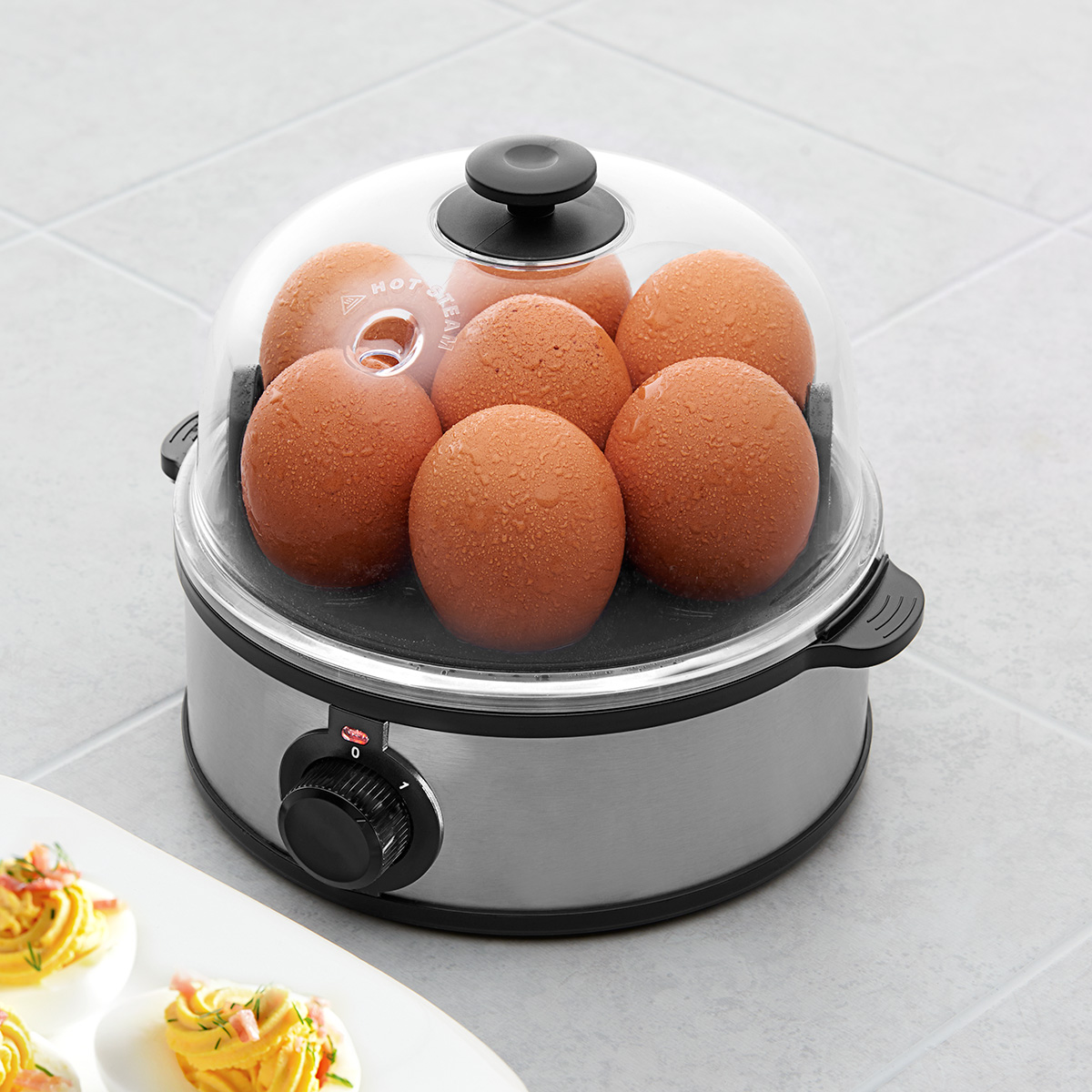
![KatieJnyc Girls` Tristan Cropped Tee - Big Kid - White - [M]](https://thedimensionofmind.com/images/14625100_fpx.webp)
![perfectwhitetee V Neck Blondie Tank - White - [M]](https://thedimensionofmind.com/images/prfct300101c925_1715611229620_2-0._QL90_UX846_.jpg)
![Cotton Candy Maker - Red - [11.5 In X 11.5 In X 11 In]](https://thedimensionofmind.com/images/Cotton-Candy-Maker-Red-115-50495.jpeg)
